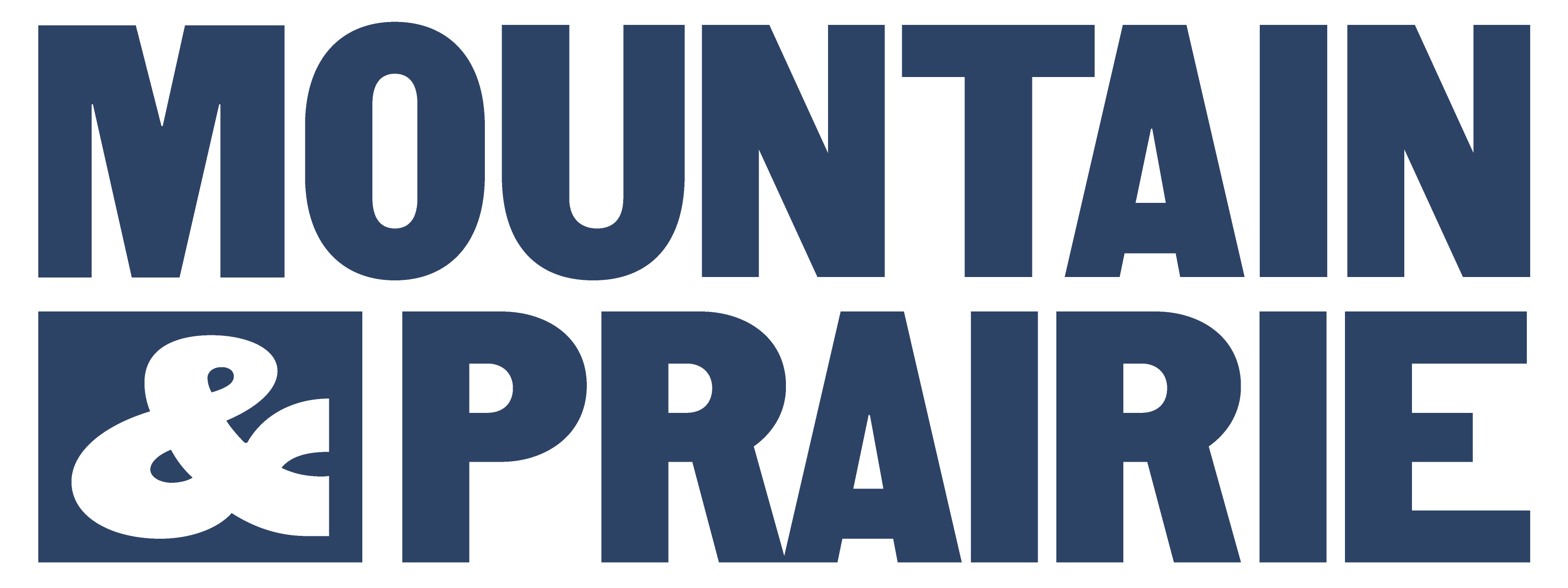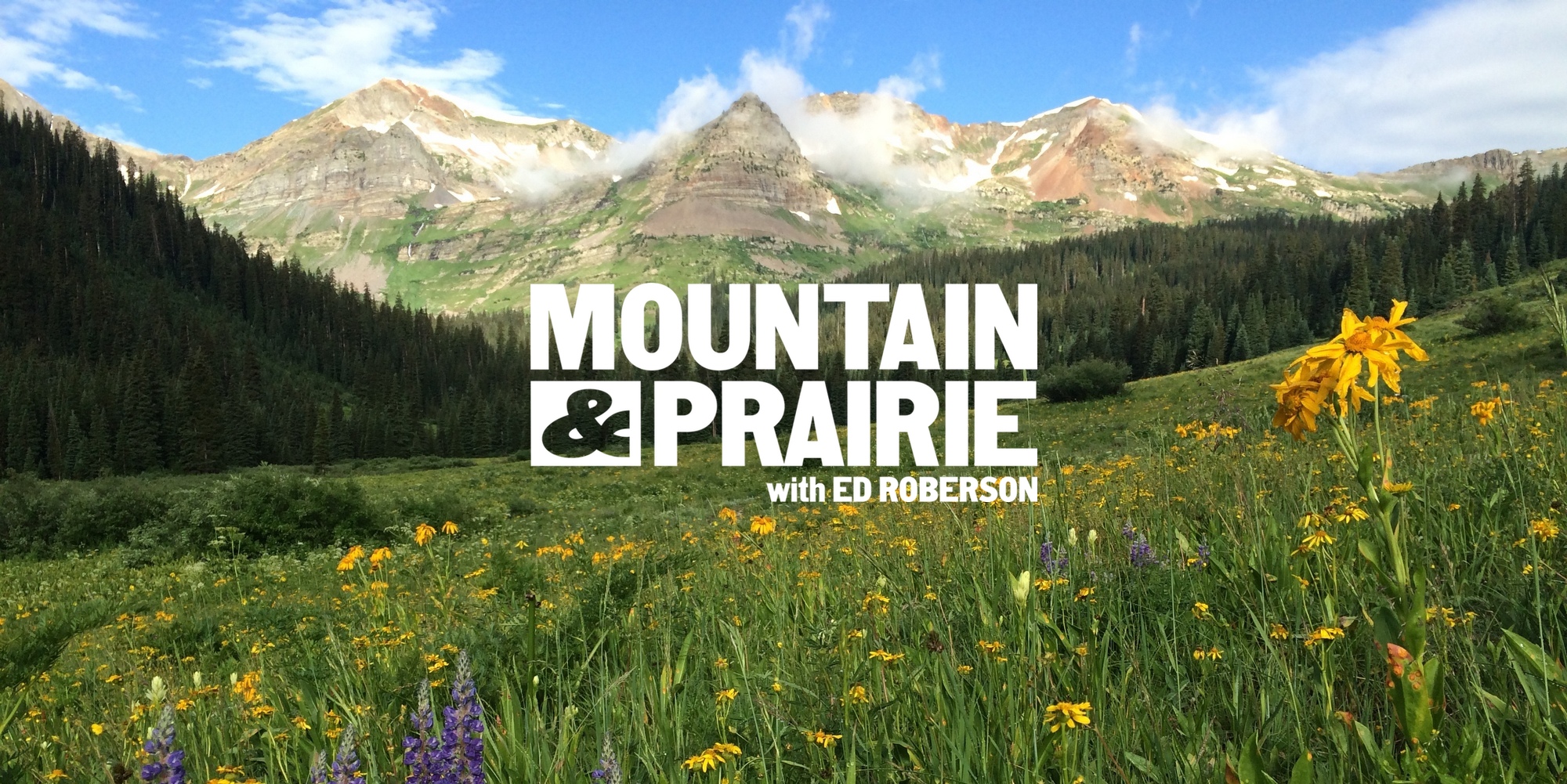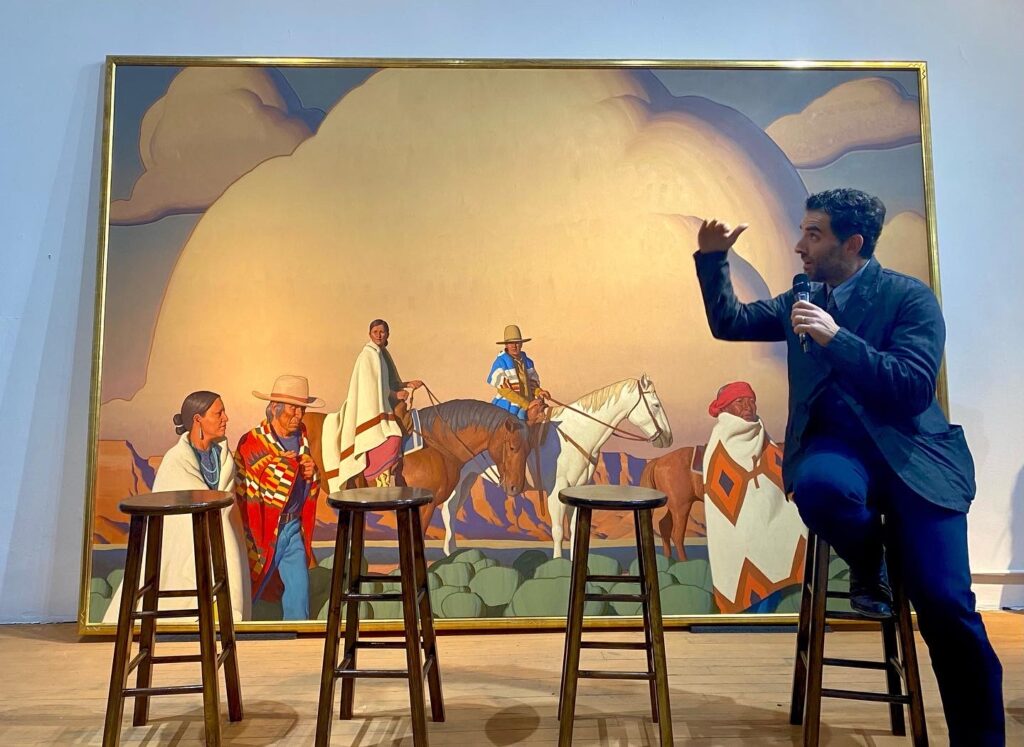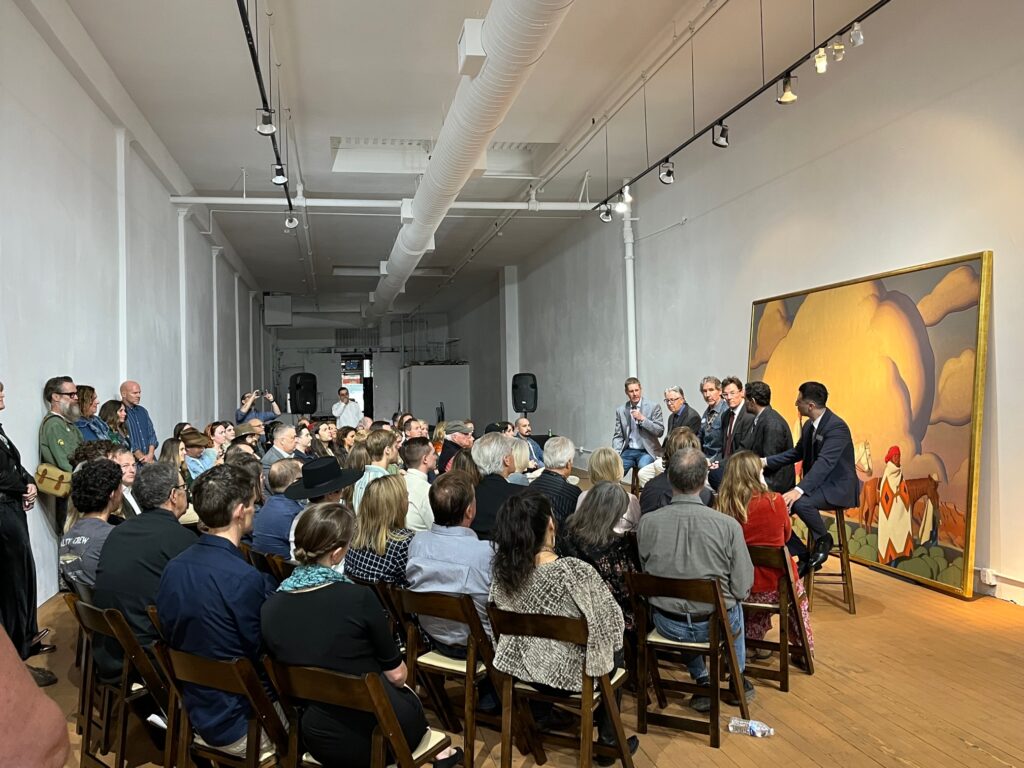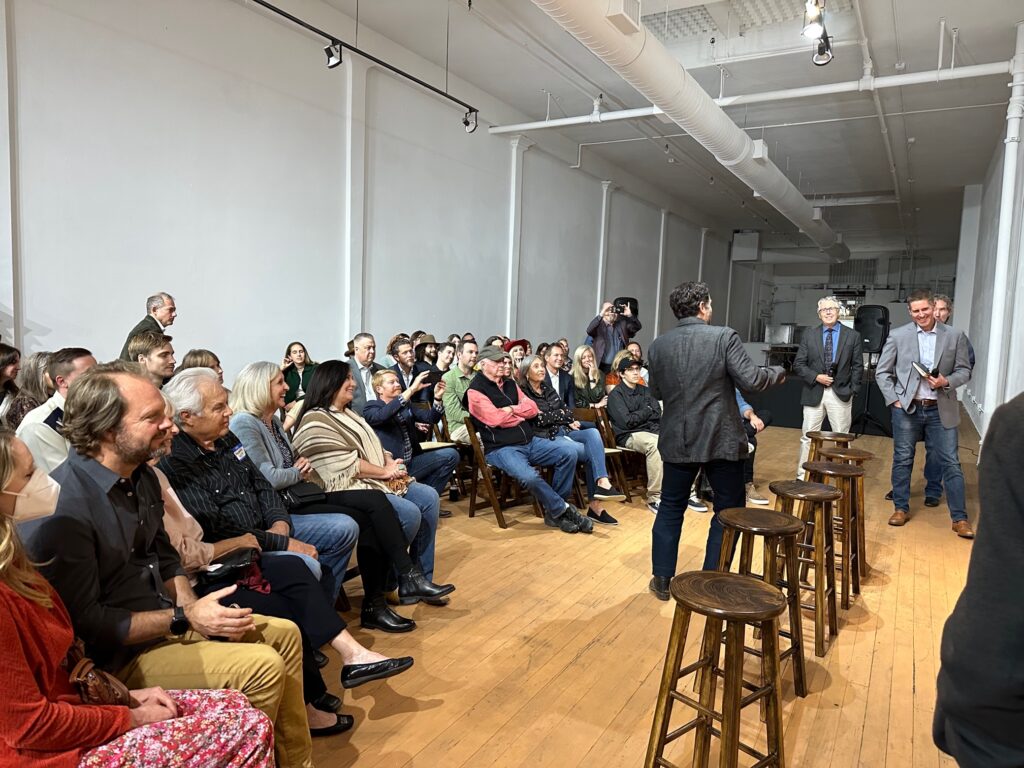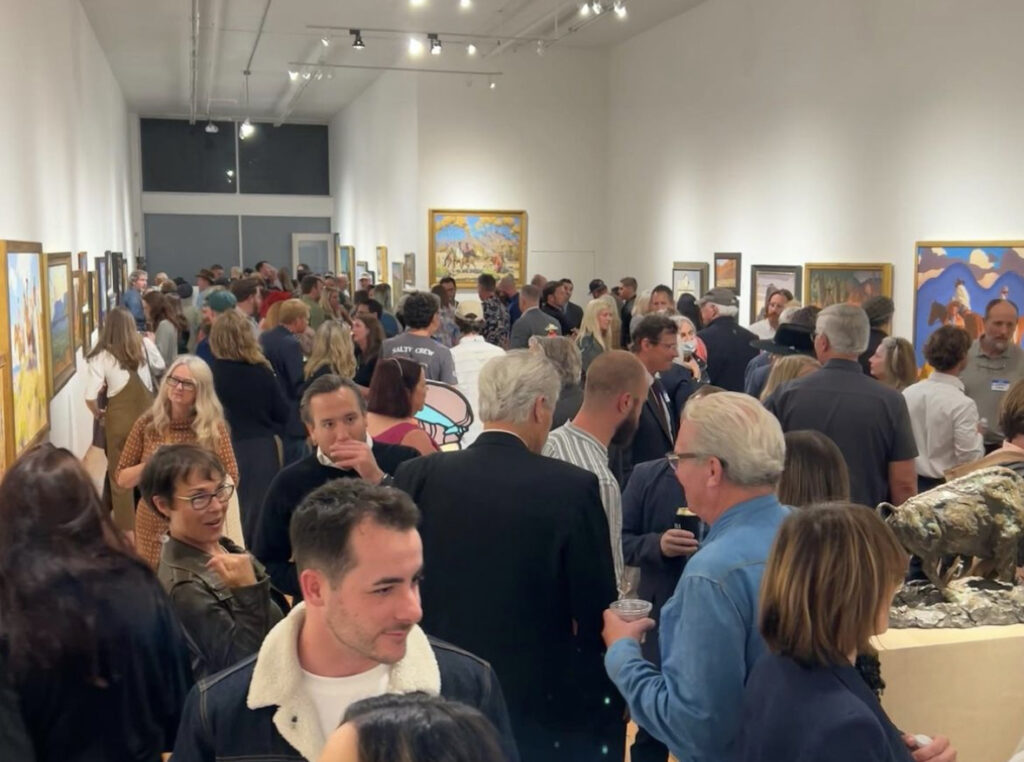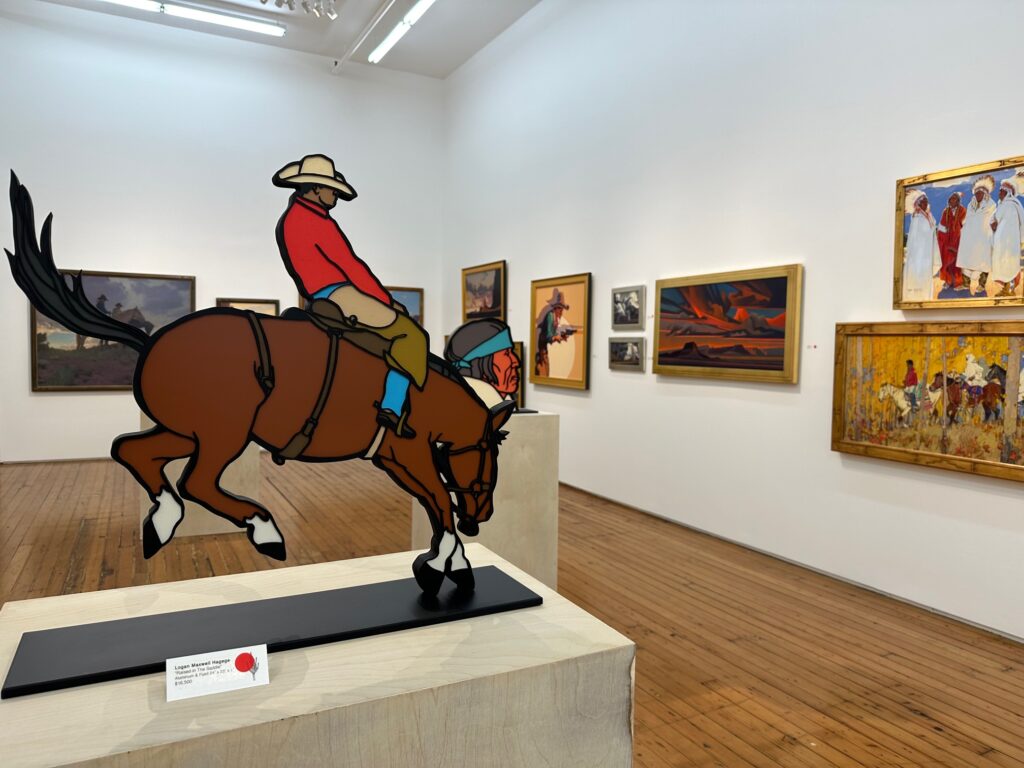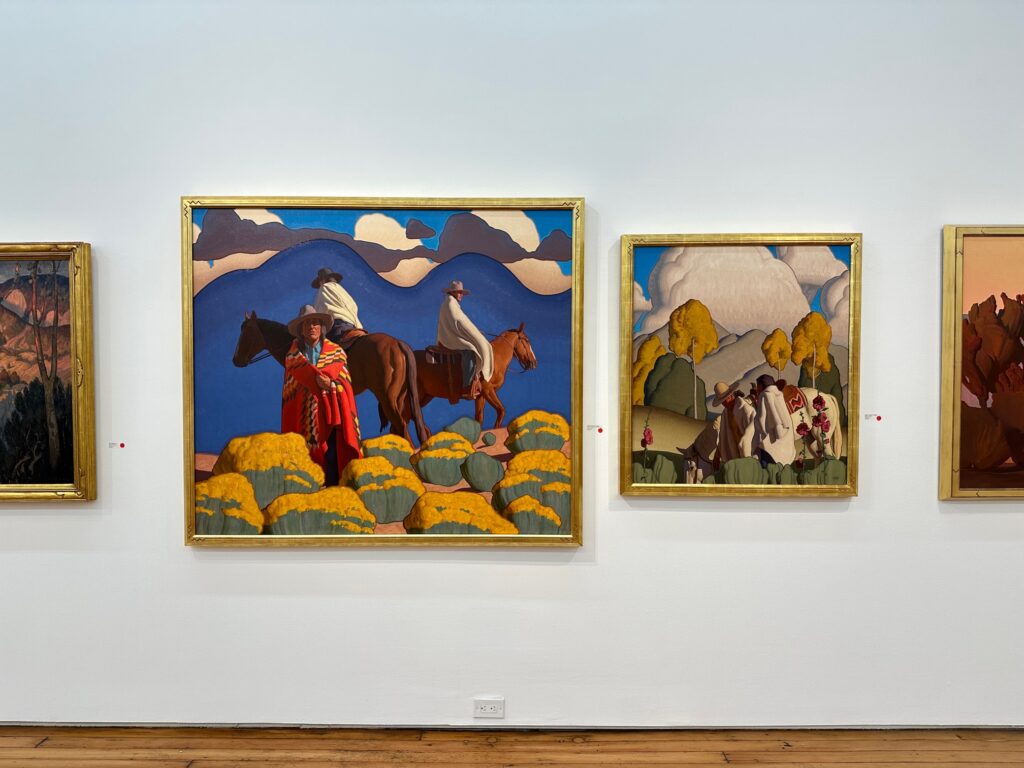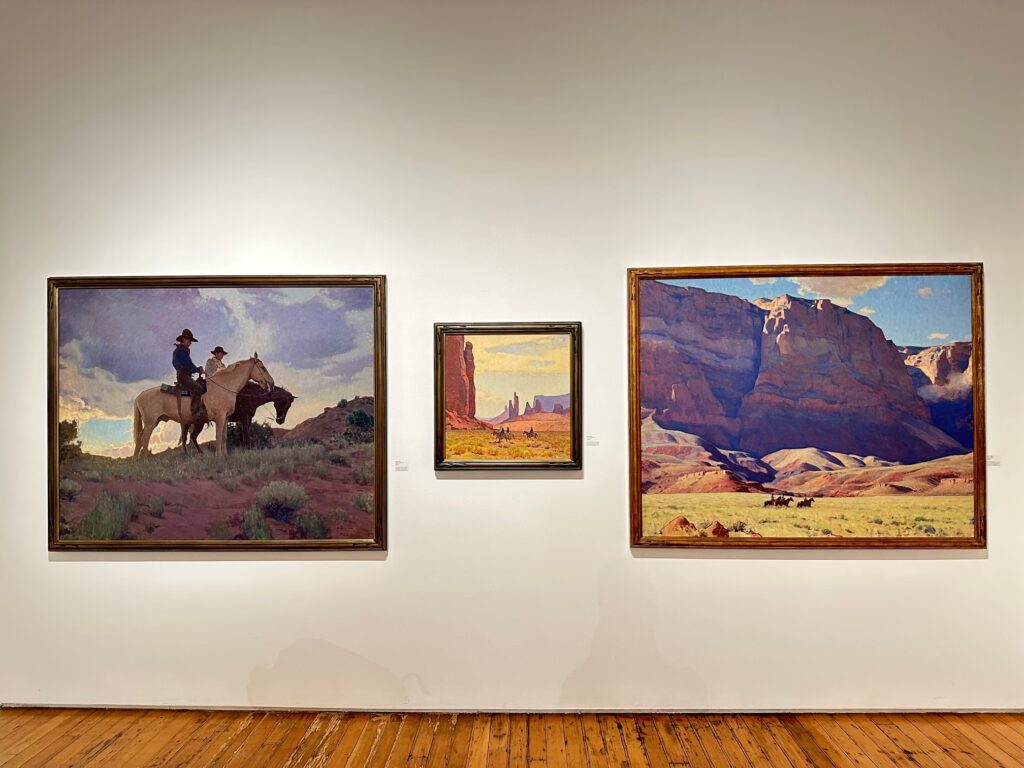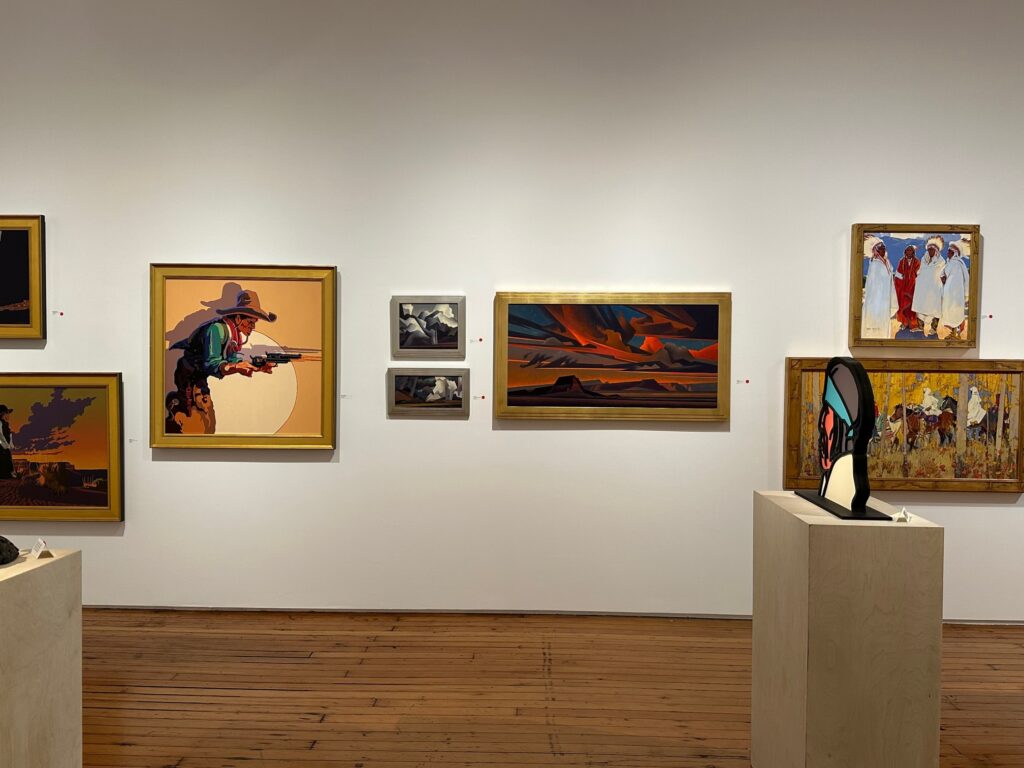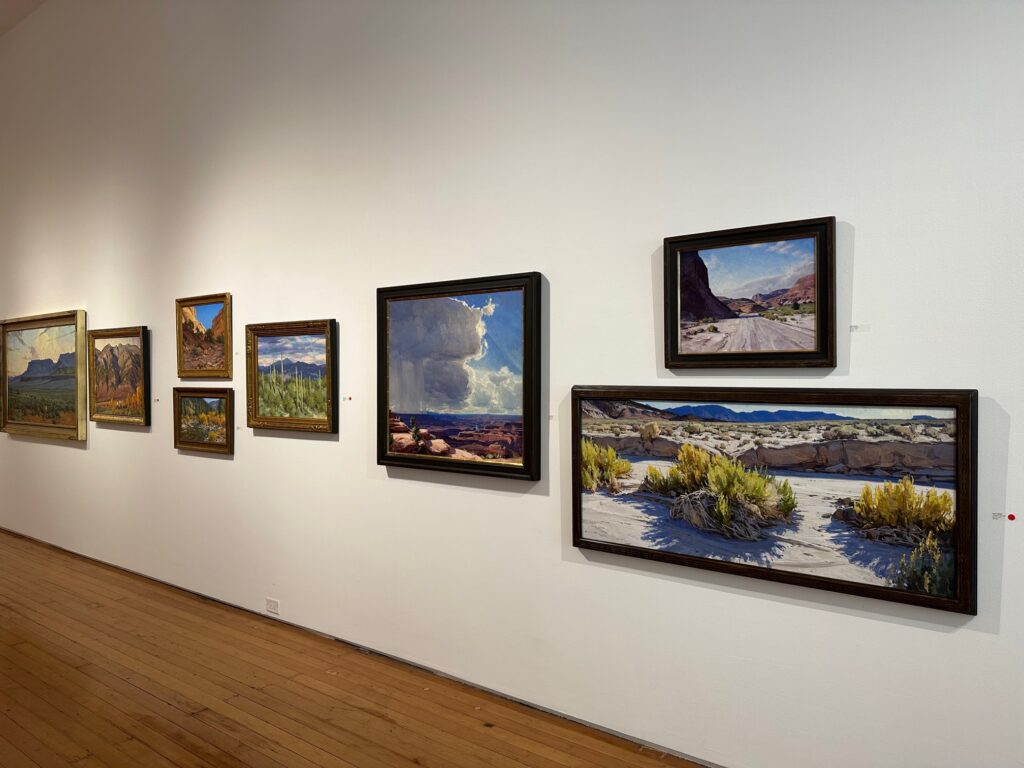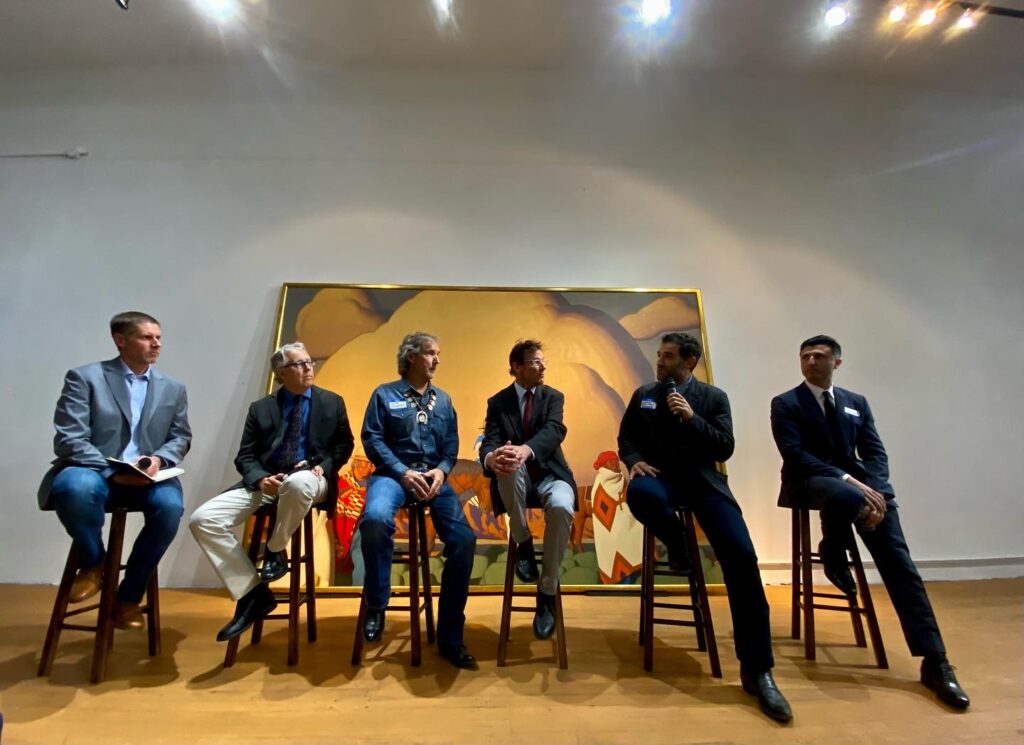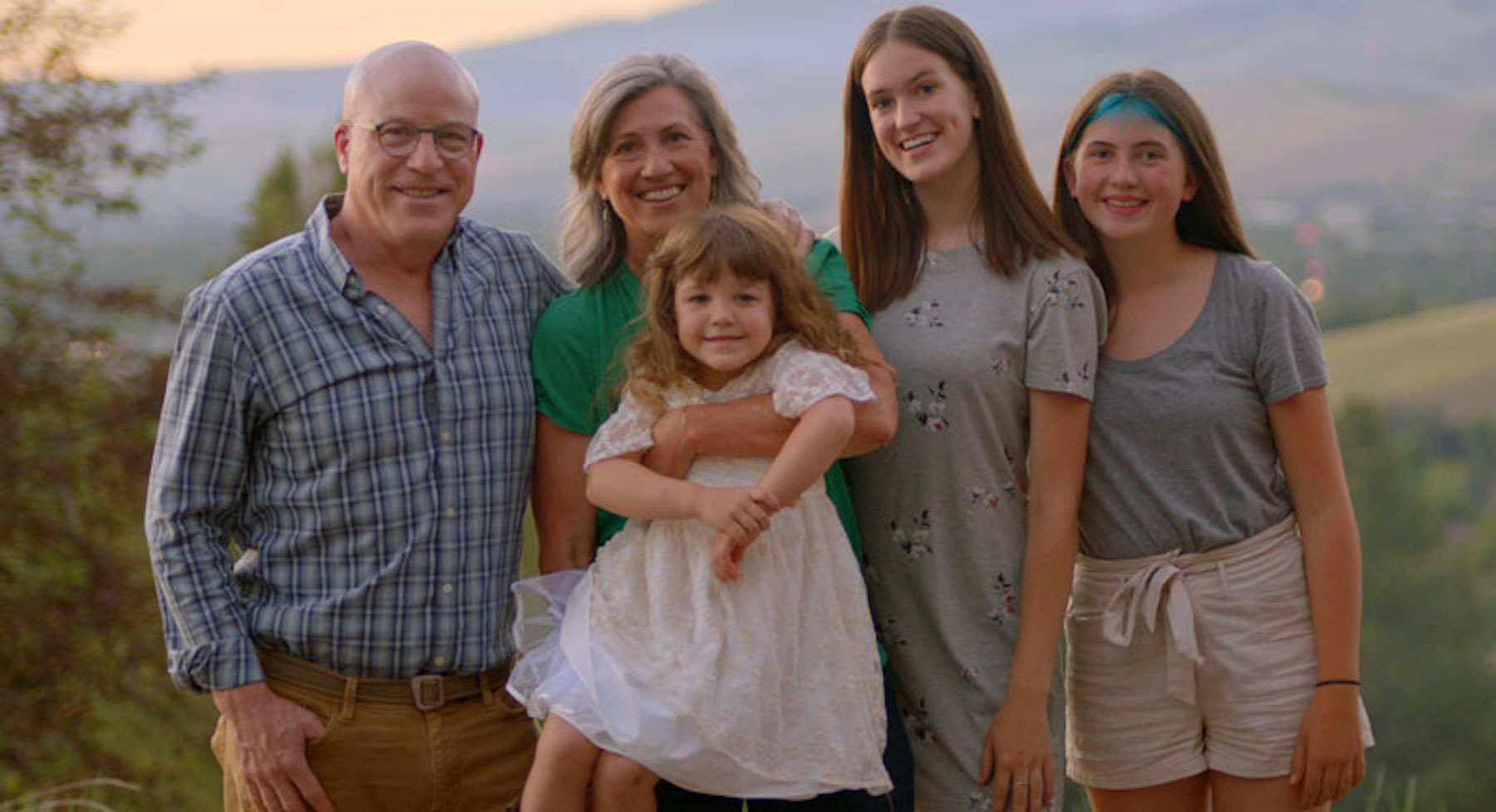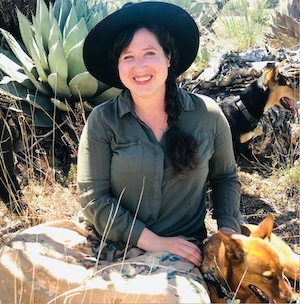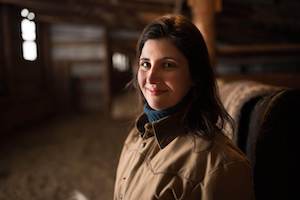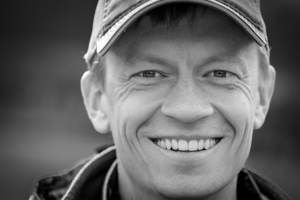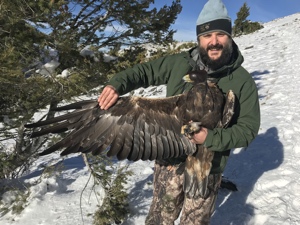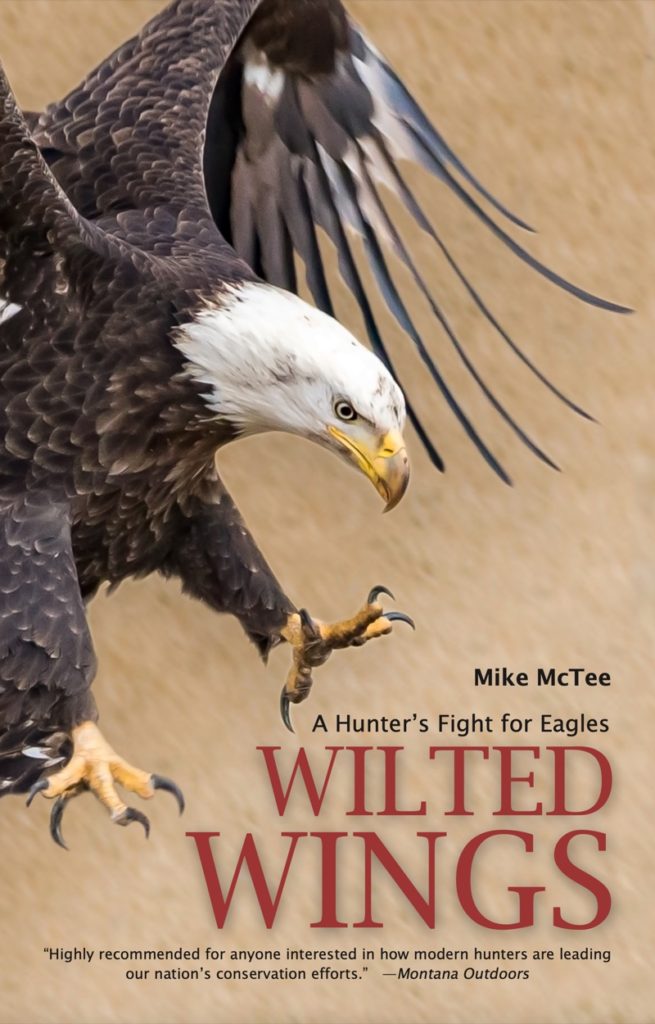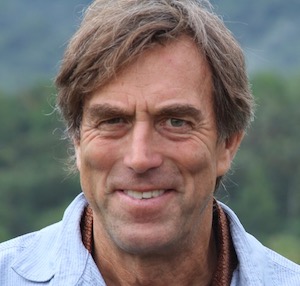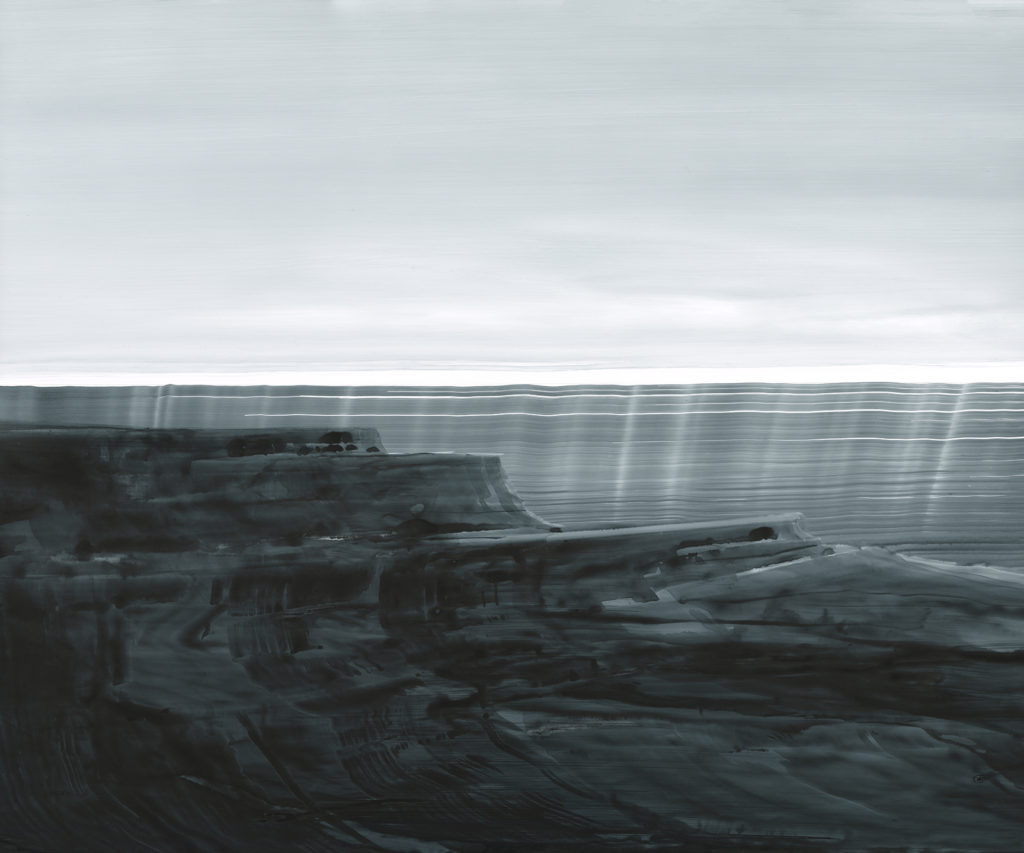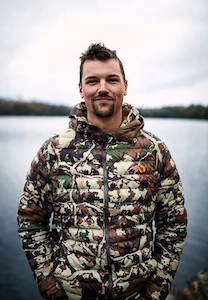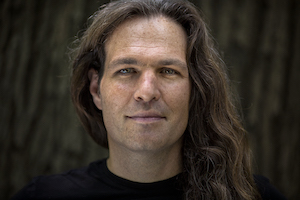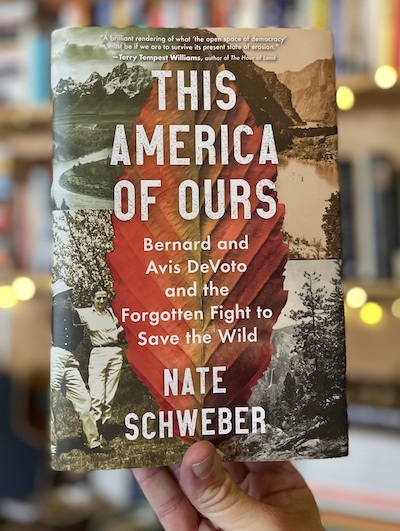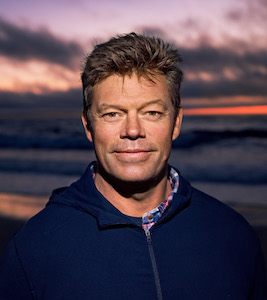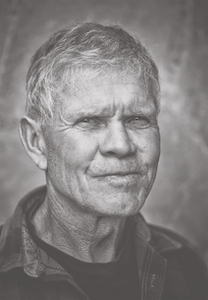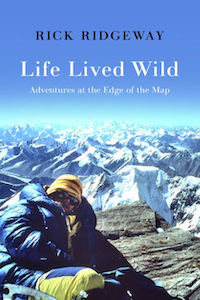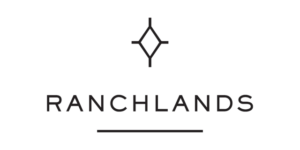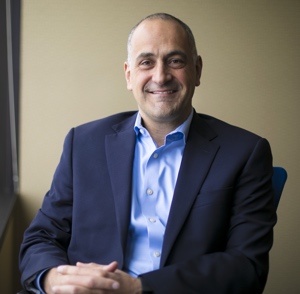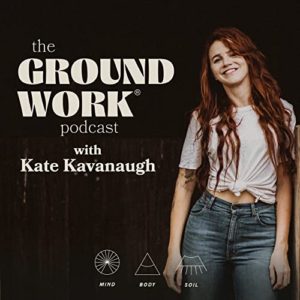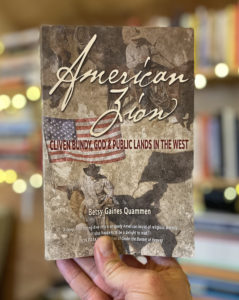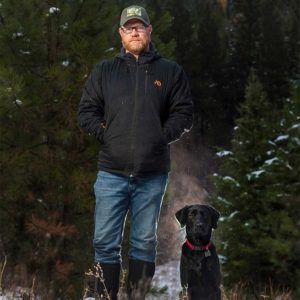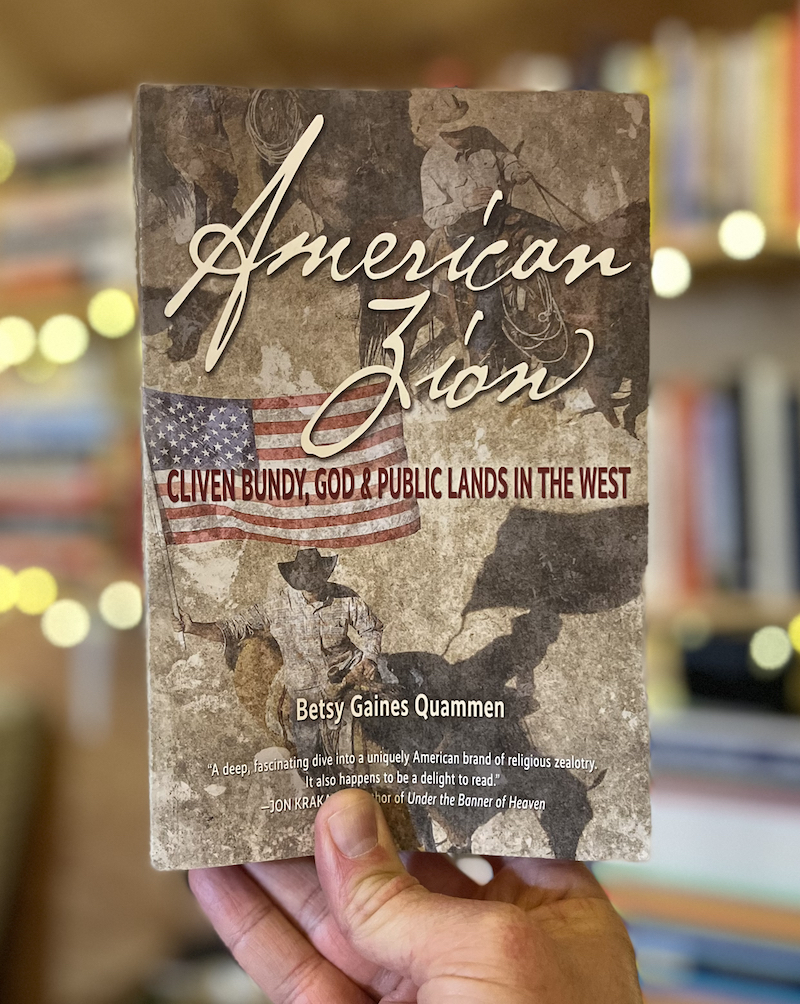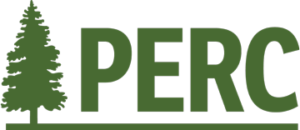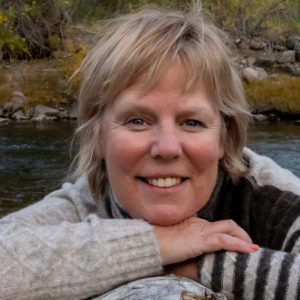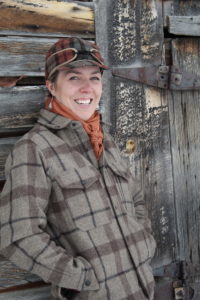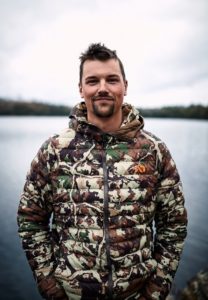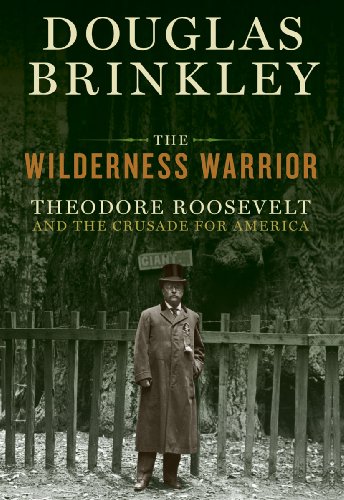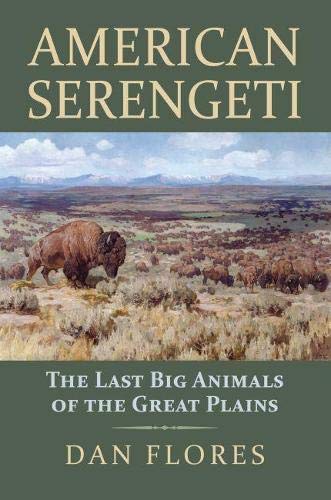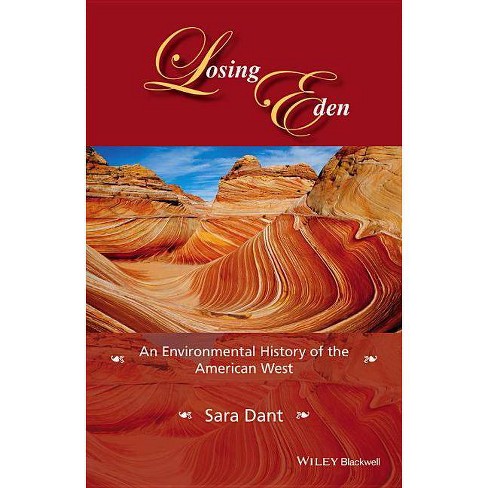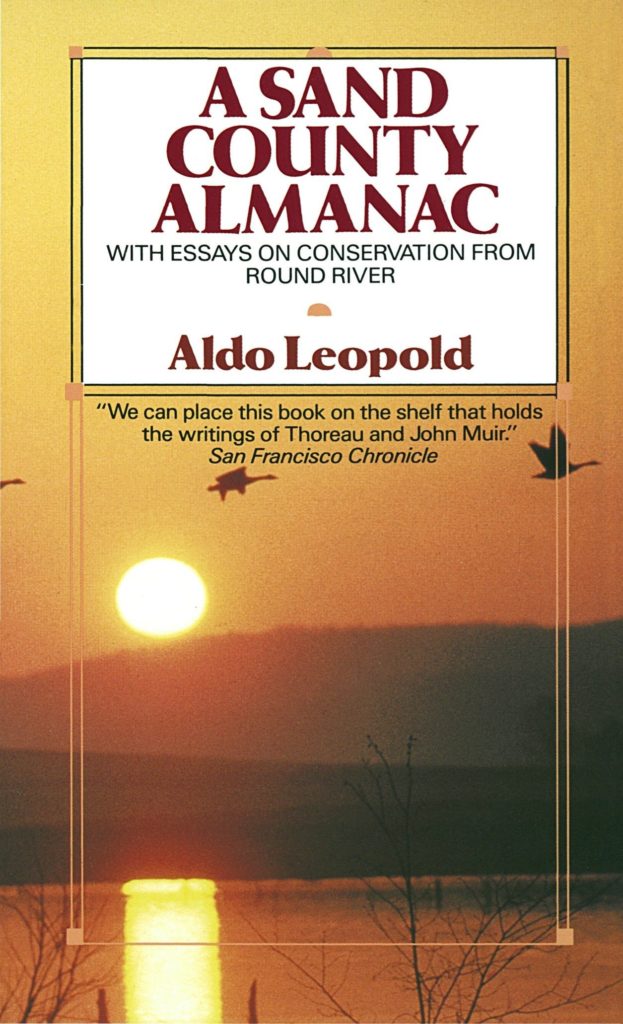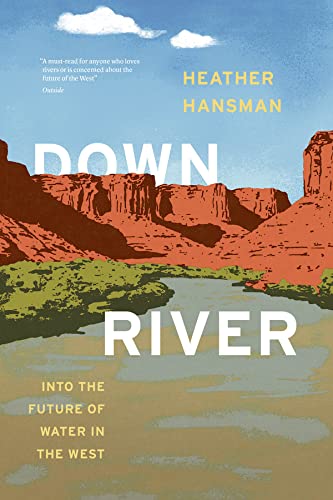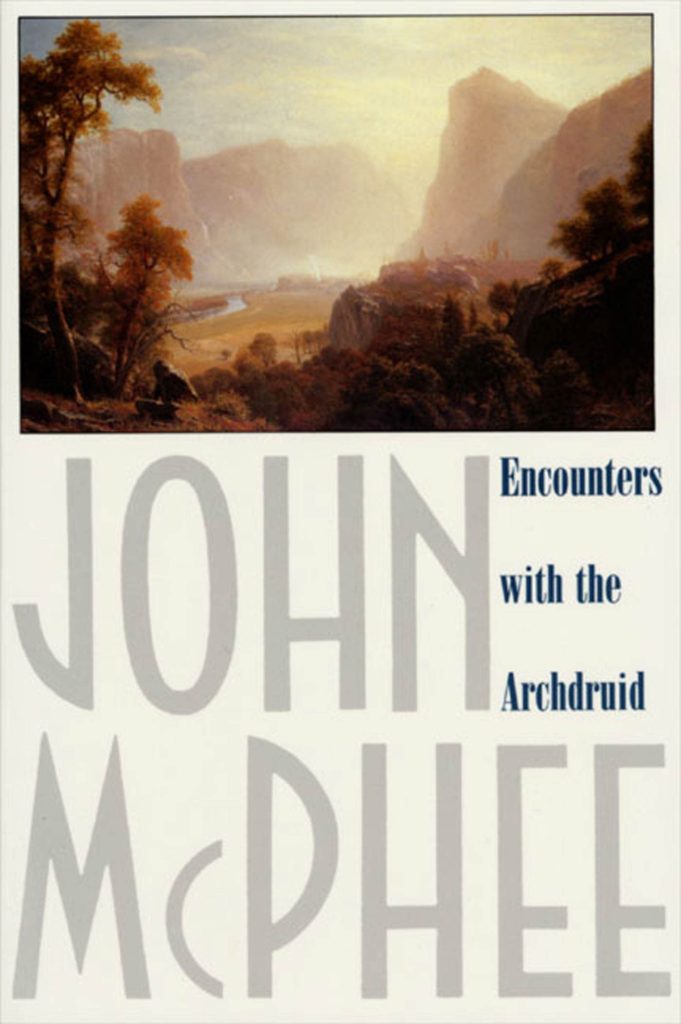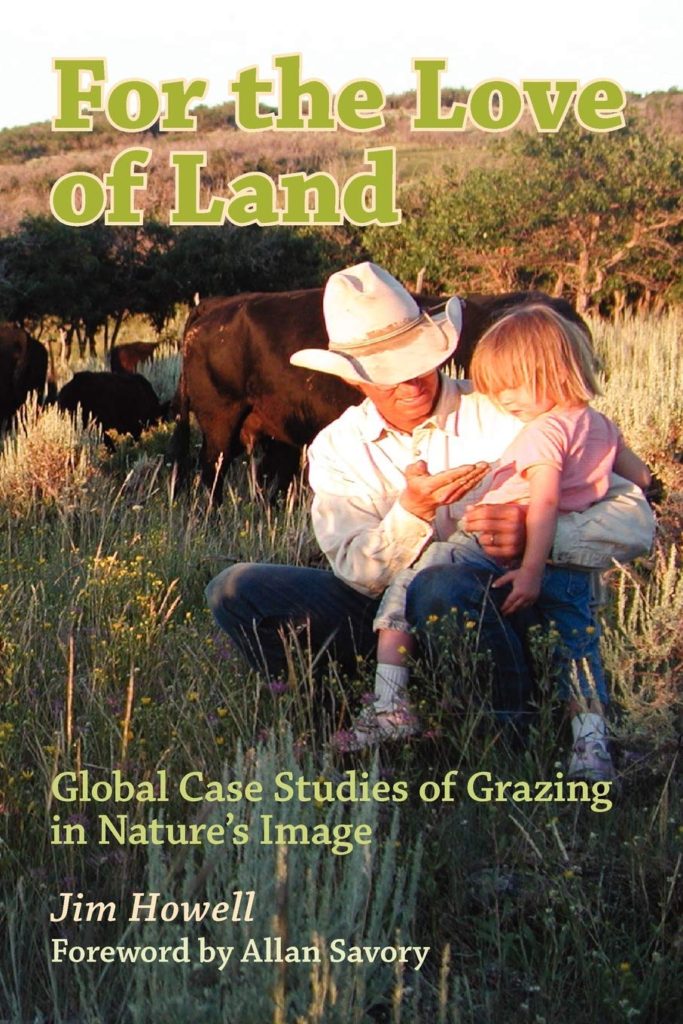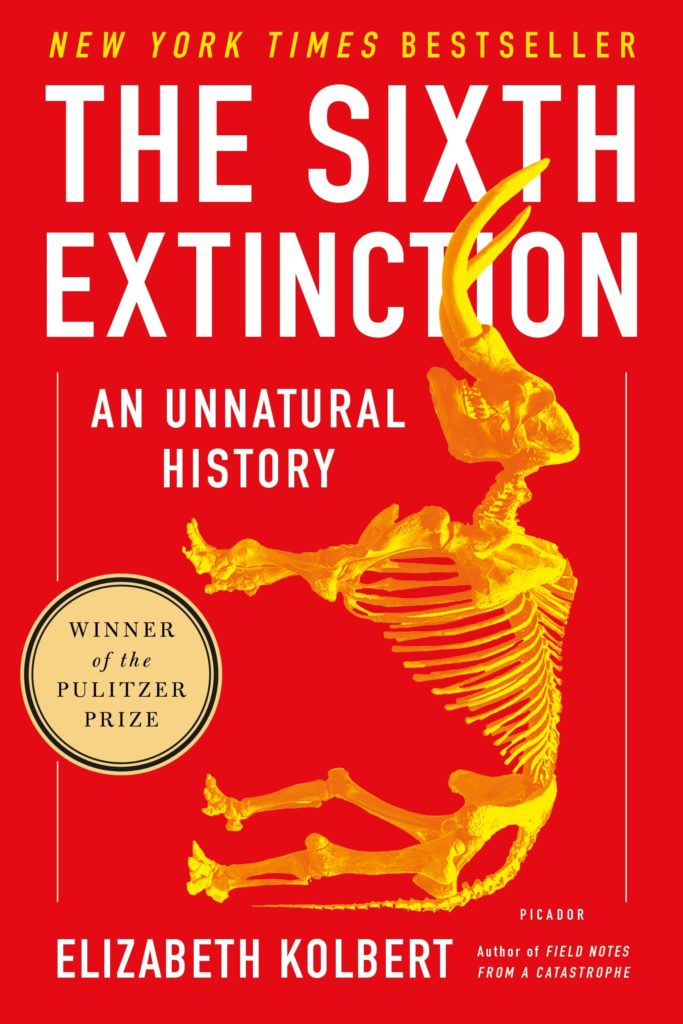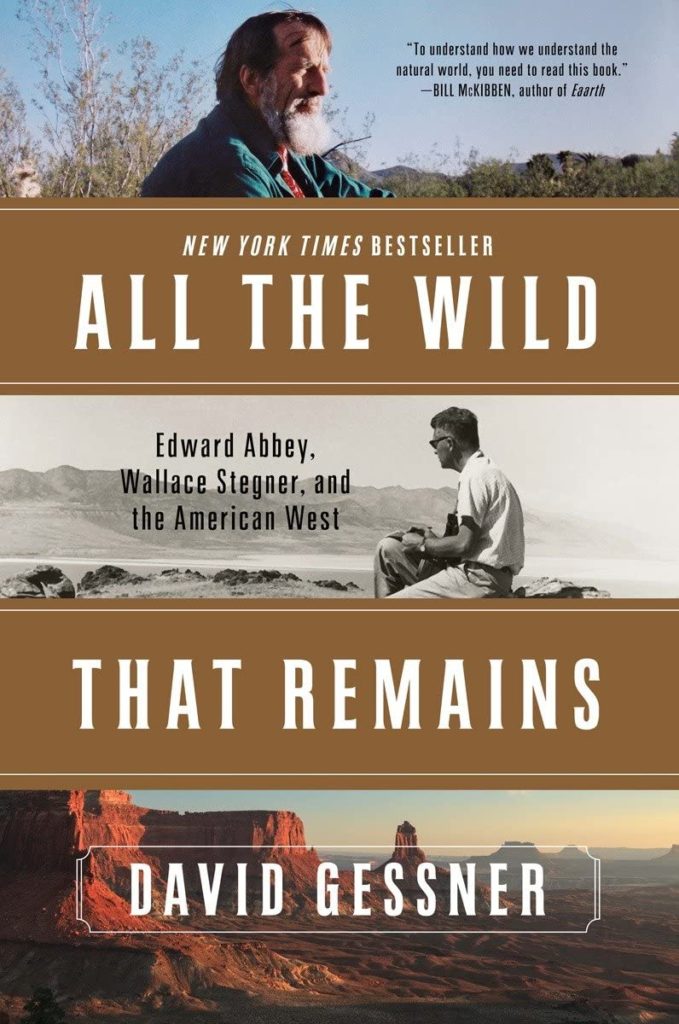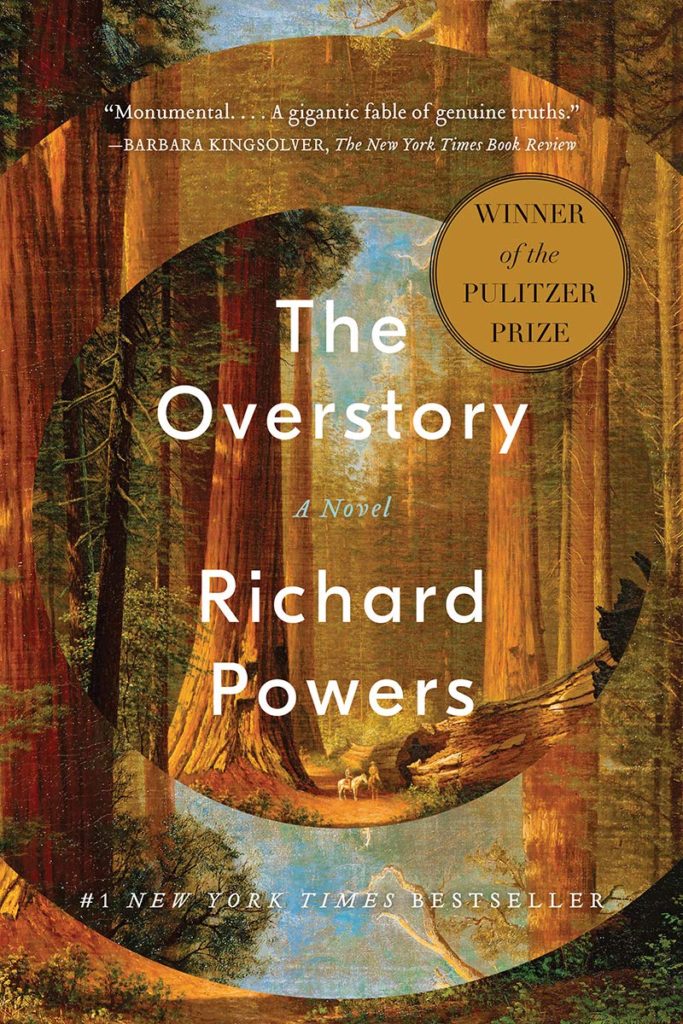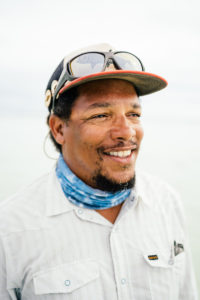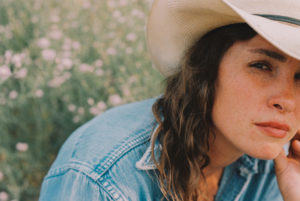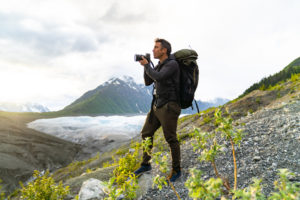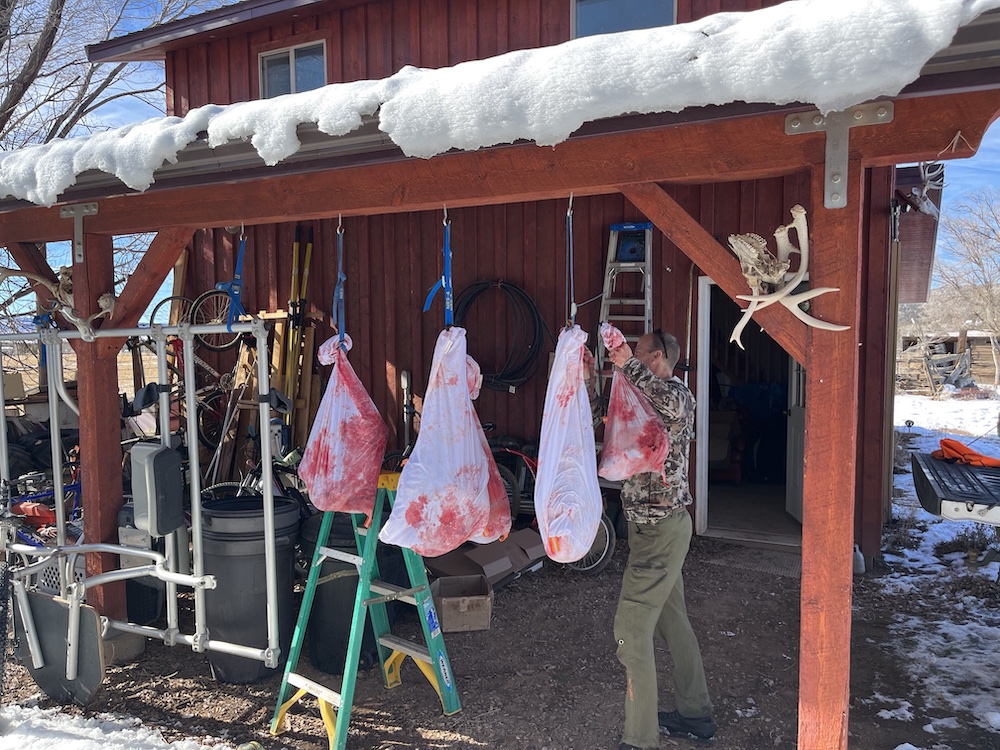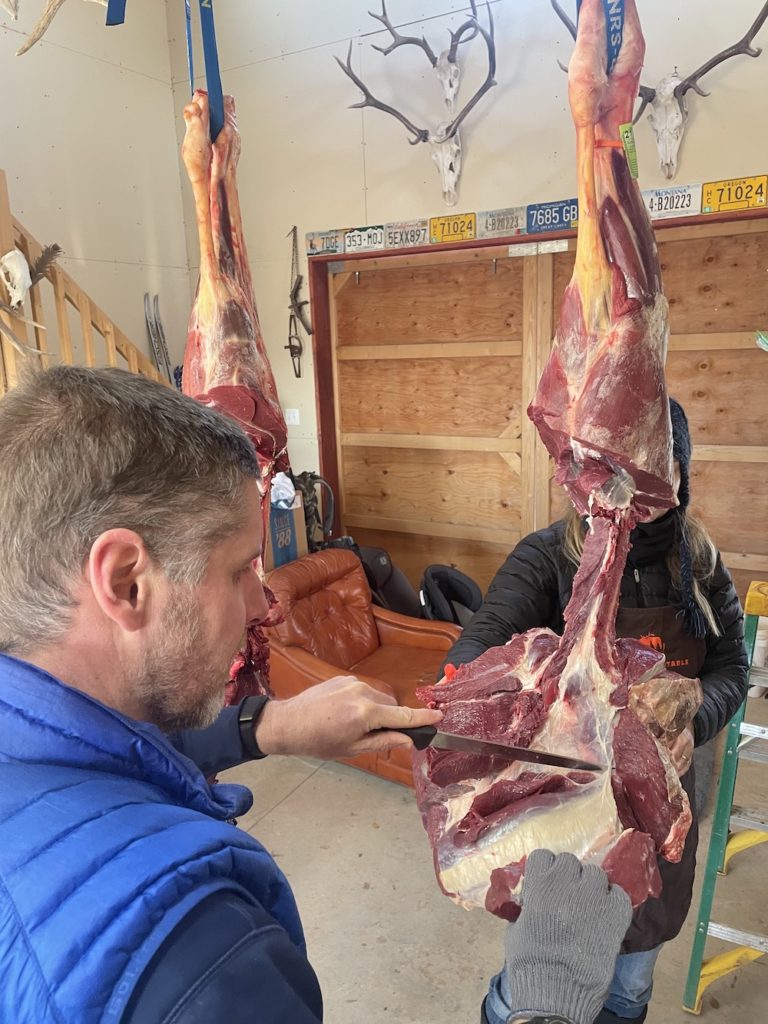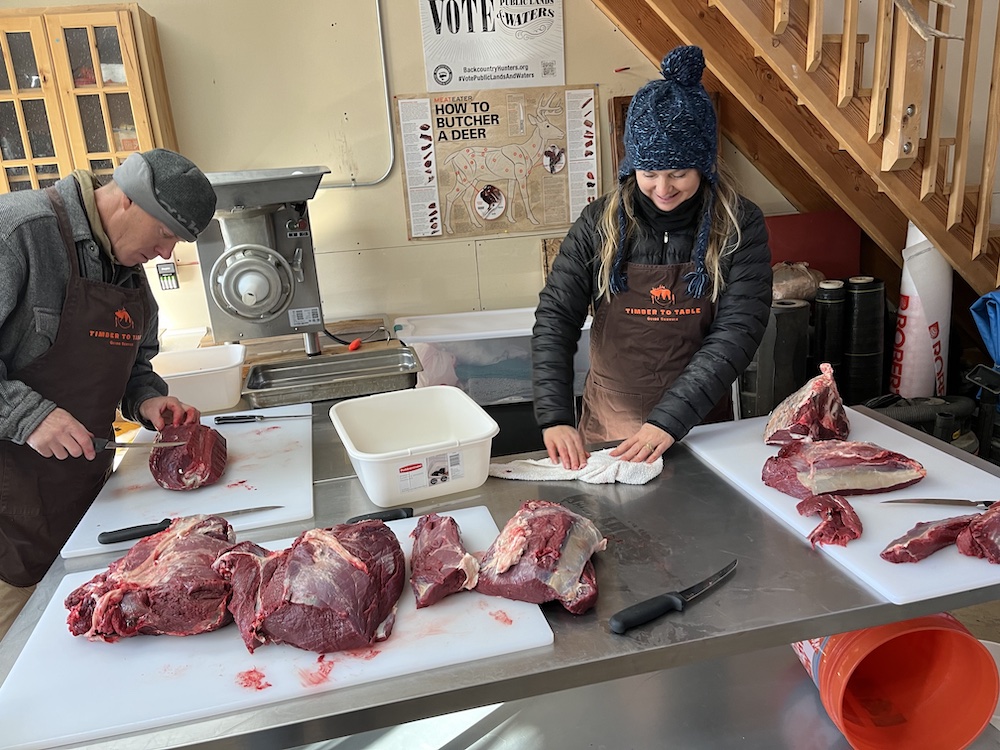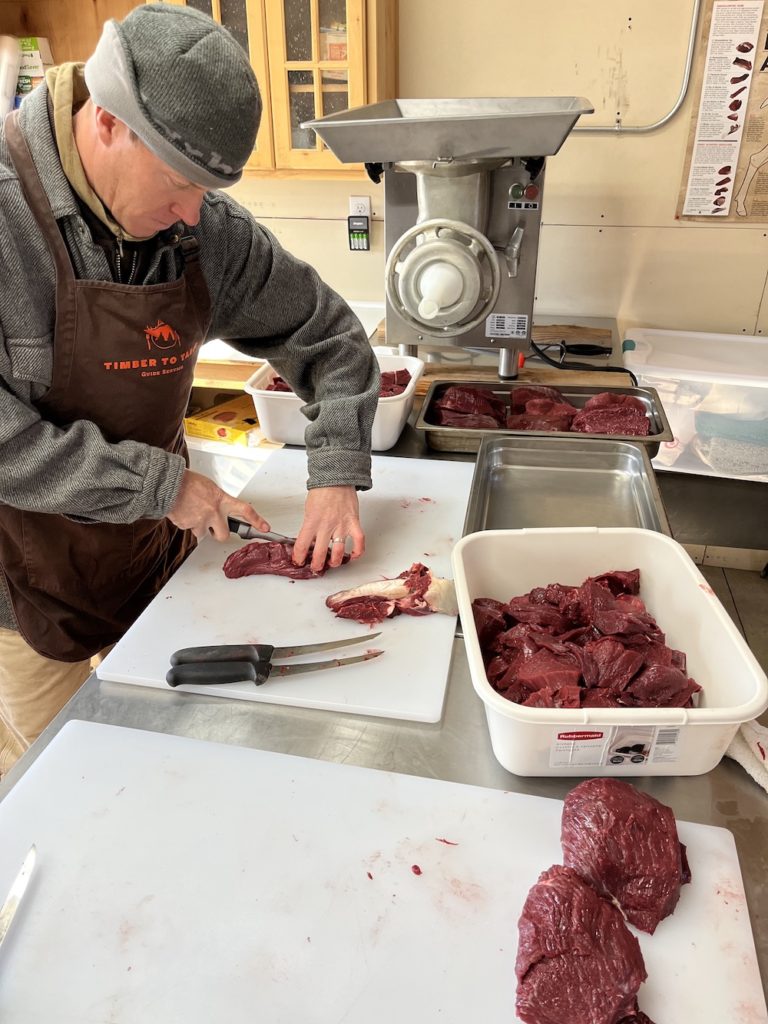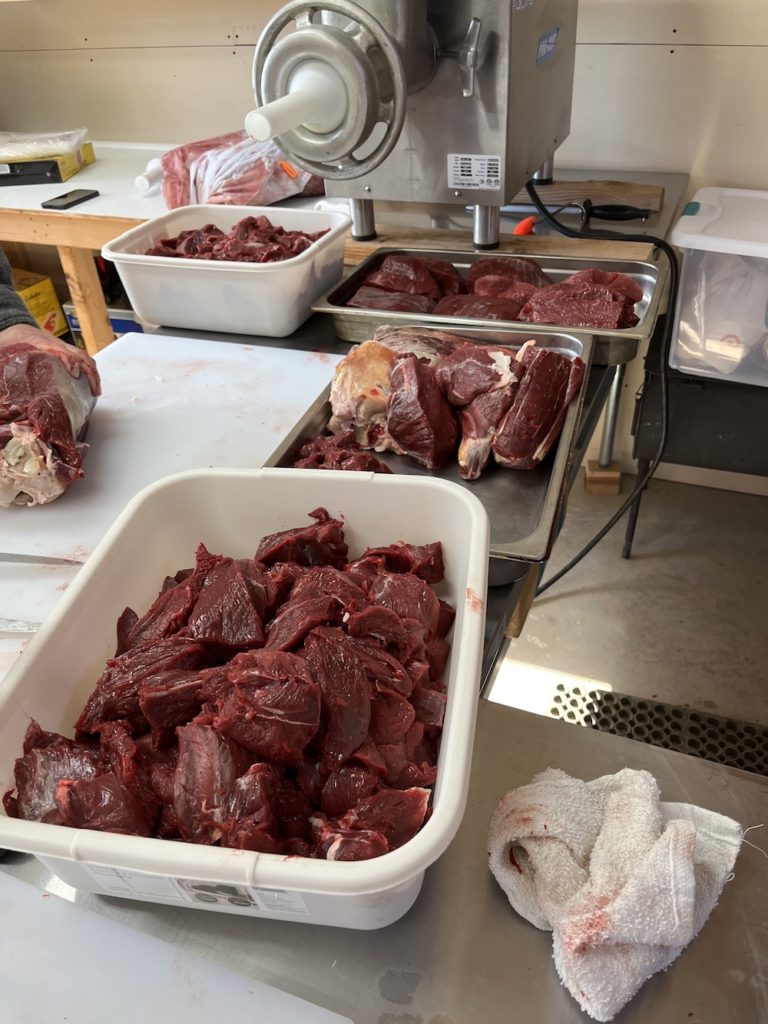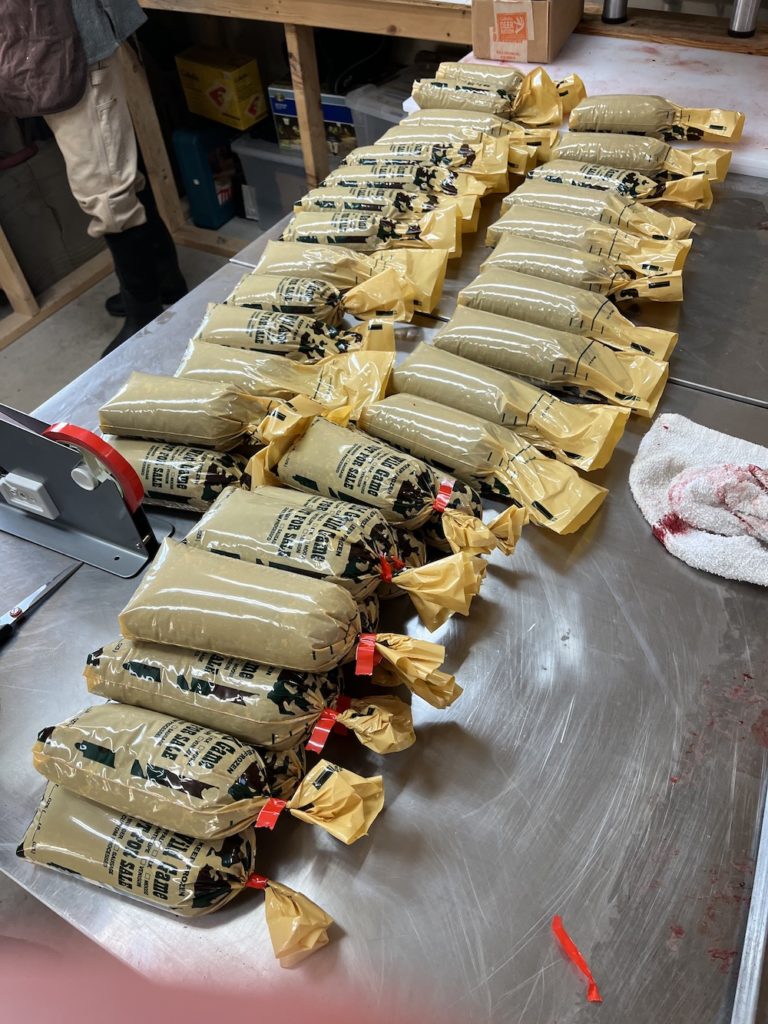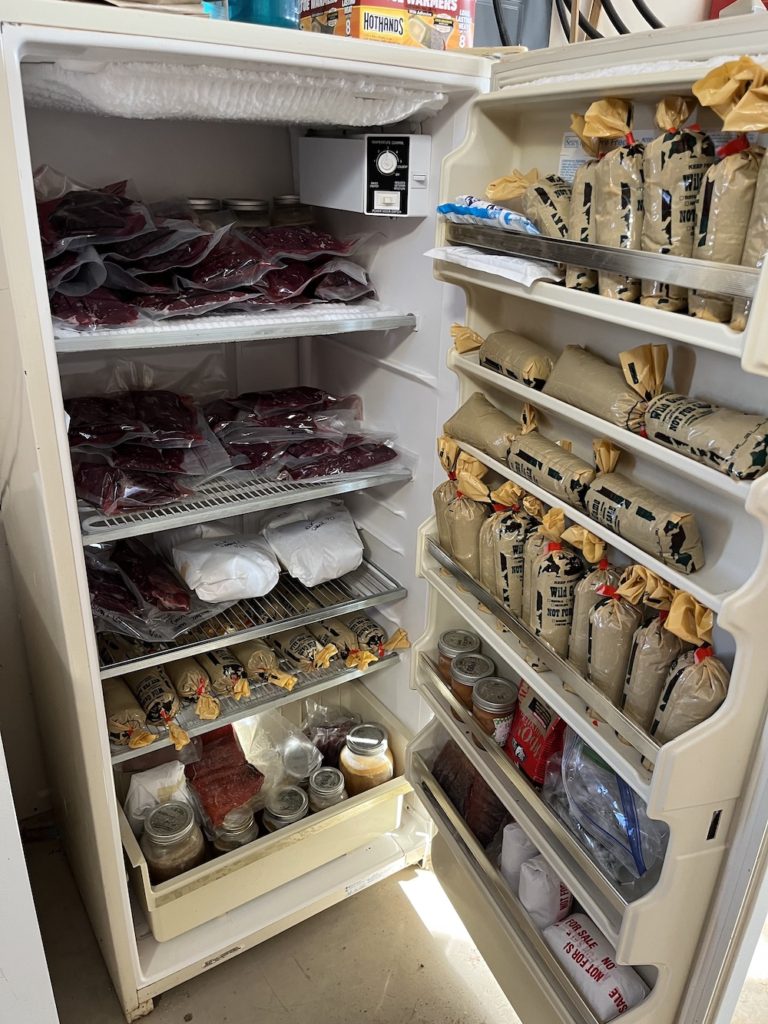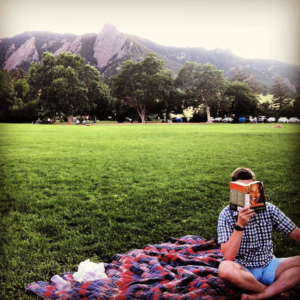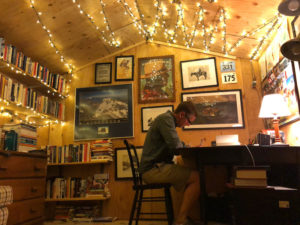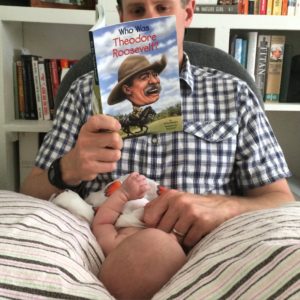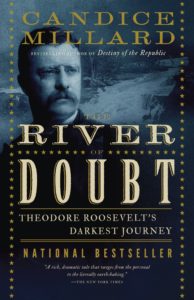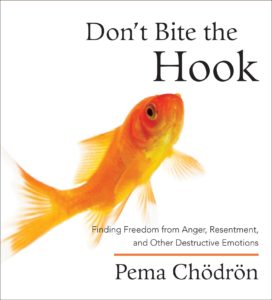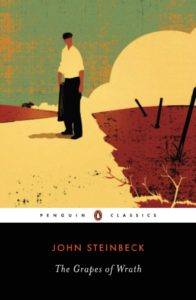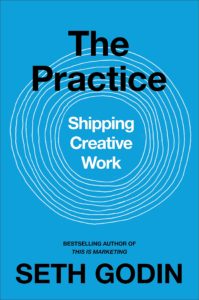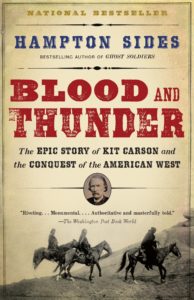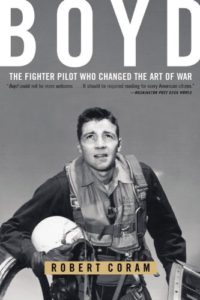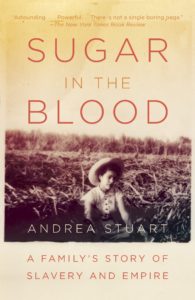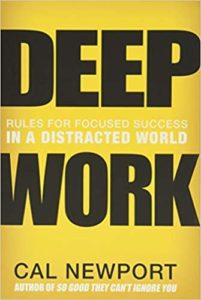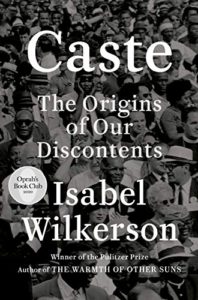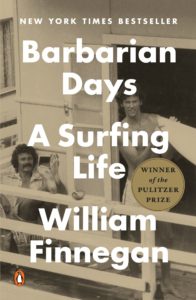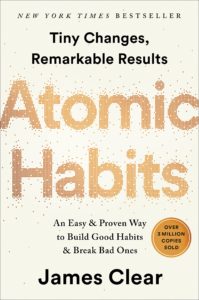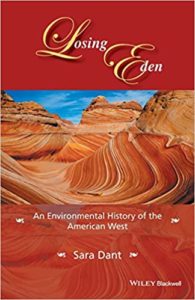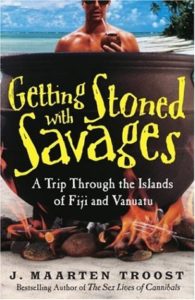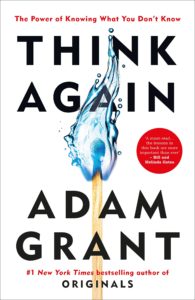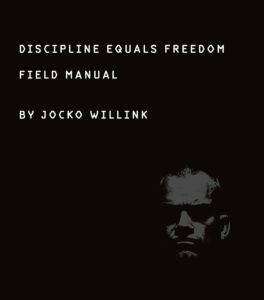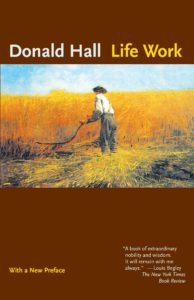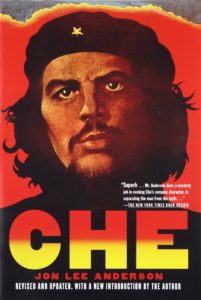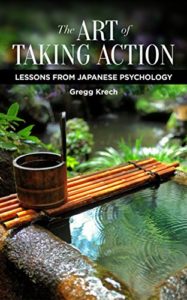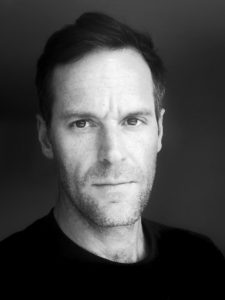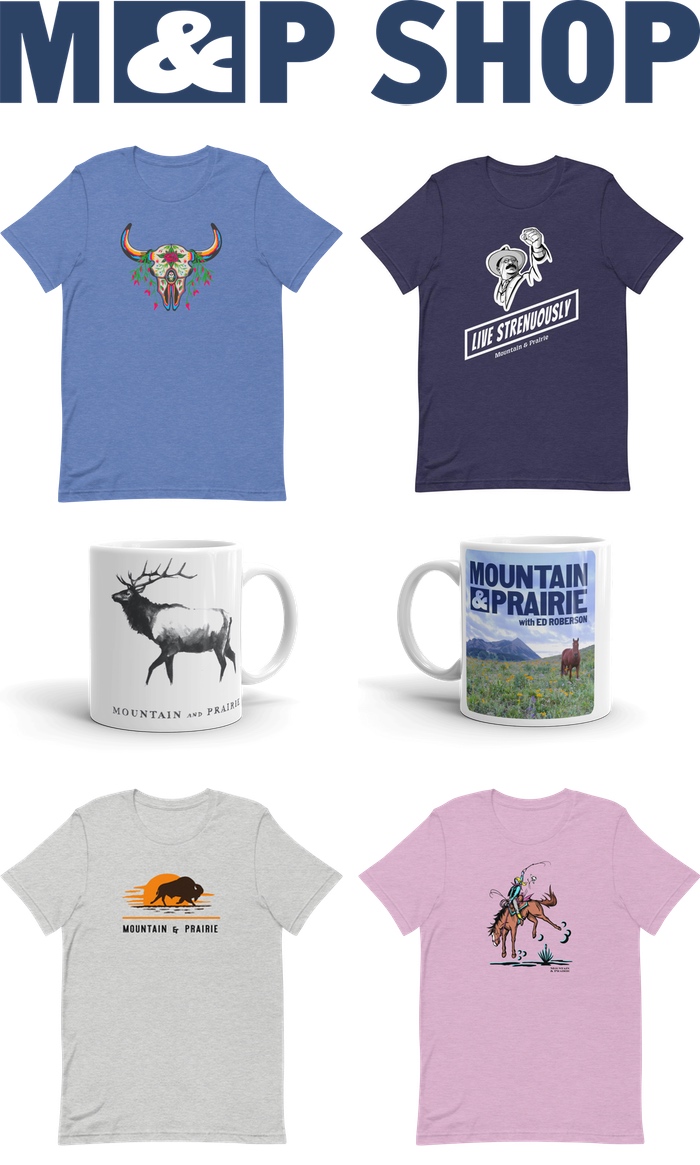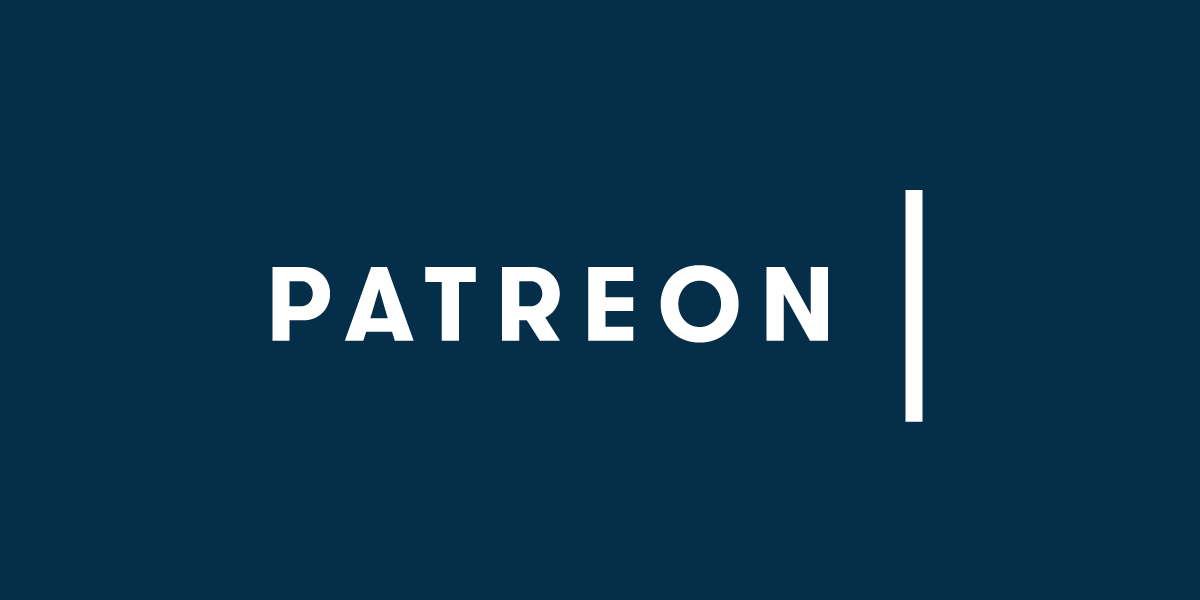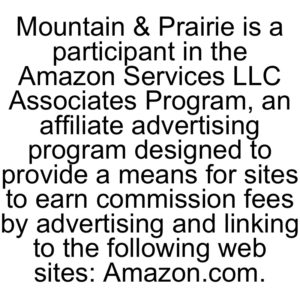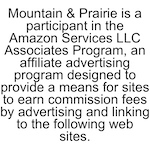Live from Maxwell Alexander Gallery
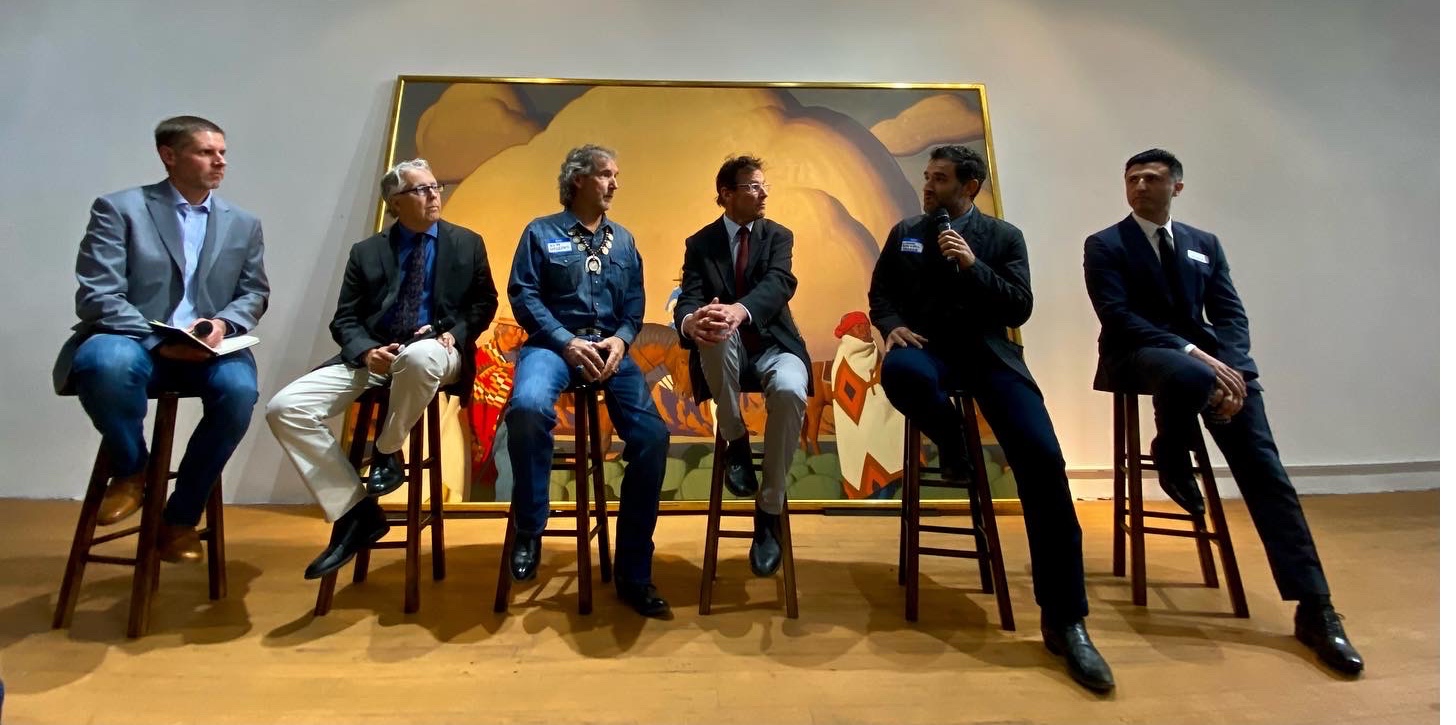
This is a special podcast episode that was recorded live in Los Angeles at Maxwell Alexander Gallery’s 10 Year Anniversary Exhibition. Maxwell Alexander Gallery was founded back in 2012, when brothers Beau Alexander and Logan Maxwell Hagege decided to start an artist-focused gallery that spotlighted the West’s most cutting-edge art. What started with a crazy idea, a small space, and a few artists has evolved into one of the most well-known galleries in the West– a gallery that celebrates the many complex facets of the American West through paintings and sculpture.
This is a recording of an artist panel discussion that was held on Saturday evening, just before the public exhibition began. The panel includes both Beau and Logan, as well as renowned western artists Kim Wiggins, Eric Bowman, and T. Allen Lawson, who goes by Tim. We recorded this conversation in a space next door to the gallery, and we quickly filled all of the chairs and it became a standing-room-only event. The six of us sat on stools in front of Logan’s 8’x12′ painting titled “The Song at Sunset,” which Logan discusses during the panel. If you’d like to see an image of this massive work of art, there’s a link in the episode notes.
Over the course of an hour, the six of us had a wonderful conversation that covered a wide range of topics, everything from the founding of the Maxwell Alexander Gallery all the way to expectations about the future of the Western art markets. Tim speaks about how he used to go out looking for scenes to paint, but now he patiently waits for the “paintings to come to [him].” Kim talks about his unique upbringing in New Mexico and how professional art captured him from an early age. Eric discussed how he treats each of his paintings as an “open-ended story” so as to draw the viewer deeper into the work. And those are just a few of the many topics we discussed. Check out the notes below for a full list of topics.
And if you leave this episode wanting to hear more from these artists, don’t worry– I’ve convinced them all to join me for their own episodes in the coming months. And you can always go back and listen to my first episode with Logan.
A huge thank you to Beau and Logan for inviting me to this one-of-a-kind event, and a thank you to all of the artists for being such fun, welcoming, and fascinating people who contribute so much to the culture of the American West. I was honored to be included, and I hope you enjoy this conversation as much as I did.
All photos courtesy of Maxwell Alexander Gallery
LISTEN & DOWNLOAD:
Apple Podcasts
Spotify
Google Podcasts
Overcast
… or wherever you get your podcasts!
—
RESOURCES:
Topics Discussed:
- 3:15 – Introductions
- 4:40 – Ed starts the questions
- 5:30 – Logan talks about starting up the Maxwell Alexander Gallery and why they were interested in doing so
- 7:45 – Beau talks about the biggest surprises he experienced in starting the gallery
- 10:30 – Beau and Logan discuss how they evaluate which artists are a good fit for their gallery
- 13:30 – Tim discusses his process of letting “paintings come to me”
- 16:00 – Tim talks about balancing (or not balancing) making art that he knows will sell with trying new forms of art
- 17:30 – Kim talks about becoming an artist
- 22:30 – Eric discusses how he makes his paintings “open-ended [stories]”
- 25:30 – Eric talks about how the American West captured his imagination
- 27:45 – Beau discusses his process of encouraging artists that he works with without over-influencing them
- 29:45 – Logan discusses his large work of art positioned behind the panel (name?)
- 32:15 – Beau discusses Logan’s painting
- 34:00 – The panel talks about the responsibility they feel to understand the history of the places they represent in their art
- 40:15 – Eric discusses why he believes that making art should never be easy
- 42:15 – Beau talks about the business of art, how it was impacted by COVID-19, and what he is thinking about as predictions of a recession circulate
- 47:00 – Audience question: How does the panel compose their color harmonies, especially Logan on such large paintings?
- 52:30 – Audience question: Discuss the effect of the 2021 Maxwell Alexander artist’s retreat
- 55:30 – Audience question: Does anyone on the panel intend to make a big shift in their style, or do they feel locked in?
- 59:45 – Tim celebrates Logan and Beau’s work at the gallery
- 1:01:00 – Logan and Beau express their appreciation for the artists
Information Referenced:
- Maxwell Alexander Gallery
- Logan Maxwell Hagege
- Beau Alexander
- T. Allen Lawson (Tim)
- Kim Wiggins
- Eric Bowman
- Culver City, CA
- Billy Shenck
- Scottsdale, AZ
- Claude Monet
- Armand Guillaumin
- Santa Fe Plaza
- American Impressionist Society
- Robert Daughters
- Walter Gonske
- Wilhelm J. Goebel
- Douglas Higgins
- St. Louis, MO
- Peter Hurd
- Henriette Wyeth
- Thomas Hart Benton
- Georgia O’Keeffe
- William Lumpkins
- New Mexico Modernism
- Alfred Morang
- Emil Bisttram
- William Lumpkins
- Charles M. Russell
- Alexandre Hogue
- Earnest L. Blumenschein
- Taos, NM
- Realism
- San Geronimo Feast Day
- Orange County, CA
- Glenn Dean
- Josh Elliott
- David McCullough
- Norton Simon Museum
- The Alamo
- Custer’s Last Stand
- Value
- Color Harmony
- Vincent van Gogh
- Rembrandt
- Brett James Smith
- What About Bob?
- Lucian Freud
Enjoy this episode? Then you might like these too:
- Frances Ashforth – Art, Water, and Wide-Open Spaces
- Pete McBride, Part 2: In Search of Silence
- Kelsey Johnson – Chasing Her Artistic Ambitions
- Anna Brones – Committed to Creativity
- Ivan McClellan – A New Look at the Old West
- Live in Bozeman!
- Morgan Irons – Finding Her Muse
- Logan Maxwell Hagege – Artistic Evolution
- Jessica Lewis – Doing More With Less
Visit the podcast page for a full list of episodes where
Francesca Claverie – A Borderlands Conservation Success Story
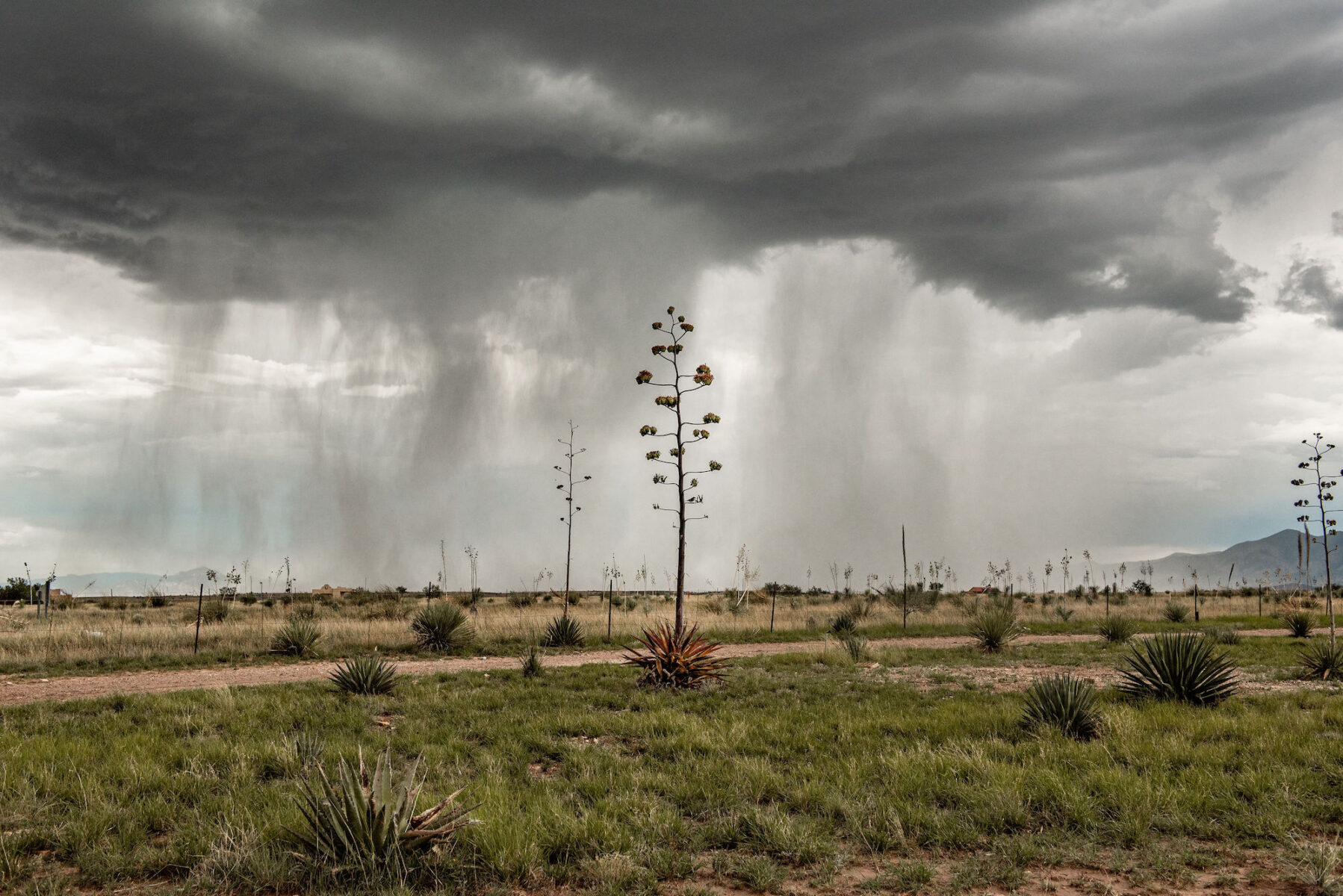
Francesca Claverie is the Native Plant Program Manager at the Borderlands Restoration Network. Based in the southern Arizona town of Patagonia, the Borderlands Restoration Network’s mission is “to grow a restorative economy by rebuilding healthy ecosystems, restoring habitat for plants and wildlife, and reconnecting our border communities to the land through shared learning.” Through binational partnerships and community-led innovation, Francesca and her team are making progress toward solving many border-specific conservation challenges– challenges that are often not very well known to those of us living far from the border.
We could easily spend five or six hours discussing Francesca’s various conservation projects, but for this hour-long conversation, we zoned in one particularly innovative project that spans the US-Mexico border called Bacanora for Bats: Binational Conservation and Sustainable Agave Spirits. The project is focused on conserving agave plants– plants that are a critical food source for specific migrating bat populations and are simultaneously under a great deal of pressure because of the booming tequila and Bacanora industries. As you’ll hear her explain, Francesca and her team have implemented a one-of-a-kind system that allows for continued economic prosperity from agave production, but not at the expense of the bat populations. It’s a perfect example of a community-driven, win-win conservation solution.
A little more than two years ago, the project was awarded the Salazar Center’s Connectivity Challenge prize– a $100,000 award that Francesca and her binational team have used to implement this innovative conservation solution. So we obviously talk about how those funds have been put to use and some of the successes that have resulted from the prize. We also discuss some of the unexpected opportunities and challenges that have arisen during the project, and how changing political administrations on both sides of the border have affected her work. We go into great detail about bats, the ecology of agave plants, and specific challenges that come with working across borders. Francesca also has a fascinating personal and professional trajectory, so we talk about her childhood spent on the California-Mexico border and how she decided to pursue conservation as a career. She also offers up some excellent book recommendations and some wise parting words.
I was so inspired by Francesca and her work along the border, and I believe there are lessons in this conversation that can be applied by anyone working in the conservation sector. Thanks to Francesca for taking the time to chat, and thank you for listening.
Header photo by Kayla Lewis, headshot courtesy of Francesca Claverie
LISTEN & DOWNLOAD:
Download on Apple Podcasts
Download on Spotify
Download on Google Podcasts
Download on Overcast
—
EPISODE PARTNER:
This episode is brought to you in partnership with Colorado State University’s Salazar Center for North American Conservation.
This conversation scratches the surface of some of the topics that will be covered in greater depth at the Salazar Center’s fourth annual International Symposium on Conservation Impact, which will be held next week – the week of October 3, 2022 – in Denver and online. The symposium will explore how conservation efforts that span boundaries like the US-Mexico border can drive binational cooperation as well as better outcomes for people and nature. An all-star lineup of conservation researchers, practitioners, policymakers, and funders will highlight opportunities for and barriers to conservation in the border region, climate change impacts, the role of Indigenous leadership, and learnings from the region’s distinct history and biogeography.
Listeners can learn more at salazarcenter.colostate.edu and receive $25 off symposium registration with the code “25OffReg”.
RESOURCES:
Topics Discussed:
- 4:30 – Overview of the Borderlands Restoration Network
- 9:30 – Application to the Connectivity Challenge
- 11:40 – Agave, Bats, and Pollination
- 20:40 – How the bat pollination issue came to Borderlands Restoration Network’s attention
- 27:00 – Certification program for Bacanora
- 36:20 – How the Connectivity Challenge funds have been invested
- 38:55 – Unexpected challenges and opportunities
- 41:20 – How different US administrations affect these border projects
- 47:20 – Francesca’s personal and professional background
- 53:45 – Other borderland projects that are showing great promise
- 57:30 – Favorite books
- 1:02:25 – Parting words
- 1:04:30 – Connect with the Borderlands Restoration Network
Information Referenced:
- Borderlands Restoration Network
- Salazar Center for North American Conservation
- Connectivity Challenge
- Borderlands Restoration Network Pitch Video
- Dr. Rod Pulliam
- Agave
- Lesser Long-nosed Bat
- Saguaro cactus
- Bat Conservation International
- Colectivo Sonora Silvestre
- Universidad de Sonora
- Sonoran election story
- Altar Valley
- Calexico, CA
- Sky Islands of Arizona
- Sky Island Alliance
- Watershed Management Group
- Tending the Wild by Kat Anderson
- Braiding Sweetgrass by Robin Wall Kimmerer
Enjoy this episode? Then you might like these too:
- Amber Smith – Creating Connection & Community
- Mike McTee & Vince Slabe – Win-Win Solutions in the Fight to Save Eagles
- Brian Yablonski – Action-Oriented Conservationist
- Liz Moore – For the Love of Montana
- Kate Mannix – A Legacy of Land Stewardship
- Shane Doyle – Reverence for the Past, Hope for the Future
- Sarah King – Collaborative Conservation in the American Southwest
- Mike Phillips – Audacious Goals, Relentless Action
Visit the podcast page for a full list of episodes where you can filter episodes by topic and guests’ vocations.
Amber Smith – Creating Connection & Community
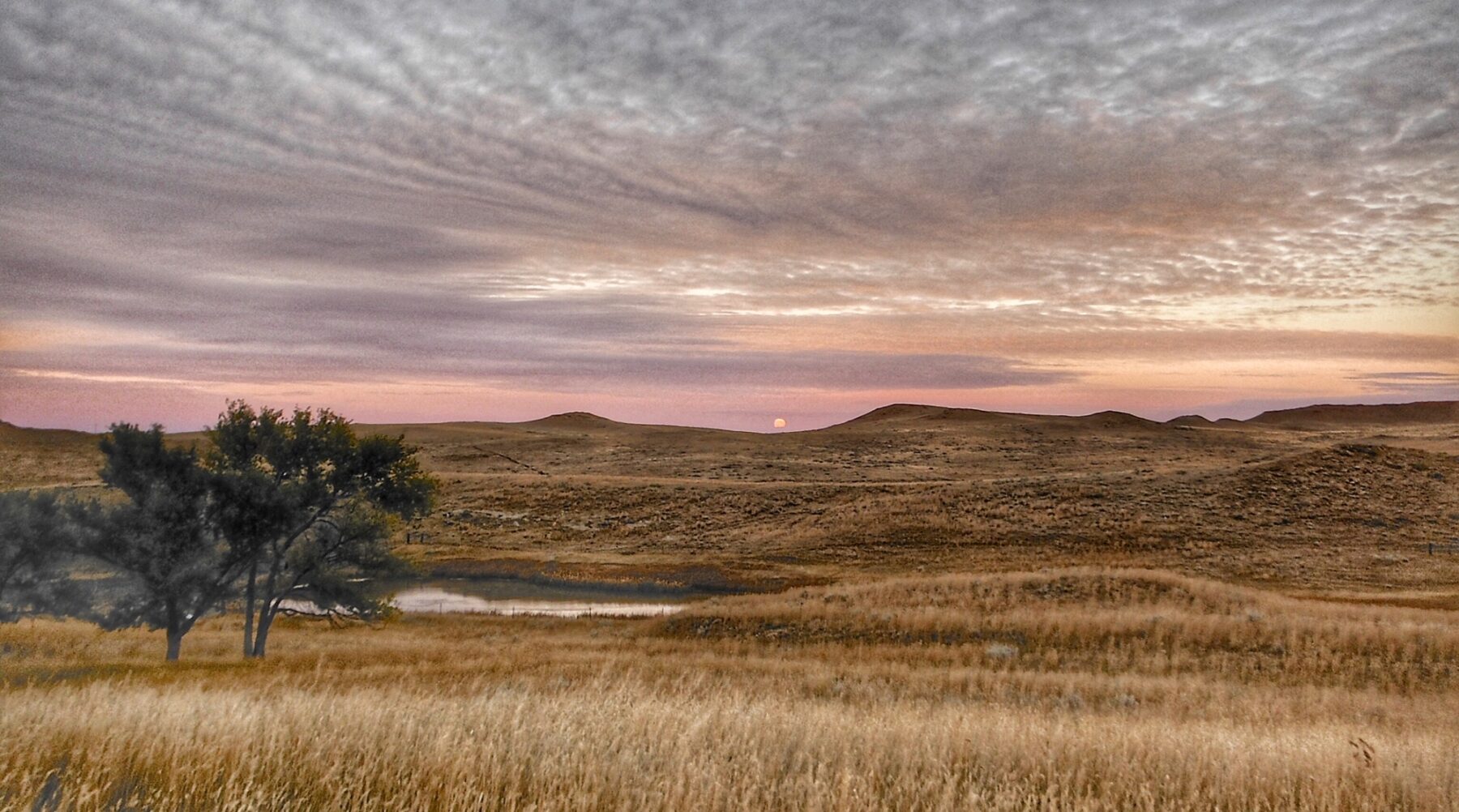
Amber Smith is a Montana-based rancher and the Executive Director of Women in Ranching, a nonprofit organization whose mission is to hold brave space, support courageous action, and champion rural women’s leadership on the land. Offering a blend of in-person and virtual events, Women in Ranching has filled a unique niche across a wide range of rural communities in the West and beyond. From skill-building workshops to virtual kitchen table chats to multi-day on-the-ground experiences, Women in Ranching offers a much-needed, supportive network for women whose families and livelihoods are closely tied to agriculture and the land.
Amber was born and raised in Illinois, and she met her now-husband Trevor while working at a ranch in Colorado. They fell in love, got married, and today Amber and Trevor have two young children and a successful ranching business in eastern Montana. As you’ll hear in our conversation, when Amber was first introduced to Women in Ranching several years ago, she felt an immediate connection to the organization’s work– the connection was so strong that she eventually took the helm as the organization’s leader. And earlier this year, after several years under the umbrella of Western Landowners Alliance, Women in Ranching became its own freestanding nonprofit organization- an exciting next step for the organization’s continued growth and evolution.
Amber and I met more than five years ago on the Antelope Springs Ranch, the ranch that she and Trevor continue to steward to this day. I was immediately impressed with her energy, dedication to her community, and ability to juggle many competing priorities with grace and humor. I’ve been following her leadership with Women in Ranching for many years now, and it was a real pleasure to have the opportunity to reconnect and have such an inspiring conversation. We talked about the purpose and mission of Women in Ranching and how the organization has evolved in unexpected ways. We discuss some of the specific challenges facing women ranchers and how Women in Ranching works to address those needs. We discussed the pandemic’s effect on ranching communities, how Amber tries to find balance in her life, how she has been positively impacted by the organization, some specific success stories, her favorite books, and much more. Be sure to check out the episode notes for a complete list of everything we discussed.
To learn more about Women in Ranching and to support its work, head over to www.womeninranching.co. Huge thanks to Amber for all of her hard work, and thanks to you for listening. Hope you enjoy.
Header photograph courtesy of Grasslands LLC, Headshot courtesy of Amber Smith
—
Download on Apple Podcasts
—
Download on Spotify
—
Download on Google Podcasts
—
Download on Overcast
—
EPISODE NOTES
Topics Discussed:
- 4:00 – Amber describes Women in Ranching
- 17:30 – Amber talks about how her work with elders impacted how she approaches her work and life
- 22:30 – Amber discusses Women in Ranching and how its work was influenced by the pandemic
- 29:00 – Amber talks about who comes to the Confluence
- 30:30 – Amber discusses the current form of Women in Ranching
- 35:00 – Amber talks about the early stages of Women in Ranching becoming their own organization
- 40:00 – Amber explains her outlook on life balance and managing overwhelm
- 45:30 – Amber discusses how she learned to deal with a new kind of challenge in her work with Women in Ranching
- 56:00 – Amber talks about how the shift in Women in Ranching from WLA program to its own organization impacted her as a person
- 1:05:45 – How folks can get involved and support Women in Ranching
- 1:10:15 – Amber talks about books that have influenced her
- 1:14:30 – Amber’s parting words of wisdom
Information Referenced:
- Women in Ranching: Website & Instagram
- Quivira Coalition
- Regenerate conference
- Paicines Ranch
- TomKat Ranch
- Elaine Patarini
- Wendy Millet
- Steamboat Springs, CO
- Western Landowners Alliance
- Lesli Allison
- Holistic management
- Extension service
- Ranching for Profit
- Savory Institute
- Nicki Silvestri
- Robin Wall Kimmerer
- Tribe by Sebastian Junger
- Paul Farmer
- Andrea Malmberg
- Tony Malmberg
- Green Grass and the Spring by Tony Malmberg
- Pretty-shield: Medicine Woman of the Crows by Frank B. Linderman
- River House by Sarahlee Lawrence
- Rainshadow Organics
- Alzada, MT
- The Long Way Home: Journeys of a Chinese Montanan by Flora Wong
Enjoy this episode? Then you might like these too:
- Kate Mannix – A Legacy of Land Stewardship
- Riddy Arman – Artistic Authenticity
- Betsy Gaines Quammen – A Fascinating History of Public Lands in the West
- Matt Pierson – Finding New Solutions for Food Insecurity
- Shane Doyle – Reverence for the Past, Hope for the Future
- Antonia Malchik – Exploring Culture & Complexity
- Iris Gardner – Living with Intention
- Daniela Ibarra-Howell – Healing the Land Holistically
- Jessica Ilalaole – Creating Home in the High Desert
Visit the podcast page for a full list of episodes where you can filter episodes by topic and guests’ vocations.
Mike McTee & Vince Slabe – Win-Win Solutions in the Fight to Save Eagles
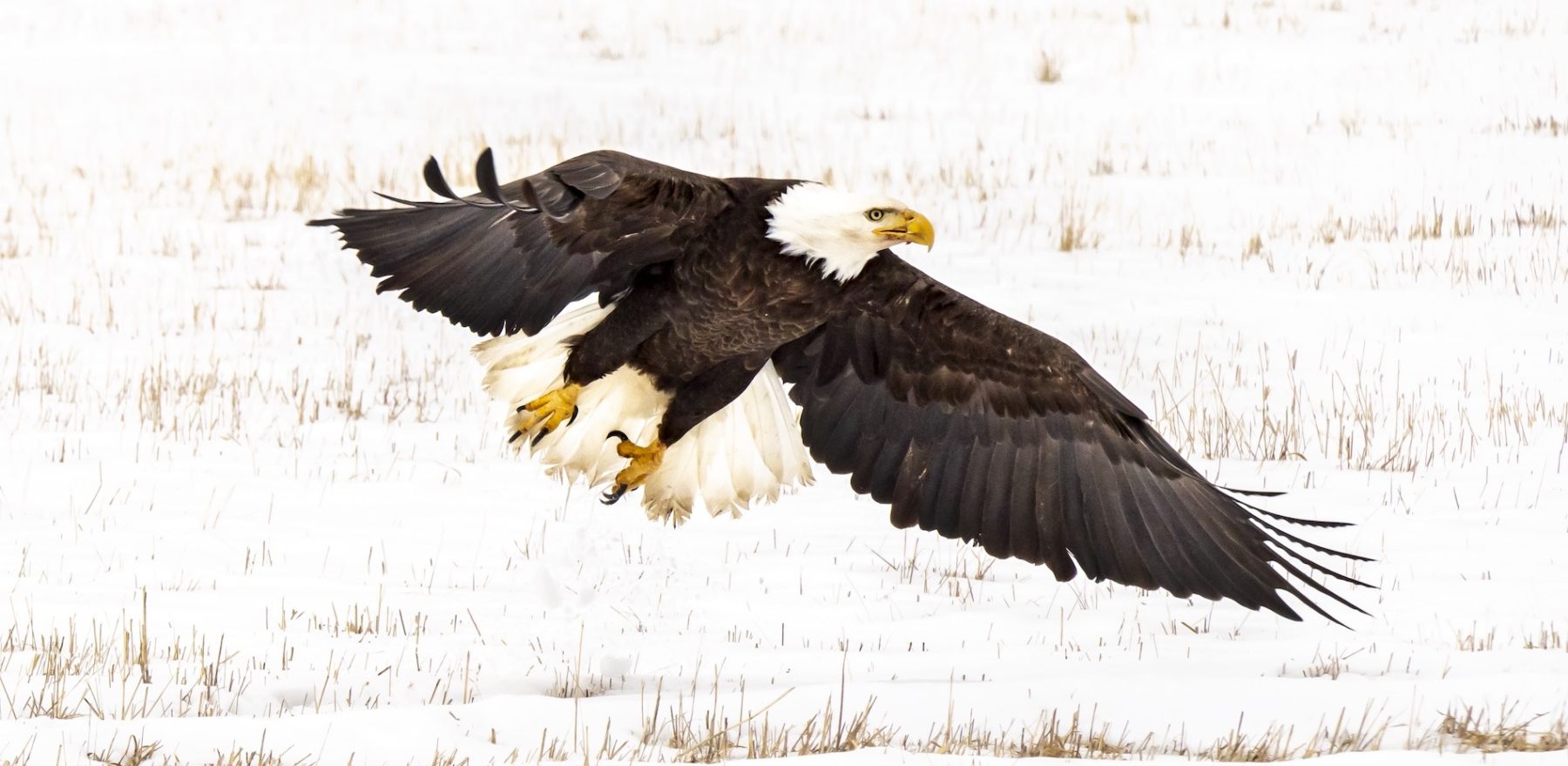
Mike McTee and Vince Slabe are Montana-based researchers who use cutting-edge science, writing, and educational programs to protect eagles in the American West and beyond. Both Mike and Vince are laser-focused on the surprisingly little-known issue of lead poisoning in bald and golden eagles, a problem caused mainly by eagles scavenging the remains of big game animals that have been hunted with lead-based ammunition. For example, a study conducted near Jackson Hole captured migrating golden eagles, tested them for lead, and found that 98% had elevated lead levels in their blood. Committed hunters themselves, Mike and Vince are devoting their professional energies toward finding sustainable, reasonable, and mutually beneficial solutions to this large-scale challenge.
Mike lives in Missoula and works as a researcher at the MPG Ranch, a large, privately owned ranch in the Bitterroot Valley that promotes conservation through restoration, research, education, and information sharing. He is also the author of the excellent new book Wilted Wings: A Hunter’s Fight for Eagles, which was recently published by Riverfeet Press. In it, Mike lays out the issue of lead poisoning in eagles in a compelling and easy-to-understand style, and he offers some clear and relatively simple paths to solving the problem. Mike has also written for The FlyFish Journal, Backcountry Journal, and Bugle, and he is a sought-after speaker on various hunting-related topics.
Vince is a Bozeman-based Research Wildlife Biologist with Conservation Science Global. He holds a Ph.D. from West Virginia University and recently published a wildly cited paper that details the implications of lead poisoning in eagles across North America. The paper, which was published in Science, describes how almost half of the bald and golden eagles sampled for the study had elevated levels of lead in their blood. More importantly, it explains exactly how increasing or decreasing levels of lead exposure will affect golden and bald eagle populations. We discussed the paper in our conversation, and I’ve also linked it to the episode notes.
This is a fascinating discussion that digs deep into a very specific issue– an issue that is largely under the radar here in the West. But if you zoom out from the details related to lead and eagles, and focus on the big picture, I think you’ll agree that Mike and Vince are shining examples of the many smart, driven, level-headed people here in the West who are working hard to find win-win solutions to conservation-related challenges. I thoroughly enjoyed this conversation, Mike’s new book, and Vince’s paper, and I hope you will too.
Be sure to check out the episode notes for a list of all the topics we discussed and links to everything. Thanks for listening!
Header photograph by Estelle Shuttleworth, Mike’s headshot by Jordan Hoffmaster
—
Download on Apple Podcasts
—
Download on Spotify
—
Download on Google Podcasts
—
Download on Overcast
—
This episode is brought to you by The Arthur M. Blank Family Foundation, which embodies the values-based approach to philanthropy and business of its Chairman Arthur M. Blank
EPISODE NOTES
Topics Discussed:
- 3:45 – Mike’s introduction
- 5:30 – Vince’s introduction
- 8:45 – Mike and Vince discuss the history of raptor-human interaction in the US over the last 200 years
- 15:15 Mike and Vince discuss the threat of lead poisoning as it pertains to raptors, noting the historical use of lead shot in waterfowl hunting
- 26:30 – Mike and Vince discuss their current work addressing the threat still posed to raptors by lead bullets for big game hunting
- 33:00 – Vince discusses ammunition demonstrations and the Arthur M. Blank Foundation’s advocacy for adopting non-lead ammunition through their private, guided hunting trips.
- 40:15 – Mike and Vince talk about why there has been resistance to widespread adoption of non-lead ammunition.
- 49:15 – Mike discusses managing the few situations where there is anger directed towards his work as he encourages hunters to switch ammunition
- 55:15 – Mike and Vince’s book recommendations
- 1:04:30 – Mike and Vince’s parting words of wisdom
Information Referenced:
- Arthur M. Blank Family Foundation
- Mike McTee
- Wilted Wings by Mike McTee
- Mike’s quarterly newsletter: Montana’s Nonlead Newsletter
- Vince Slabe
- Conservation Science Global
- MPG Ranch
- Bitterroot Valley
- Sapphire Mountains
- Selway-Bitterroot Wilderness
- Trap shooting
- Skeet shooting
- Rob Domenech
- Raptor View Research Institute
- Bald Eagle
- Golden Eagle
- “Demographic Implications of Lead Poisoning for Eagles Across North America” by Vince Slabe
- Silent Spring by Rachel Carson
- Peregrine Falcon
- Bald and Golden Eagle Protection Act
- Hawk Mountain
- Goshawk
- Grouse
- George Bird Grinnell
- Boone and Crockett Club
- Field and Stream
- Waterfowl
- Mallard
- Bismuth
- National Wildlife Federation
- Endangered Species Act
- Migratory Bird Treaty Act
- The Peregrine Fund
- Chris Parish
- Billings Gazette
- Missoulian
- Paradise Valley
- Montana Hunters for Eagle Conservation
- Hunters for Eagle Conservation
- Pittman-Robertson Wildlife Restoration Act
- Asics
- Montana Master Hunter Program
- One Montana
- Barnes Bullets
- Federal Premium Ammunition
- Nosler
- Hornady Manufacturing
- Shirley Basin
- North American Non-lead Partnership
- Leland Brown
- Oregon Zoo
- huntingwithnonlead.org
- Sporting Lead Free
- One Long River of Song by Brian Doyle
- Orion Magazine
- “Their Irrepressible Innocence” by Brian Doyle
- “Joyas Voladores” by Brian Doyle
- American Scholar
- Indian Creek Chronicles by Pete Fromm
- American Buffalo by Steven Rinella
- Scavenger’s Guide to Haute Cuisine by Steven Rinella
- There There by Tommy Orange
- Refuge by Terry Tempest Williams
- Jim Harrison
- Blood Meridian by Cormac McCarthy
- The Road by Cormac McCarthy
- Ernest Hemingway
- A Sand County Almanac by Aldo Leopold
- Henry David Thoreau
- Dr. Drew Lanham
- The Homeplace by Drew Lanham
- Black Faces, White Spaces by Carolyn Finney
- Beyond Fair Chase by Jim Posewitz
Enjoy this episode? Then you might like these too:
- Shane Doyle – Reverence for the Past, Hope for the Future
- Matt Pierson – Finding New Solutions for Food Insecurity
- Dr. Eric Arzubi – A New Approach to Solving the West’s Mental Health Crisis
- Liz Moore – For the Love of Montana
- Lesli Allison & Tuda Libby Crews – Durable Conservation in the West… and Beyond
- Dr. David Hewitt – The Science of Wildlife Conservation
- Jessica Wahl Turner – Outdoor Recreation & Rural Economies
Visit the podcast page for a full list of episodes where you can filter episodes by topic and guests’ vocations.
Peter Stark – Tales of Adventure, Exploration, & Epic Battles
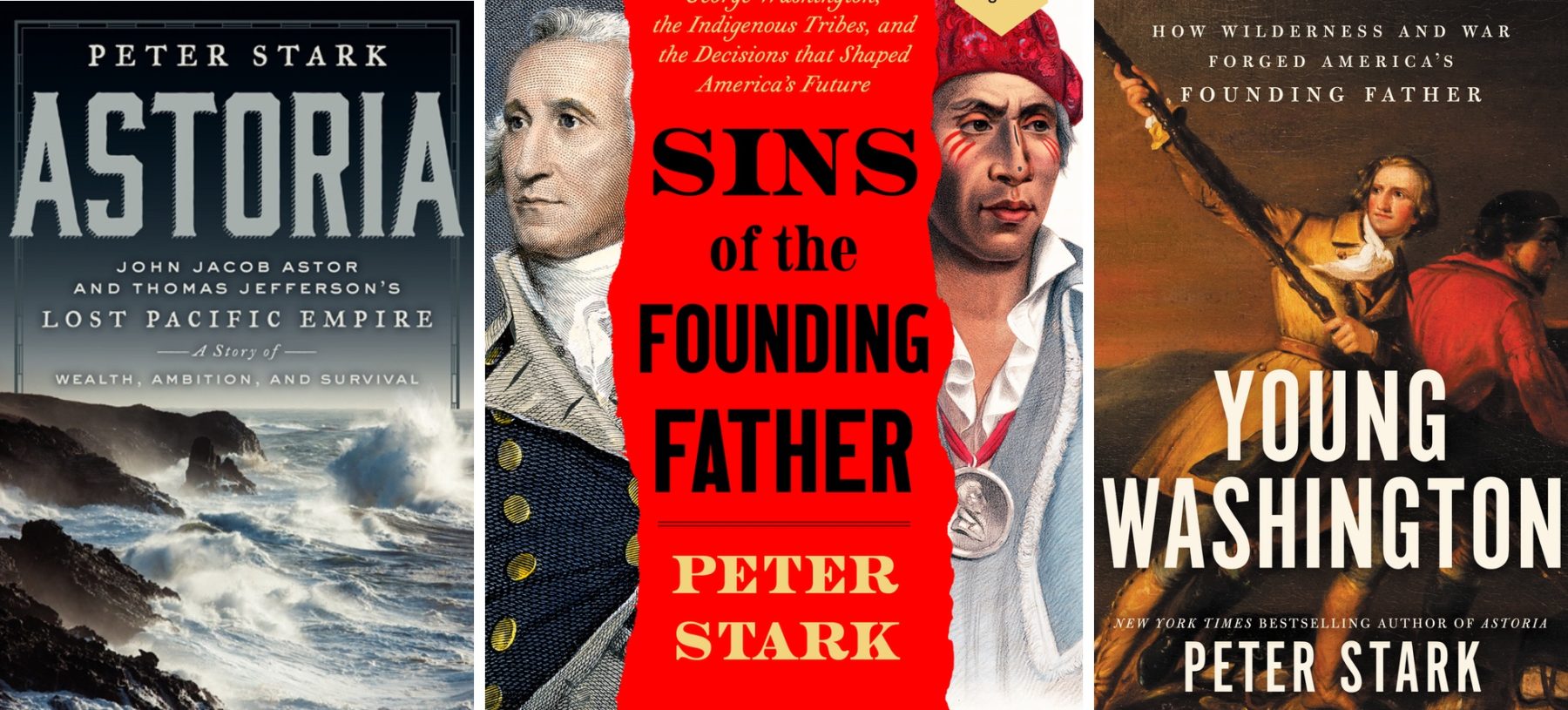
If you’re a long-time Mountain & Prairie listener, then I’m sure you’ve heard me reference the author and historian Peter Stark. He’s written some of the most memorable books I’ve ever read, including one of my all-time favorites about the early history of the western United States– a thrilling tale of adventure and exploration called Astoria: John Jacob Astor and Thomas Jefferson’s Lost Pacific Empire: A Story of Wealth, Ambition, and Survival. Peter has also spent years working as a correspondent for Outside and has written extensively for magazines including Smithsonian, Men’s Journal, The New Yorker, and more.
I’ve been a fan of Peter’s for more than twenty years, so when I was offered the chance to chat with him, I jumped at the opportunity. The focus of this conversation is Peter’s newest project, an e-and audiobook titled Sins of the Founding Father: George Washington, the Indigenous Tribes, and the Decisions that Shaped America’s Future. It’s an in-depth exploration of an often-overlooked battle in 1791 between American troops and Indigenous tribes– a violent fight that was decisively won by the Native Americans, and resulted in three times more American deaths than the Battle of Little Big Horn. The e-book also covers the life and personality of George Washington, America’s insatiable hunger for land, and the United States’ uncertain future in the years just after the Revolutionary War.
You might be wondering, what does George Washington have to do with the present-day American West? Back then, the term “American West” described a region now known as Ohio. Well, as you’ll hear in this conversation, this specific battle set the course of action for the next hundred+ years regarding the United States’ policies toward Indigenous tribes. The American’s crippling defeat led Washington and other leaders to ramp up their violent tactics against Native tribes and hold nothing back in their quest to claim as much western land as possible, as quickly as possible. It’s an eye-opening story that gave me a much better understanding of the ambition, egos, and economic realities that laid the foundation for the modern-day West.
Sins of the Founding Father is available exclusively at Scribd, and there’s a link in the episode notes that will give you a free 30-day trial. Scribd is a really cool app that I’ve enjoyed using for e and audiobooks, so go to Scribd.com to check it all out. Sins of the Founding Father is a great read and at only 70 pages, you can enjoy it in one sitting. I hope you’ll check it out, and I hope you enjoy this conversation.
All images courtesy of Peter Stark and Scribd
LISTEN
Download on Apple Podcasts
—
Download on Spotify
—
Download on Google Podcasts
—
Download on Overcast
EPISODE NOTES
Topics Discussed:
- 4:00 – Peter describes young George Washington
- 7:15 – Peter discusses Washington’s lust for land acquisition
- 19:30 – Peter talks about how Washington’s land speculation set the playbook for greedy land acquisition seen throughout US history
- 23:00 – Peter jumps ahead to Washington’s life in 1791
- 40:00 – Peter talks about writing history in an engaging way
- 46:00 – Peter discusses his own writing process
- 51:15 – Peter discusses the historical parallels between our recent sociopolitical turmoil and that of the late 1700s following the Battle with No Name – or -discusses the fallout of the Battle with No Name
- 1:01:15 – Peter’s book recommendations
Information Referenced:
- Sins of the Founding Father by Peter Stark
- Last Breath by Peter Stark
- Young Washington by Peter Stark
- Astoria by Peter Stark
- The French and Indian War
- Jamestown, VA
- Shenandoah Valley
- Piedmont
- Blue Ridge Mountain
- Robert Dinwiddie
- Lexington and Concord
- Patrick Henry
- Benjamin Franklin
- The Confederated Congress
- Shawnee Tribe
- Henry Knox
- Fort Washington
- Miami Tribe
- Kakionga
- Arthur St. Clair
- Gout
- The Battle with No Name (the Battle of the Wabash)
- Outside magazine
- Tim Colter
- Matthew Waxman
- Mark Trahant
- Shoshone Tribes
- Navajo Nation
- Tecumseh
- William Henry Harrison
- Thomas Jefferson
- Alexander Hamilton
- Edmond Randolph
- Mount Vernon
- The Northwest Ordinance of 1787 (Peter discusses Art. 3)
- The Annals of Congress from March 1792
- Potawatomi People
- John Dunn Hunter
- Memoirs of a Captivity Among the Indians of North America by John Dunn Hunter
- Scoouwa: James Smith’s Indian Captivity Narrative by James Smith
- The Snow Leopard by Peter Matthiessen
- Coming into the Country by John McPhee
- Winter in the Blood by James Welch
- Fools Crow by James Welch
- Crow Tribe
Enjoy this episode? Then you might like these too:
- Betsy Gaines Quammen – A Fascinating History of Public Lands in the West
- Nate Schweber – A Forgotten Chapter of American Conservation
- Hampton Sides, Part 3 – Tales from a Most Excellent Adventure
- Chris La Tray – Rediscovering His Past, Writing His Future
- William deBuys – Sage of the Southwest
- Hampton Sides – Live at the Aspen Institute
- Sara Dant – A Deep Dive Into the History of the West
Visit the podcast page for a full list of episodes where you can filter episodes by topic and guests’ vocations.
Frances Ashforth – Art, Water, and Wide-Open Spaces
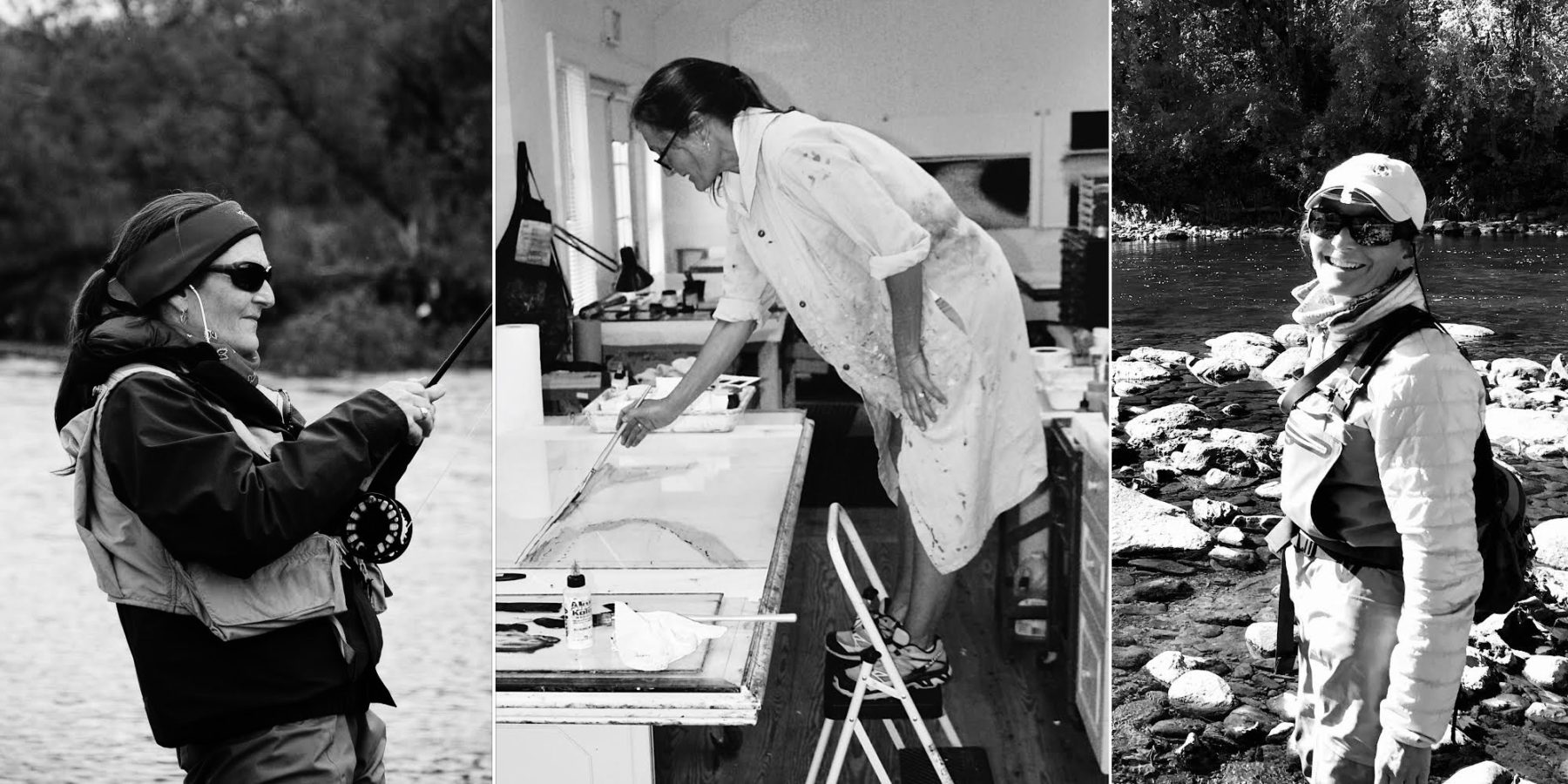
Frances B. Ashforth is an artist who specializes in drawing, printmaking, and painting. While much of her work is tied to the landscapes and rivers of the American West, she is also well known for her depictions of salt flats and coastal weather in more tropical locales. If there are two threads that bind all of Francie’s work, they are her deep reverence for natural landscapes and her desire to protect them. Over the years, she has collaborated with many highly regarded conservationists to combine writing and art– first, in her Water + Words project, and most recently, when she created all of the art for Dylan Tomine’s excellent new book Headwaters: The Adventures, Obsession and Evolution of a Fly Fisherman.
Francie was born and raised on the east coast, into a family of artists and athletes who cultivated her obsessions with art and perpetual physical activity. Even though a childhood accident confined her to a body brace for nearly six years, Francie always pursued her passions with full enthusiasm and vigor, working hard to keep a positive attitude in the face of such a serious physical setback. But her commitment to creativity never waivered– after studying art and architecture in college, she worked professionally as both an architectural illustrator and art director for more than a decade. Eventually, Francie left her day job to focus on her own artistic endeavors, as well as her all-important role as a mother to young children. Today, Francie’s work has been shown in venues from New York City to San Francisco, and she has a loyal following among galleries and collectors across the country.
Francie and I met through past podcast guest Dylan Tomine, when I had the pleasure of interviewing both of them at a live event in Brooklyn earlier this year. I was immediately impressed with Francies’ art, her obsession with fly fishing and books, and her long-term commitment to melding art and conservation. So I was so thrilled when she agreed to join me on the podcast, and we managed to cover a lot. We discussed her childhood and her family’s influence, and her early career that combined art and architecture. We talked about the specifics of her art, including her influences and her preferred mediums, and we talked in detail about her Water + Words project. We talk a lot about the book Headwaters, as well as her own love of books and reading. Francie offers a long list of excellent book recommendations, so be sure to check the episode notes for links to all of those and everything else we discuss.
Huge thanks to Francie for all she does for conservation and for taking the time to chat with me. Hope you enjoy!
All images courtesy of Frances Ashforth
LISTEN
Download on Apple Podcasts
—
Download on Spotify
—
Download on Google Podcasts
—
Download on Overcast
EPISODE NOTES
Topics Discussed:
- 3:40 – Francie discusses her childhood
- 5:30 – Francie talks about her family’s creative streak
- 8:30 – Francie discusses an accident that impacted her childhood
- 19:00 – Francie talks about her college education and early career in architecture
- 26:15 – Francie explains her transition from professional drafting to focusing on her own art
- 28:55 – Francie describes her art
- 32:30 – Francie talks about her Water and Word Project
- 37:15 – Francie explains her process of adapting existing words into new, complementary art
- 42:45 – Francie talks about how she became involved with Dylan Tomine, Headwaters, and Patagonia Books
- 49:15 – Francie discusses reading and the books that make up her personal “bibliography”
- 1:00:30 – Francie talks about what is giving her hope these days
Information Referenced:
- Frances B. Ashforth
- Francie on Instagram
- Water + Words
- Dylan’s past Headwaters event
- Connecticut River
- Printmaking
- Drafting
- Westport, CT
- Scoliosis
- Body brace
- C-curve scoliosis vs S-curve scoliosis
- Lexington Avenue, New York City
- Tree well
- Forest Gump
- Forest Gump loses his brace
- Fine Homebuilding Magazine
- PageMaker
- CAD system
- Ecotones
- Dylan Tomine
- Headwaters by Dylan Tomine
- Joe Whitworth
- Rachel Finn
- Spencer Beebe
- Christopher Shore
- Codex Foundation
- Malinda Chouinard
- Patagonia books
- Rick Ridgeway
- The Immense Journey by Loren Eiseley
- Jane Goodall
- Far North by Marcel Theroux
- Where the Crooked River Rises by Ellen Waterston
- Bend, OR
- Playa
- Summer Lake, OR
- Rancher, Farmer, Fisherman by Miriam Horn
- Refuge by Terry Tempest Williams
- Arctic Dreams by Barry Lopez
- Horizon by Barry Lopez
- Buffalo for the Broken Heart, Dan O’Brien
- Antelope Island
- Basin and Range, John McPhee
- Survival of the Bark Canoe, by John McPhee
- Oranges by John McPhee
- Draft No. 4 by John McPhee
- Encounters with the Archdruid by John McPhee
- The Red Pony by John Steinbeck
- Old Yeller by Fred Gipson
- Where the Sea Used to Be by Rick Bass
- Powell’s bookstore
- Fourth of July Creek by Smith Henderson
- Bryan Nash Gill
- Eric Arzubi
- Thirteen Moons by Charles Frazier
- The Big Sky by A.B. Guthrie, Jr.
- The Way West by A.B. Guthrie, Jr.
- Kentucky Straight by Chris Offutt
- The Good Brother by Chris Offutt
- Nate Schweber
Enjoy this episode? Then you might like these too:
- Dylan Tomine – Protecting What He Loves
- Heather Hansman, Part 2 – The Fascinating Story of Skiing’s Past, Present & Future
- Kate Mannix – A Legacy of Land Stewardship
- Kelsey Johnson – Chasing Her Artistic Ambitions
- Iris Gardner – Living with Intention
- Juanita Vero, Part 2 – A Deep Desire to Serve
- Dr. David Hewitt – The Science of Wildlife Conservation
- Riddy Arman – Artistic Authenticity
Visit the podcast page for a full list of episodes where you can filter episodes by topic and guests’ vocations.
10 Must-Read Books about the American West, with Mark Kenyon
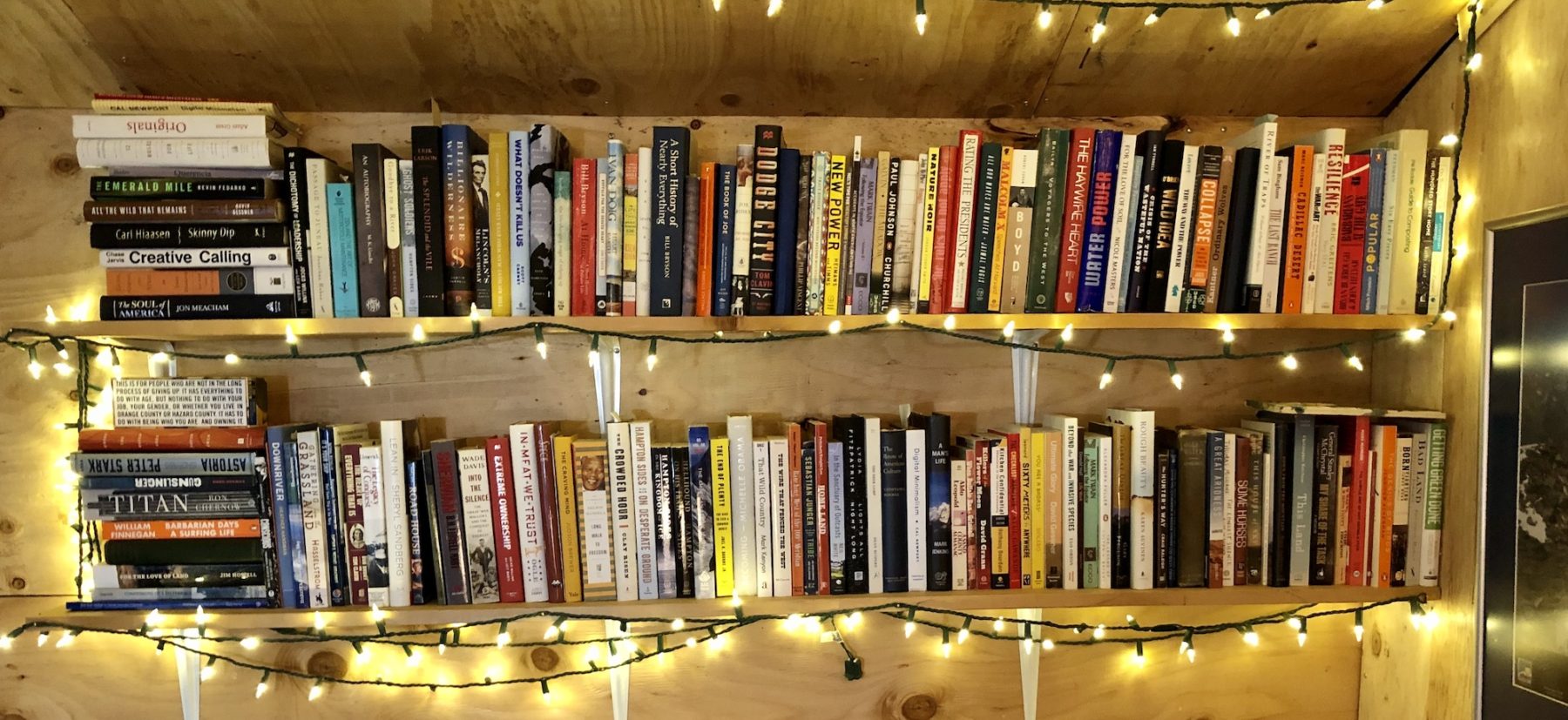
Mark Kenyon is an author, podcaster, conservationist, and member of the MeatEater crew. You probably know him from his excellent book That Wild Country: An Epic Journey Through the Past, Present, and Future of America’s Public Lands, the Wired to Hunt podcast, or his contributions to MeatEater’s Netflix show and other video productions. To learn more about Mark and his impressive personal and professional journey, I’d encourage you to go back to our first Mountain & Prairie conversation from a few years ago, which is linked in the episode notes.
In this episode, Mark and I are doing something a little different: We’re focusing exclusively on books. Earlier this year, Mark had me on his podcast to discuss our favorite books about conservation, and we both received excellent feedback on that episode. You can find a link to that discussion in the notes. So we decided to have another book conversation, this time focusing on some of our favorite books about the American West. Both Mark and I are voracious readers who love share a love of history, conservation, and adventure, so I’m always excited to hear Mark’s recommendations and thoughts on a wide range of titles.
The episode starts out with a brief catch-up on Mark’s summer adventures and his current work with MeatEater, and then we dive into the books. We each picked five of our all-time favorites, and, as you’d expect, we veer off into other tangentially related titles and subjects. This is an episode where you’ll definitely want to check out the episode notes, because there are links to dozens of books, authors, films, and other resources. Mark and I could’ve easily talked for three or four hours, but we had to keep the conversation relatively short because of tight schedules. However, we’re going to try and make these book conversations a regular occurrence on both of our podcasts– so if you like this format, stay tuned for more!
If you haven’t already, I’d encourage you to check out Mark’s podcast or follow him on social media– he’s a smart, thoughtful, hard-working guy that brings tons of value to the world of conservation and outdoor recreation. Please enjoy the episode, and if you do, please share it with a few friends.
Mark’s Five Recommendations
Desert Solitaire by Edward Abbey
Blood Meridian by Cormac McCarthy
The Course of Empire by Bernard DeVoto
Dreams of Eldorado by H.W. Brands
The Oregon Trail by Rinker Buck
Great Plains by Ian Frasier
Ed’s Five Recommendations
Blood and Thunder by Hampton Sides
The Emerald Mile by Kevin Fedarko
Leave It As It Is by David Gessner
Bad Land by Jonathan Rabin
American Zion by Betsy Gaines Quammen
—
Headshot courtesy of Mark Kenyon
—
Download on Apple Podcasts
—
Download on Spotify
—
Download on Google Podcasts
—
Download on Overcast
EPISODE NOTES
Topics Discussed:
- 4:00 – Mark talks about his summer with his family
- 11:30 – Mark discusses his plans for Meat Eater in the fall
- 13:15 – Mark talks about the incredible experiences that constitute his job
- 14:30 – Mark and Ed discuss their five favorite American West conservation books (see their lists below) starting with Desert Solitaire
- 27:30 – Blood and Thunder
- 33:15 – Empire of the Summer Moon
- 34:45 – Blood Meridian
- 36:15 – The Course of Empire and
- 39:15 – Dreams of Eldorado
- 45:15 – The Emerald Mile
- 51:00 – The Oregon Trail
- 54:45 – Leave It As It Is
- 59:00 – Great Plains
- 1:03:15 – Badlands
- 1:05:45 – American Zion
Information Referenced:
- That Wild Country by Mark Kenyon
- MeatEater
- Ed and Mark on Wired to Hunt
- Mark’s first appearance on Mountain & Prairie
- Jocko energy drink
- Sculpin
- Cutthroat Trout
- Nymph
- Dry fly
- Mending the line
- Riffle
- Rainbow Trout
- Largemouth Bass
- Spin reel fishing vs fly fishing
- Steve Rinella
- Janis Putelis
- Pronghorn
- Undaunted Courage by Stephen E. Ambrose
- Canyonlands National Park
- Arches National Park
- Glen Canyon
- Sierra Nevada Mountains
- All the Wild That Remains by David Gessner
- Edward Abbey
- Wallace Stegner
- The Godfather
- Yvon Chouinard
- John C. Frémont
- James Henry Carleton
- Navajo
- Empire of the Summer Moon by S.C. Gwynne
- Comanche
- Quanah Parker
- The Overstory by Richard Powers
- Across the Wide Missouri by Bernard DeVoto
- Year of Decision: 1846 by Bernard DeVoto
- Astoria by Peter Stark
- Santa Fe Trail
- Nate Schweber
- This America of Ours by Nate Schweber
- Kevin Fedarko (MnP)
- Outside Magazine
- Beyond the Hundredth Meridian by Wallace Stegner
- Downriver by Heather Hansman
- Heather Hansman
- Cadillac Desert by Marc Reisner
- Martin Litton
- Pete McBride
- Into the Canyon
- A Walk in the Woods by Bill Bryson
- Bears Ears National Monument
- Theodore Roosevelt: The Strenuous Life by Kathleen Dalton
- In Cold Blood by Truman Capote
- Betsy Gaines Quammen
- Malheur occupation
Enjoy this episode? Then you might like these too:
- Hampton Sides – Live at the Aspen Institute
- Betsy Gaines Quammen – A Fascinating History of Public Lands in the West
- David Gessner, Part 3 – A Confluence of Conservation Ideals
- Hal Herring – A Man of Words & Wild Places
- Heather Hansman – Demystifying Water in the West
- Sara Dant – A Deep Dive Into the History of the West
- Nate Schweber – A Forgotten Chapter of American Conservation
- Chris La Tray – Rediscovering His Past, Writing His Future
- Callan Wink – A New Voice for the New West
- Peter Heller – Chasing the Flow
- Chandra Brown – Fostering Creativity Through River Adventures
Visit the podcast page for a full list of episodes where you can filter episodes by topic and guests’ vocations.
Nate Schweber – A Forgotten Chapter of American Conservation
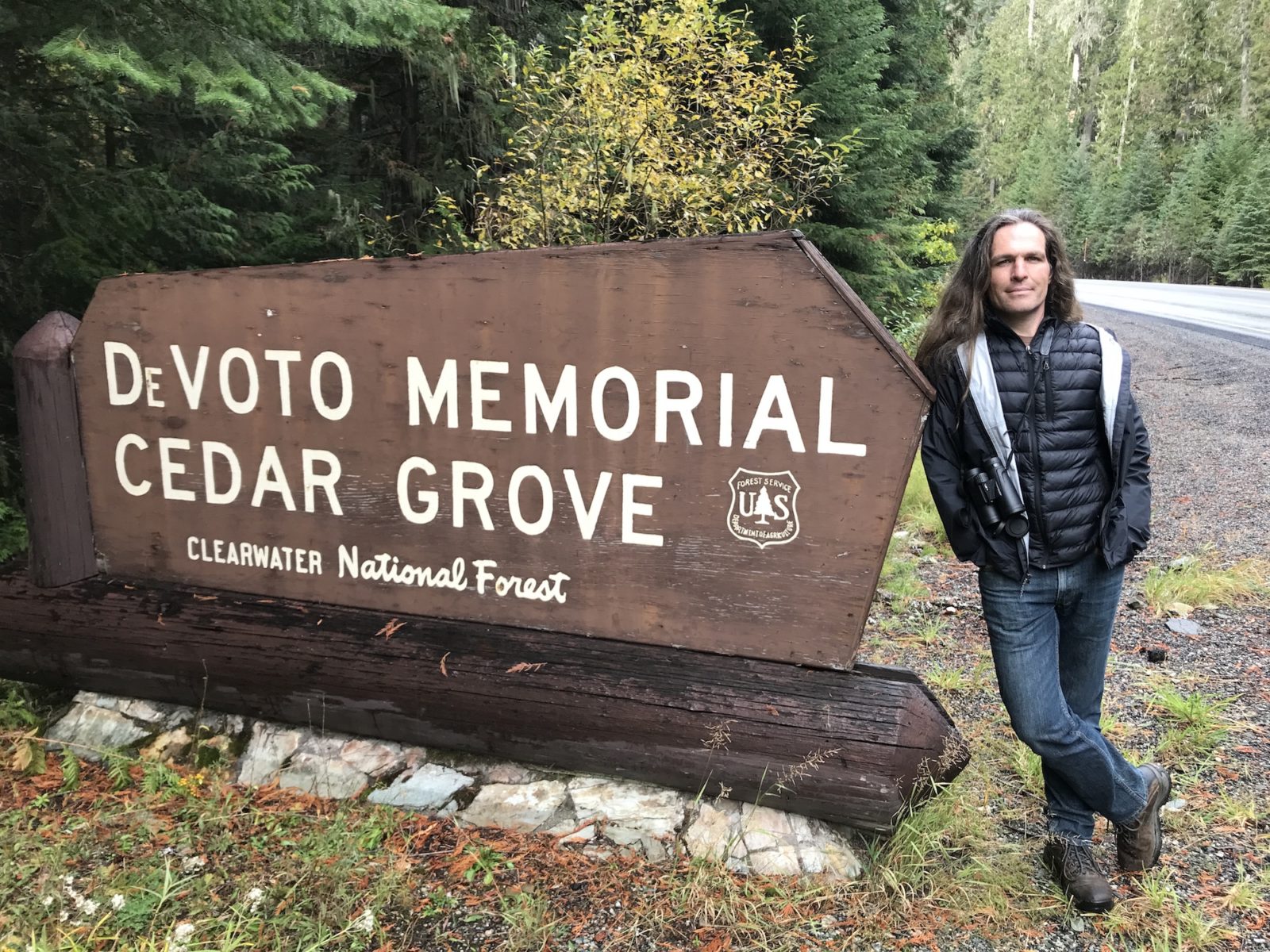
Nate Schweber is an award-winning journalist whose work has been featured in the New York Times, ProPublica, Anthony Bourdain’s Parts Unknown, and more. He’s also the author of the new book This America of Ours: Bernard and Avis DeVoto and the Forgotten Fight to Save the Wild, which was published in early July 2022. If you’re looking for an engaging and entertaining history book that highlights an often-overlooked era of conservation in the American West, then This America of Ours is your book– as you’ll hear in this conversation, I thoroughly enjoyed it.
Nate is a native Montanan who grew up in Missoula and headed east to New York City as a young man to pursue a career in journalism. Despite building a successful life and career in the big city, Nate never lost his love for Montana– so he made an effort to pursue more stories linked to the people and landscapes of the American West. As he studied and explored the West with his journalist’s eye, he discovered the writings of Bernard DeVoto and was quickly captivated. Fast forward to today, and he has written an amazing book about Bernard and his wife Avis, and how together they were one of the most important and effective forces for conservation in the early 20th century.
I knew I was going to enjoy This America of Ours, but it surpassed all of my lofty expectations. While I had definitely heard of the DeVotos, I had no idea of their influence and fearlessness, especially as they faced off against powerful forces that were attempting to sell off vast tracts of our public lands. Nate and I dig into all aspects of the DeVotos’ lives and historical importance, both individually and as a power couple. We talk about why Nate became so obsessed with the DeVotos, and how the DeVotos bridged the gap between Theodore and Franklin Roosevelt’s conservation legacies and the modern-day environmental movement. We discuss the parallels between the public lands battles of today and those of the early 20th century, and how reading history helps us to better understand and process today’s current events. Nate also offers up tons of excellent book recommendations, so be sure to check out the notes for a list of all the topics we discuss and links to everything.
A huge thanks to Nate for writing such an enlightening book and for taking the time to join me for a conversation. I hope you enjoy!
Header photo courtesy of Nate Schweber, headshot by Dave Sanders
—
Download on Apple Podcasts
—
Download on Spotify
—
Download on Google Podcasts
—
Download on Overcast
EPISODE NOTES
Topics Discussed:
- 4:00 – How the DeVotos captured Nate’s attention
- 8:45 – Nate describes the DeVotos’ personalities
- 13:30 – Nate explains how a flood galvanized Bernard DeVoto’s passionate conservation ethic
- 20:00 – The role road trips played in the DeVotos’ lives and work
- 27:00 – Nate discusses how learning the historical and legal backdrop for conservation colors his understanding of the challenges surrounding conservation and public lands now
- 32:00 – Nate introduces some of the tangles the DeVotos had with the FBI following accusations that the couple were communists
- 38:00 – Nate discusses an important friendship for the DeVotos: Julia Child
- 44:00 – Nate dives into his process of researching the DeVotos
- 49:45 – Nate talks about his career and how he ended up moving from Missoula, MT to New York City, and why he stays there now
- 55:07 – Ed and Nate discuss contradictions in each personality and how they make people more interesting
- 58:00 – Nate recommends some books
- 1:03:30 – Nate’s parting words of wisdom
Information Referenced:
- This America of Ours: Bernard DeVoto and the Forgotten Fight to Save the Wild by Nate Schweber
- Bernard DeVoto
- Avis DeVoto
- David Gessner
- This Land by Christopher Ketchum
- Harper’s Magazine
- Upper Peninsula, Mchigan
- Ogden, UT
- Homer
- Wasatch Range
- Harvard University
- University of Utah
- Cloudburst
- Pueblo, CO
- Escalante, UT
- Silver City, NM
- Clean Air Act
- Endangered Species Act
- The Wilderness Act
- Wild and Scenic Rivers Act
- Land and Water Conservation Fund
- “The West Against Itself,” by Bernard DeVoto
- Civilian Conservation Corps (CCC)
- The Garrison Dam
- Mandan, Hidatsa, and Arikara Nation
- Joseph Kinsey Howard
- Montana: High, Wide, and Handsome by Joseph Kinsey Howard
- Ansel Adams
- Wallace Stegner
- Chet Olson
- Fred Sanders
- Karl Marx
- J. Edgar Hoover
- Joseph McCarthy
- Thomas McGuane
- Jim Harrison
- Hunter S. Thompson
- Hell’s Angels: A Strange and Terrible Saga by Hunter S. Thompson
- Robert Frost
- Stanford University
- Ray Bradbury
- Julia Child
- Julie and Julia
- Deborah Rush
- Julia series on HBO
- Bebe Neuwirth
- Saturday Evening Post
- “Shall We Let Them Ruin Our National Parks,” article by Bernard Devoto
- Blacklisting
- Reader’s Digest
- Fortune
- Reno, NV
- Pat McCarran
- Laramie, WY
- Wyoming Stock Growers Association
- Weber State University
- DeVoto’s Nonfiction Western Trilogy
- The Year of the Decision: 1846 by Bernard DeVoto
- Across the Wide Missouri by Bernard DeVoto
- The Course of Empire by Bernard DeVoto
- DeVoto’s West: History, Conservation, and the Public Good by Bernard DeVoto
- The Western Paradox: A Conservation Reader by Bernard DeVoto
- Rightful Heritage by Douglas Brinkley
- James Welch
- Blackfeet
- Killing Custer by James Welsch
- The Overstory by Richard Powers
- The Hour of Land by Terry Tempest Williams
- Grizzly Years by Doug Peacock
- Hayduke Lives! By Edward Abbey
- Louise Erdrich
- Toni Morrison
- Laila Lalami
- Phillip Roth
- Angle of Repose by Wallace Stegner
- Timothy Egan
- Hal Herring
- Podcast and Blast
- Backcountry Hunters and Anglers
- Mark Kenyon
- Jon PageThe Craft Brewery Cookbook by John Holl
Enjoy this episode? Then you might like these too:
- Land Tawney – Energetic & Optimistic
- Betsy Gaines Quammen – A Fascinating History of Public Lands in the West
- Steve Casimiro – Voice of Adventure
- Carlos Fernandez – The Power of Partnerships
- David Gessner, Part 3 – A Confluence of Conservation Ideals
- Hal Herring – A Man of Words & Wild Places
- Mark Kenyon – A Passion for Public Lands
- Heather Hansman – Demystifying Water in the West
- Sara Dant – A Deep Dive Into the History of the West
Visit the podcast page for a full list of episodes where you can filter episodes by topic and guests’ vocations.
Pete McBride, Part 2: In Search of Silence
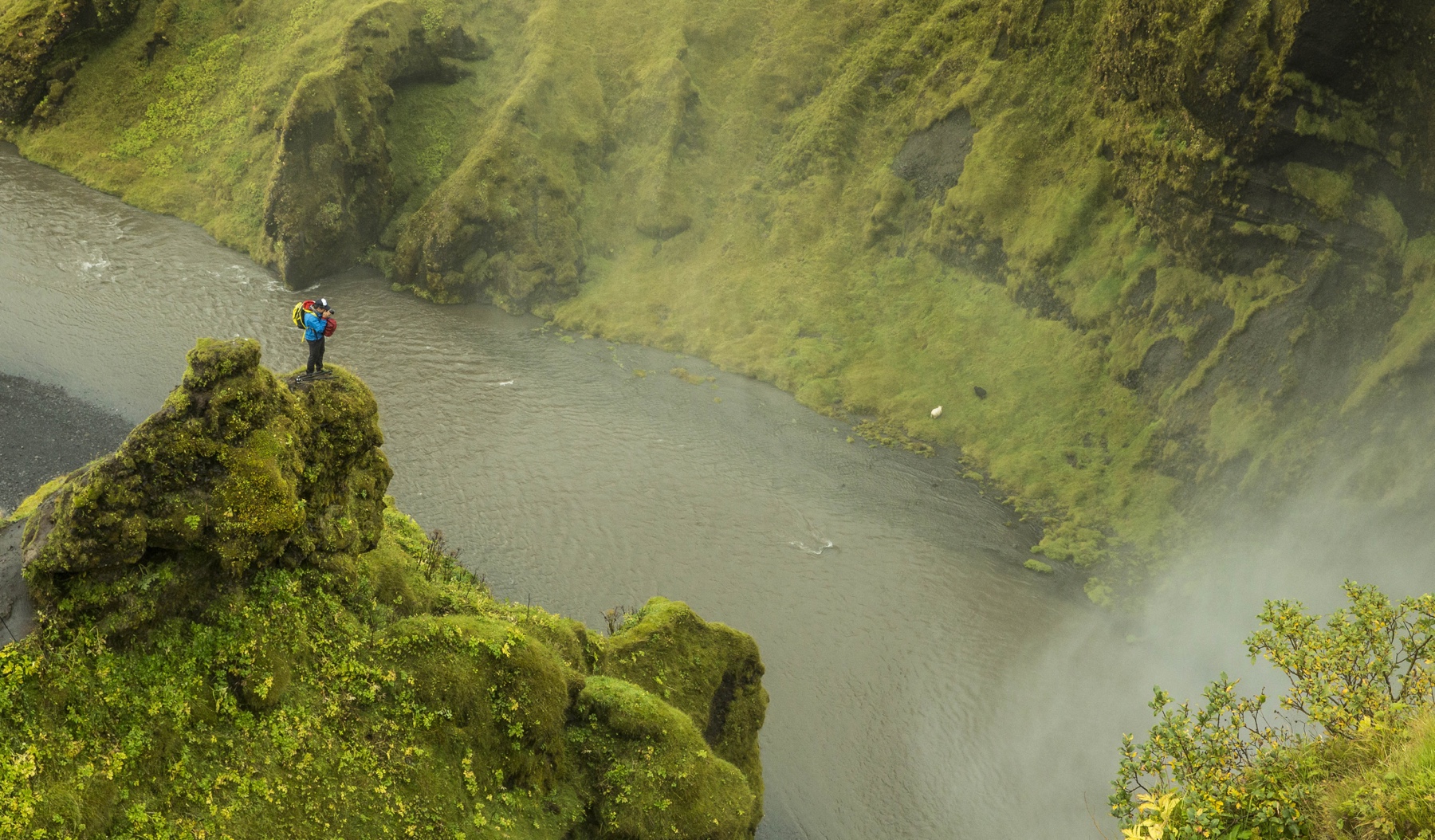
Pete McBride is an award-winning photographer and filmmaker whose work is regularly featured by National Geographic, Smithsonian, The Nature Conservancy, and other renowned institutions. His most recent book is titled Seeing Silence: The Beauty of the World’s Most Quiet Places, and it features photographs and stories from more than two decades of his adventures on all seven continents. Seeing Silence uses stunning imagery and engaging storytelling to highlight the importance of places free of man-made noise, and it educates the reader on just how quickly silence is disappearing from the world.
For more than twenty years, Pete has been using his skills as a storyteller to inspire action on a wide variety of conservation issues. He has highlighted the multitude of threats facing the Grand Canyon in both his documentary Into the Grand Canyon and his book Grand Canyon: Between River and Rim. He’s also documented the West’s ongoing water crisis by focusing on the myriad of challenges affecting the Colorado River basin–making the important but sometimes confusing topic of water in the West accessible to a broader audience. And now, with Seeing Silence, he’s turned his focus to noise pollution and natural sounds, and I personally learned a lot from the book and this conversation.
This is Pete’s second appearance on the podcast, so if you’d like to learn more about his personal backstory and adventures in the Grand Canyon, you can find a link to that conversation in the episode notes. In this conversation, we go deep into Pete’s new obsession with silence and natural sounds, and why noise pollution is such a critical conservation issue. We started out talking about Pete’s expedition to South Georgia Island back in March of 2020 and how he had to make a hasty escape from the island when Covid descended on the world. We talk about his experience during Covid, and how the pandemic shifted his interests from the visual to the auditory. We discuss how artificial noise affects wildlife, why Pete feels a responsibility not to share specific wilderness locations on social media, how Pete’s family keeps him grounded, the larger purpose that drives his professional work, his recent trips to Lake Powell, and we also included some sounds that Pete recorded during his South Georgia Island expedition.
It was great to chat with Pete again, and I’d encourage you to check out Seeing Silence– it’s an excellent book. And be sure the check out the episode notes for a complete list of all the topics we discussed and links to everything. Thanks to Pete for taking the time, and thanks to you for listening. I hope you enjoy!
Header photo and headshot courtesy of Pete McBride, book photo by Ed
—
Download on Apple Podcasts
—
Download on Spotify
—
Download on Google Podcasts
—
Download on Overcast
EPISODE NOTES
Topics Discussed:
- 3:30 – Where Pete was during the start of the pandemic
- 5:30 – Thousands of King Penguins
- 10:15 – How Pete, as an outgoing person, adjusted from a career of traveling for films to pandemic isolation
- 13:30 – An example that Pete observed of how pandemic silence affected wildlife
- 23:30 – Pete reflects on shifting his focus from more visual media to auditory
- 26:45 – Pete discusses a search for quiet and how human-made sound and industry impacts wildlife
- 32:30 – Pete and Ed discuss the impact of human-caused light pollution along with the impacts sound has on humans
- 36:45 – Pete describes why he became interested in sound
- 40:00 – Pete discusses the responsibility he feels as a photographer to not inspire destructive over-visitation of beautiful natural places
- 44:45 – Pete discusses how he and his family keep him humble and grounded despite widespread attention
- 49:45 – Pete talks about weaving adventure into work for conservation, and follows up on our first conversation regarding the state of water in the western US
- 59:30 – Pete gives us some conservation optimism
Information Referenced:
- Pete’s first visit on Mountain & Prairie
- Seeing Silence by Pete McBride
- South Georgia Island
- Ernest Shackleton
- King Penguins
- Falkland Islands
- Drake Passage
- Kevin Fedarko
- Roaring Fork Valley
- Rolling Stones
- Mick Jagger
- Jaque de Vos
- Svalbard
- Herring
- Swim bladders
- The Grand Canyon: Between River and Rim
- Colorado River Delta
- Gordon Hempton
- Maroon Bells-Snowmass Wilderness
- Independence Pass
- The End of Night by Paul Bogard
- San Juan River
- Pete’s NPR 1A interview
- Rick Ridgeway
- Yampa River
- Lake Powell
- Jonathan Wright
- Glen Canyon
- Lake Mead
- Flaming Gorge
- Len Necefer
- Glen Canyon Institute
- Desalination
- Kris Tompkins
Enjoy this episode? Then you might like these too:
- Rick Ridgeway – Purpose-Driven Adventurer
- Heather Hansman – Demystifying Water in the West
- Chris Burkard, Part 2 – Seeking Beauty Through Adventure
- Betsy Gaines Quammen – A Fascinating History of Public Lands in the West
- John Branch – Seeking the Extraordinary in the Ordinary
- Monte Burke – Exploring Obsession
- Mike Foote – Perfection is in the Process
- Steve Casimiro – Voice of Adventure
- Gabe Vasquez – Advocate for Equity in the Outdoors
Visit the podcast page for a full list of episodes where you can filter episodes by topic and guests’ vocations.
Rick Ridgeway – Purpose-Driven Adventurer
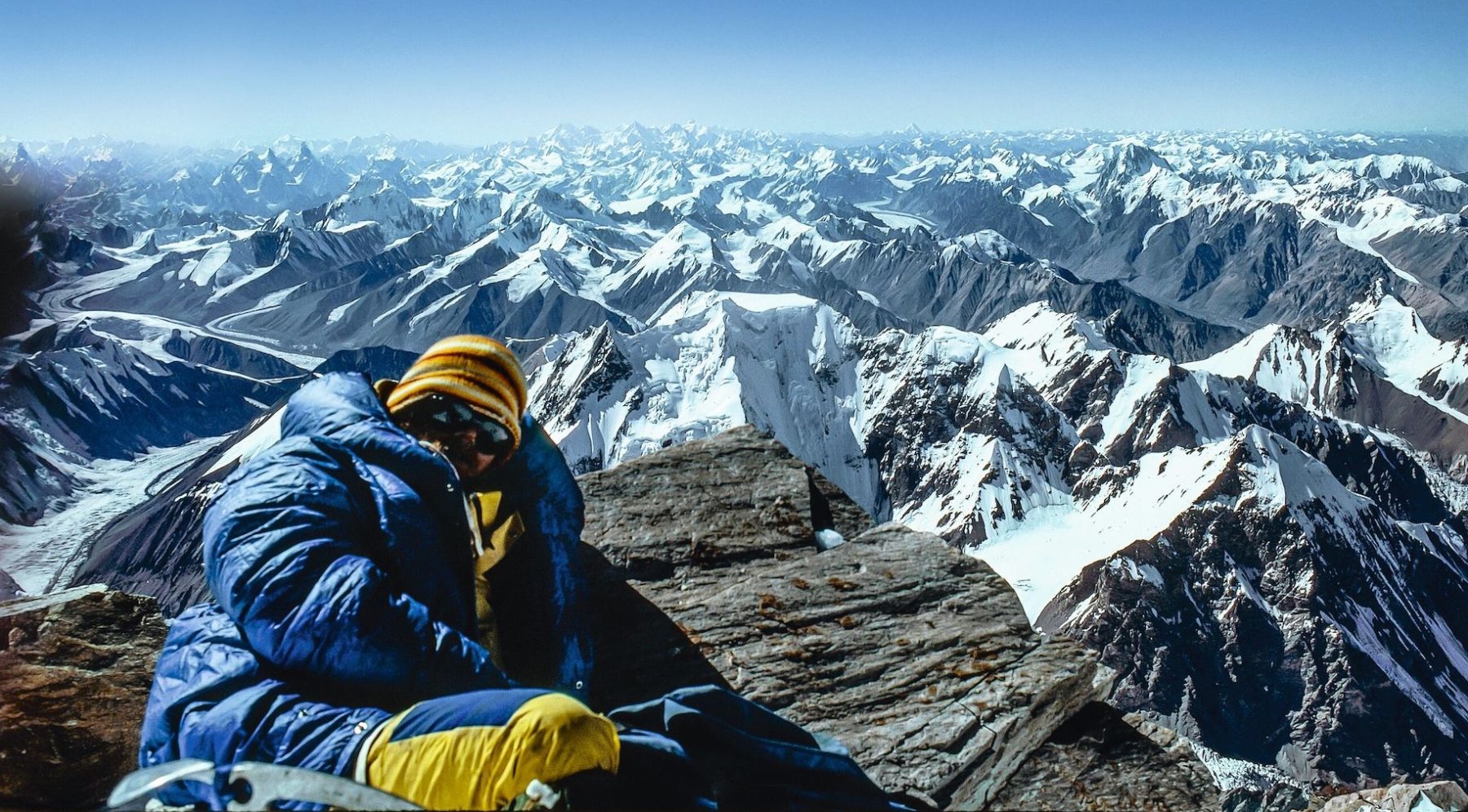
Rick Ridgeway is a world-renowned mountaineer and adventurer who has devoted his life to exploring some of the wildest regions of Planet Earth– from the summit of K2 to the jungles of Borneo to the mountain ranges of the American West and almost everywhere in between. Rick is also a highly regarded author, director, and producer who has written seven books and created numerous films and television shows. His newest book is titled Life Lived Wild: Adventures at the Edge of the Map, an excellent memoir that dives deep into his adventures, friendships, environmental advocacy, and pursuit of purpose-driven work.
Rick was born and raised in California, and when he was a teenager, his mother gave him a subscription to National Geographic, which ignited his passion for climbing and adventure. Early in his climbing career, Rick ticked off some unbelievably difficult climbs around the world, most notably being the first American to summit K2. But as he grew older and more experienced in the mountains, he shifted his focus away from pursuing adventure for adventure’s sake. Over time, he began to use his skills as an athlete and explorer to advance more purpose-driven causes such as wildlife conservation and environmental advocacy. Rick’s commitment to living a purpose-driven life is beautifully detailed in his new book Life Lived Wild, a book that I loved and highly recommend.
I had the pleasure of recording this conversation with Rick in person, just before a book signing at the Patagonia store in Denver. I have long admired Rick, and one of his earlier books played a huge role in my personal development, so it was an honor to have the opportunity to sit and talk with him for an hour. We started out discussing how and when he first began climbing and how he grew from an amateur climber into a world-class mountaineer. We talk a lot about mentorship– how he was mentored by climbing and environmental luminaries Yvon Chouinard and Doug Tompkins, and how he mentored many up-and-coming climbers, including Jimmy Chin. We talk about his commitment to taking action and being a doer, his success as an entrepreneur, and his 15-year tenure leading Patagonia’s sustainability initiatives. We talk about what brings Rick hope in the face of the climate crisis, how the pandemic affected him, and, as you’d expect from such a skilled writer, Rick offers tons of excellent book recommendations.
Huge thanks to Rick for taking the time to chat and to Patagonia Books for setting it all up. Meeting Rich was really a dream come true for me. I hope you enjoy.
Photos courtesy of Patagonia Books. Header by John Roskelley, portrait by Jimmy Chin.
This episode is brought to you thanks to the generous support of Ranchlands.
Visit www.ranchlands.com to learn more about their top-notch vacations, leather goods and apparel, or to explore their excellent blog, the “Ranchlands Review.”
THANK YOU, Ranchlands!
—
Download on Apple Podcasts
—
Download on Spotify
—
Download on Google Podcasts
—
Download on Overcast
EPISODE NOTES
Topics Discussed:
- 6:00 – A thank you to Rick
- 7:30 – Rick describes the moment he knew what he wanted to do when he grew up
- 13:30 – Rick talks us through his transition from climbing just for fun to using climbing to inform larger causes
- 21:30 – Rick talks about mentorship and what inspires him to be that kind of friend to people
- 29:15 – Rick talks about his experiences on the second American expedition on Everest and the first American expedition on K2 with his mentor, Jim Whittaker
- 32:00 – Rick explains the “do” mentality of Yvon Chouinard and Doug Thompkins
- 36:45 – Rick talks about his career shift from owning his own business to a job at an established company (Patagonia)
- 44:45 – Rick discusses how he finds balance between a business’s larger purpose and the details in its operation
- 48:30 – Rick talks about hope and climate change
- 56:00 – Rick talks about his lessons in exploration during the pandemic
- 1:00:15 – Rick’s book recommendations
Information Referenced:
- Life Lived Wild: Adventures at the Edge of the Map by Rick Ridgeway
- Seven Summits by Dick Bass, Frank Wells, and Rick Ridgeway
- Jim Whittaker
- National Geographic
- Sierra Nevadas
- Thunder Mountain
- Santa Ana River
- Outward Bound
- National Outdoor Leadership School (NOLS)
- Marin County
- Yvon Chouinard
- Doug Thompkins
- Jimmy Chin
- Conrad Anker
- Galen Rowell
- Brady Robinson
- Mountain Hardwear
- Alex Lowe
- Ventura, CA
- The North Face
- Fitz Roy Peak
- Osprey
- Sustainable Apparel Coalition
- The Higg index
- Dylan Tomine
- One Earth
- Leonardo DiCaprio Foundation
- Justin Winters
- Kris Thompkins
- Eric Goode
- Turtle Conservancy
- Rose Marcario
- The Snow Leopard by Peter Matthiessen
- Seven Pillars of Wisdom by T.E. Lawrence
- In Patagonia by Bruce Chatwin
- South by Ernest Shackleton
- For Whom the Bell Tolls by Ernest Hemingway
- Cormac McCarthy
- Silent Spring by Rachel Carson
- Desert Solitaire by Ed Abbey
- The Red Badge of Courage by Stephen Crane
Enjoy this episode? Then you might like these too:
- Dylan Tomine – Protecting What He Loves
- Luke Smithwick – A Life in High Places
- Chris Burkard, Part 2 – Seeking Beauty Through Adventure
- Elliott Woods – Stories from Dangerous Places
- Brendan Leonard, Part 2 – On Running, Creating, and Other Irrational Passions
- Iris Gardner – Living with Intention
- Heather Hansman, Part 2 – The Fascinating Story of Skiing’s Past, Present & Future
Visit the podcast page for a full list of episodes where you can filter episodes by topic and guests’ vocations.
Dr. Eric Arzubi – A New Approach to Solving the West’s Mental Health Crisis
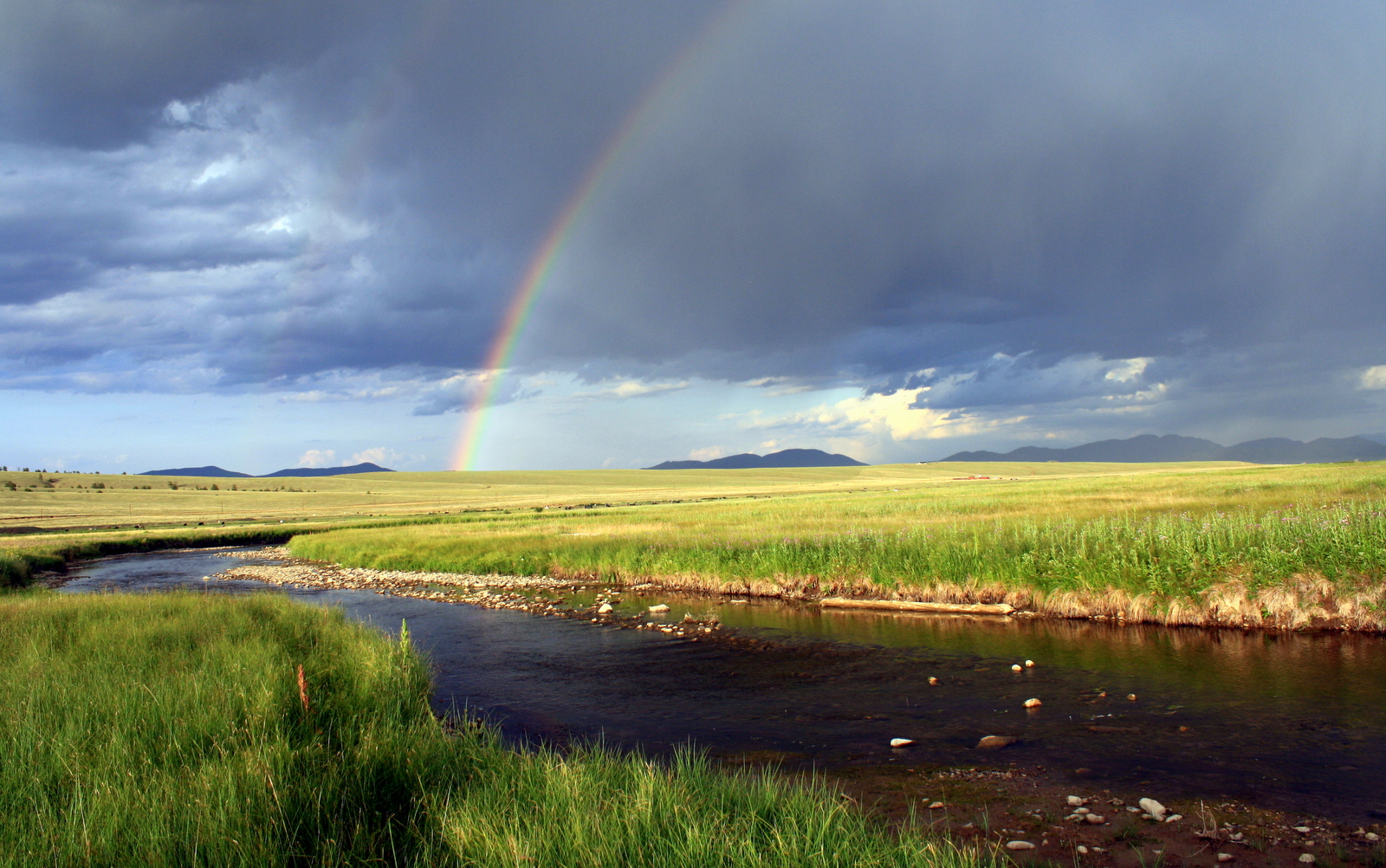
Dr. Eric Arzubi is the co-founder of Frontier Psychiatry, a Montana-based medical practice that is accelerating and expanding access to high-quality psychiatric care for rural communities.
By many metrics, Montana can be described as the epicenter of the United States’ mental health crisis. The large, mostly rural state is home to many vulnerable populations who are disproportionately affected by mental health concerns. And given Montana’s sprawling, lightly populated landscape, easy access to specialized and high-quality mental health care has been a significant challenge. But thanks to technological advancements and increased internet access, Eric and his team have successfully used telepsychiatry to reach underserved communities throughout Montana.
Eric’s path to becoming an innovator in rural medicine is an amazing, unexpected, and inspiring story. After graduating from college, he spent most of his twenties working as a Wall Street bond trader for Morgan Stanley, traveling the world and earning a great living. But despite his material success, he was unfulfilled with his career and felt a deep longing to do purpose-driven work that made the world a better place. So, at age 29, he decided to walk away from Wall Street and begin the long process of becoming a doctor– prerequisite courses, medical school, residency, and a fellowship in child psychiatry. At age 44, he landed his first job as a psychiatrist in Billings, Montana, where he fell in love with the people and place, and he began his quest to find solutions to the mental health crisis that plagues the rural West.
Mental health is a topic that is near and dear to my heart, so it was a real honor to have the opportunity to chat with Eric and learn about his innovative approach to solving such a complex societal challenge. We started out discussing his path to medicine– everything from why he decided to walk away from Wall Street to why he chose psychiatry as his specialty. We discuss the factors that have made Montana the epicenter of the mental health crisis, and what makes Frontier Psychiatry so uniquely qualified to help. We discuss approaches to scaling mental health care throughout the West, how Eric’s business and entrepreneurial background has helped him to find solutions to such a complex problem, and why it’s important for all of us to be advocates for mental health in our own communities. He also describes one of Frontier Psychiatry’s newest initiatives, a partnership with the Montana Department of Agriculture that provides free, confidential counseling to men and women working in agriculture in Montana.
Eric’s life story and his work are extremely inspiring and important, so I know you’ll enjoy this episode. Thanks to Eric for taking the time to talk, and thanks to you for listening.
Headshot courtesy of Eric Arzubi
—
Download on Apple Podcasts
—
Download on Spotify
—
Download on Google Podcasts
—
Download on Overcast
—
This episode is brought to you by The Arthur M. Blank Family Foundation and its Montana-based AMB West Philanthropies, both of which embody the values-based approach to philanthropy and business of their Chairman Arthur M. Blank
EPISODE NOTES
Topics Discussed:
- 4:00 – Eric describes what he was doing when he was 28
- 6:00 – Eric talks about his change of heart at age 29
- 12:00 – Eric discusses his friends’ and family’s reaction to his career shift, and how one staff member at Morgan Stanley gave him the courage and space to pursue his medical career
- 16:00 – Eric talks about how psychiatry caught his attention
- 21:45 – Eric explains how he ended up in Montana
- 32:30 – Eric talks about what makes Frontier Psychiatry special
- 37:30 – Eric discusses how his nontraditional career path may have helped him challenge established practices in the field of mental healthcare
- 41:45 – Eric talks about the balance in his work between addressing distinct issues and deep, underlying problems
- 48:45 – Eric discusses what gives him hope that there are scalable solutions for mental health challenges, especially in rural communities
- 55:00 – Eric explains the role that untrained citizens can play in advocating for/supporting mental health
- 1:02:45 – Eric’s book recommendations
- 1:07:30 – Eric’s parting words of wisdom
Information Referenced:
- Eric’s TED talk
- Frontier Psychiatry
- Morgan Stanley
- The Hamptons
- American Academy of Pediatrics
- Philips
- Billings Clinic
- Adverse Childhood Experiences
- Nurse-Family Partnership
- National Alliance on Mental Illness
- Mental Health America
- Healing: Our Path from Mental Illness to Mental Health by Thomas Insel
- National Institute of Mental Health
- The Voltage Effect by John A. List
- The Culture Engine by Chris Edmonds
- Counseling Access for Montana Ag
Enjoy this episode? Then you might like these too:
- Matt Pierson – Finding New Solutions for Food Insecurity
- Liz Moore – For the Love of Montana
- NEW WEST DISPATCH – Marci McLean & Cora Neumann on COVID’s Impact on Native Communities
- Shane Doyle – Reverence for the Past, Hope for the Future
- Iris Gardner – Living with Intention
- Chris La Tray – Rediscovering His Past, Writing His Future
- Kate Kavanaugh – Regeneration & Restoration
- Mike Foote – Perfection is in the Process
- Jason Gardner – A Life of Purpose & Service
The Life-Changing Magic of Living Strenuously, with Kate Kavanaugh
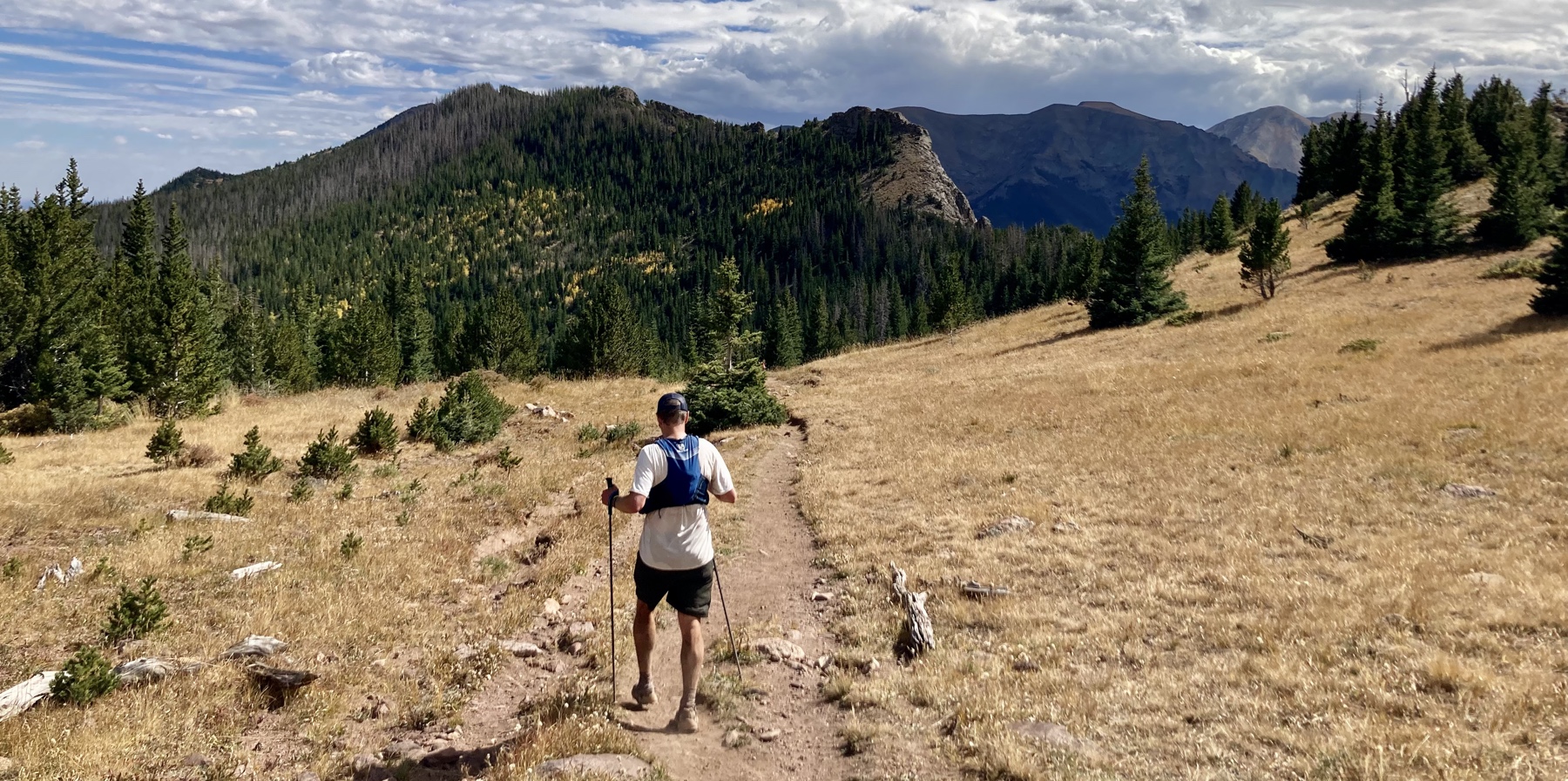
This episode is a little different– it’s me being interviewed by my friend and past Mountain & Prairie podcast guest Kate Kavanaugh. If you’ve been listening for a while, then I’m sure you remember Kate– she’s a farmer, butcher, and all-around interesting woman who co-founded Western Daughters Butcher Shop in Denver.
Kate recently started an excellent new podcast called Ground Work, which covers a variety of interesting topics, from soil to health to books to intentional living. Kate is unbelievably smart and insightful, and there’s a ton of overlap between what I’m doing with M&P and what she’s doing with Ground Work, so I’d encourage you to check out all of her episodes. There’s a link in the notes.
Even though I’m still confused as to why anybody would ever want to interview me, Kate did and we had a fun conversation about everything from conservation to ultra running, reading to starting a podcast. We also talk a lot about my obsession with living what Theodore Roosevelt called the Strenuous Life, and how adopting that approach to life has been life-changing for me.
And speaking of the Strenuous Life, I just launched a new section of the website devoted to The Strenuous Life and offering ways for the Mountain & Prairie community to connect and collaborate in the spirit of “Living Strenuously.” Rather than try to explain it all here, I’d encourage you to click over to learn more about all the details.
Thanks for listening. Hope you enjoy this and all of Kate’s podcast episodes. And I hope you’ll be able to join some of the M&P community in our commitment to living the Strenuous Life. Enjoy!
- Kate’s GROUND WORK podcast
- Strenuous Living on Mountain & Prairie
- Mountain & Prairie on Strava
- Mountain & Prairie on Goodreads
- Annual Strenuous Life Retreat
—
Download on Apple Podcasts
—
Download on Spotify
—
Download on Google Podcasts
—
Download on Overcast
“I wish to preach, not the doctrine of ignoble ease, but the doctrine of the strenuous life, the life of toil and effort, of labor and strife; to preach that highest form of success which comes, not to the man who desires mere easy peace, but to the man who does not shrink from danger, from hardship, or from bitter toil, and who out of these wins the splendid ultimate triumph.”
Theodore Roosevelt
May 2022 Book Club: AMERICAN ZION
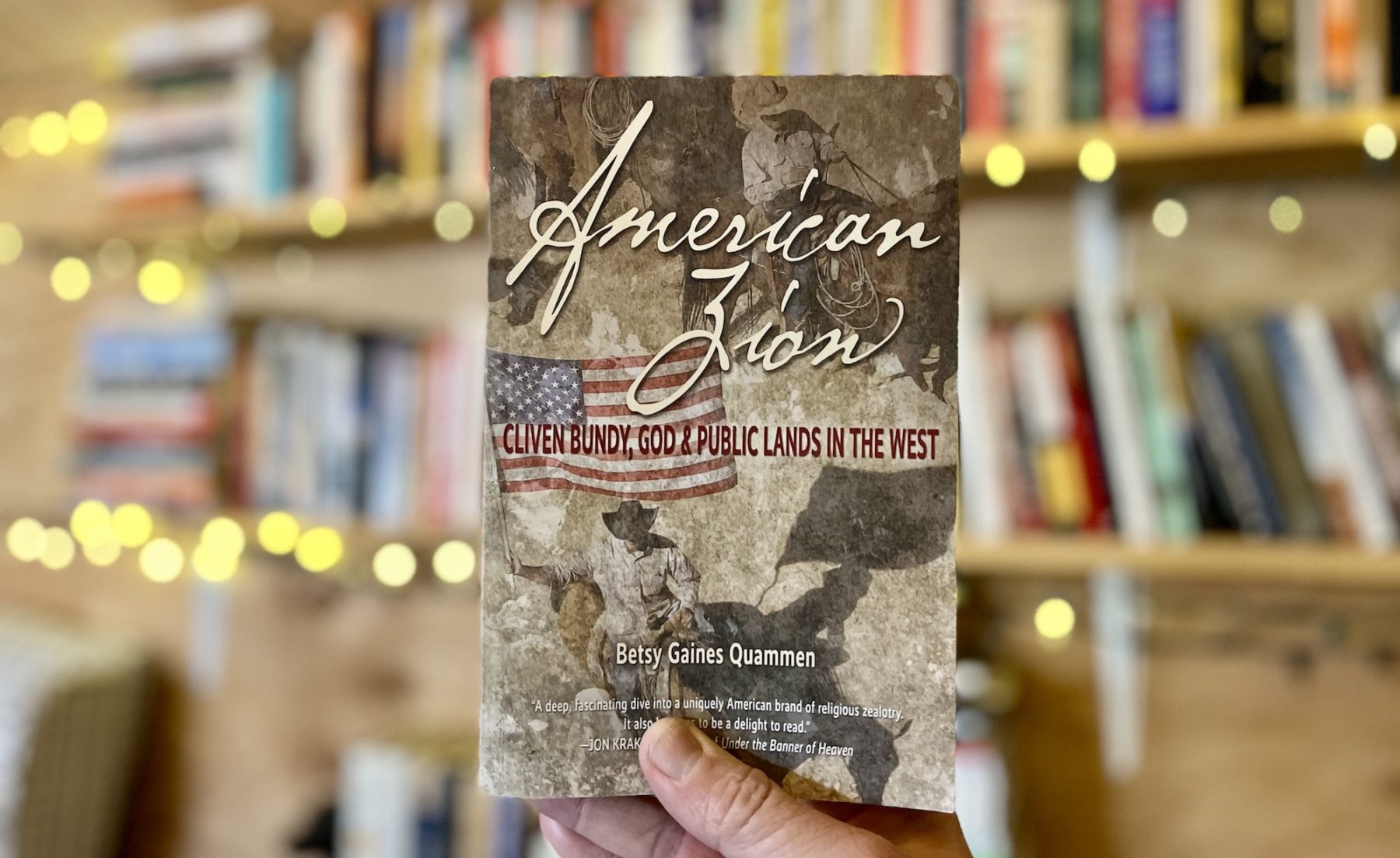
After a nearly four-year hiatus, the Mountain & Prairie Book Club is back!
In honor of my recent podcast conversation with historian and conservationist Betsy Gaines Quammen, the May 2022 Book Club Selection is:
American Zion: Cliven Bundy, God, & Public Lands in the West.
Head over to the Mountain & Prairie Goodreads page to join in on the discussion.
 332 members
332 membersBook club for the Mountain & Prairie community. A wide range of titles that explore the complex culture of the American West. https://www.mountainandprairie.com
If you haven’t already, I’d encourage you to listen to my conversation with Betsy.
You can also watch her TED talk:
And here are my thoughts on the book, as written in my March-April 2022 book recommendations email:
“This book had been high on my need-to-read list since its publication back in the spring of 2020. Nearly all of my friends who work in public lands conservation/advocacy had repeatedly told me that I needed to read it immediately. Well, I quit procrastinating and finally did, and I loved it. It’s the story of the Mormon settlement of the American West, and how certain subsets of the religion have shaped many of the present-day battles over public lands around the country. What I appreciated most about American Zion is how it connected the dots between the many books, podcasts, and articles I’ve consumed over the years about everything from the Mormons’ cross-country journey in search of their “Zion,” all the way to the recent Malheur Wildlife Refuge occupation by the Ammon Bundy and his lackeys. The book offers a clear, fair narrative that gave me a new appreciation for the power of belief and the ripple effects that a few charismatic individuals can have on entire societies.“
I’ll look forward to discussing the book with you all over on Goodreads!!
Land Tawney – Energetic & Optimistic
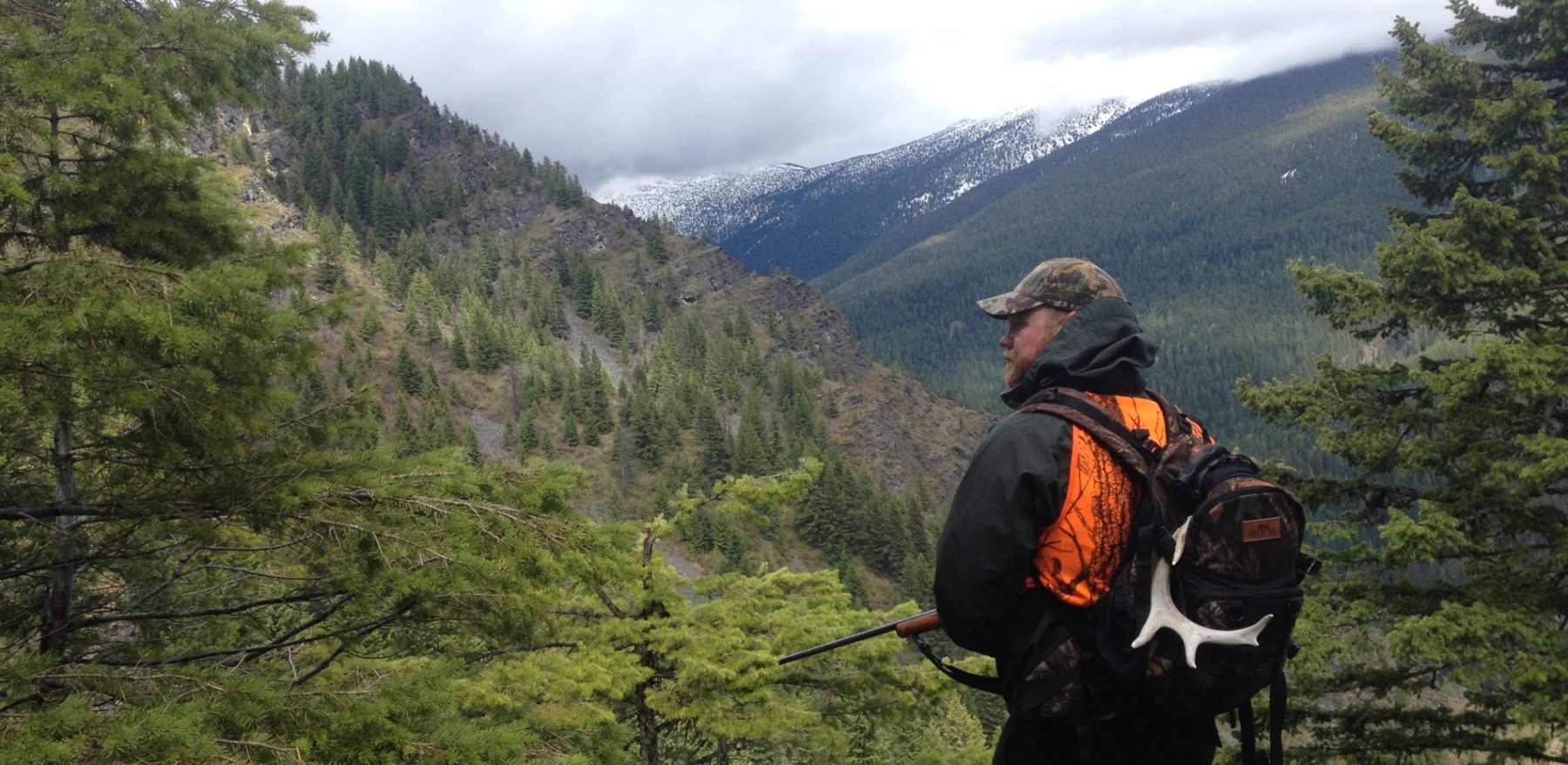
Land Tawney is the President and CEO of Backcountry Hunters and Anglers, one of North America’s leading and most effective advocates for wild public lands, waters and wildlife. Founded around a campfire in 2004, BHA uses education, nonpartisan political advocacy, stewardship initiatives, and stakeholder coalitions to ensure the protection of our public lands for generations to come. As its name implies, BHA is an organization that works on behalf of sportsmen, but you don’t have to be a hardcore hunter or fisherman to benefit from its work. I’m a lot of things, but a hardcore hunter is not one of them– yet, I’m a proud member of BHA and a super-fan of all that it has accomplished.
Land was born and raised in Montana, the son of two highly respected conservationists who instilled in him a deep reverence for wild places and the importance of protecting them. From an early age, Land was hunting, fishing, and spending time around his parents’ friends and colleagues, many of whom were well-known, renowned conservationists. When Land was in college, his father passed away, which fortified his desire to devote all of his professional energy to conserving the wild places that have always meant so much to his family. After successful stints at several notable conservation organizations, Land took the helm of BHA in 2013. Since then, he has led and grown the organization into one of the country’s leading voices for sportsmen and public land protectors.
When Land and I connected for this conversation, he was hard at work preparing for the upcoming BHA Rendezvous, which is taking place May 12-14, 2022 in Missoula, Montana. We discuss all of the details of that premiere conservation event, and you can find additional information in the notes and on this episode’s webpage. And we also covered a ton of interesting and important topics, including: the importance of advocating for conservation in Washington, DC; how apathy can be a huge threat to our wild lands; the slippery-slope threat of transferring federal lands to state or private entities; the importance of remaining optimistic in the face of challenges; how BHA helps and encourages new hunters; the importance of BHA’s state chapters and local leadership; Land’s personal and professional conservation journey; and, of course, he offers tons of great book recommendations.
A huge thanks to Land for joining me during such a busy time of year. And I encourage all of you to check out BHA’s membership options and consider supporting them if you are so inclined. I deal with conservation organizations all day in both my podcast and conservation work, and BHA is the best of the best. Hope you enjoy this episode.
Header photo courtesy of Land Tawney and BHA, portrait by Maggie Hamilton
This episode is brought to you thanks to the generous support of Ranchlands.
Visit www.ranchlands.com to learn more about their top-notch vacations, leather goods and apparel, or to explore their excellent blog, the “Ranchlands Review.”
THANK YOU, Ranchlands!
—
Download on Apple Podcasts
—
Download on Spotify
—
Download on Google Podcasts
—
Download on Overcast
EPISODE NOTES
Topics Discussed:
- 6:30 – Land talks about Backcountry Hunters and Anglers
- 12:30 – Land discusses his plan for when he advocates for conservation issues in DC
- 17:15 – Land describes what he thinks is the greatest threat to public lands that folks should be aware of
- 20:15 – Land explains his concern with transferring ownership of public lands to state or private entities
- 23:30 – Land talks about how he maintains a healthy level of skepticism in his advocacy work without becoming jaded
- 27:15 – Land explains the function and importance of BHA’s state chapters
- 30:15 – Land talks about BHA programs that encourage new hunters and anglers
- 36:15 – Land talks about his childhood and the role that the outdoors played in it
- 40:45 – Land discusses his first job out of college
- 44:15 – Land talks about the common threads he noticed in his conservation mentors
- 48:15 – Land describes the BHA Rendezvous
- 58:15 – Land’s book recommendations
Information Referenced:
- Backcountry Hunters and Anglers
- BHA Rendevous 2022
- Trout Unlimited
- Rocky Mountain Elk Foundation
- Pheasants Forever
- Ducks Unlimited
- BHA Armed Forces Initiative
- BHA Collegiate Program
- Land Trust Alliance
- LTA’s Advocacy Days
- Cory Gardner
- Recovering America’s Wildlife Act
- Pittman–Robertson Federal Aid in Wildlife Restoration Act
- Duck Stamps
- Kingfisher
- American Dipper
- Great Blue Heron
- Theodore Roosevelt Conservation Partnership
- Jim Range
- Mike Lee
- The HOUSES Act
- The Federal Land Transaction Facilitation Act
- Adam Gall
- National Wild Turkey Federation
- BHA’s Hunting for Sustainability Program
- BHA’s Women in the Woods Initiative
- BHA Membership
- A River Runs Through It by Norman Maclean
- Blackfoot River
- Clark Fork River
- Bitterroot River
- Patty Canyon
- Duck blind
- Conservation Easements
- Long Eared Owls
- Howard Vincent
- Smith River
- Theodore Roosevelt biography trilogy by Edmund Morris
- The Rendezvous
- Rachel Schmidt
- Tyson Running Wolf
- Rue Mapp
- Outdoor Afro
- David Wise
- Clay Hayes
- Alone
- Mark Kenyon
- Meat Eater
- Jonathan Wilkins
- North American Wildlife Model
- Hal Herring: BHA Podcast & Mountain and Prairie
- Ranch Life and the Hunting Trail by Theodore Roosevelt
- American Sportsmen and the Origins of Conservation by John F. Reiger
- Gifford Pinchot
- Where the Crawdads Sing by Delia Owens
- Otherlands by Thomas Halliday
- Lake Missoula
Enjoy this episode? Then you might like these too:
- Hal Herring – A Man of Words & Wild Places
- Mark Kenyon – A Passion for Public Lands
- Reflections On My First Elk Hunt, with Adam Gall
- Alexis Bonogofsky – Taking a Stand for the West
- Gabe Vasquez – Advocate for Equity in the Outdoors
- Jessica Wahl Turner – Outdoor Recreation & Rural Economies
- Rachel VandeVoort – Harnessing the Power of Outdoor Recreation
- Jason Gardner – A Life of Purpose & Service
- Kelsey Johnson – Chasing Her Artistic Ambitions
- Iris Gardner – Living with Intention
Visit the podcast page for a full list of episodes where you can filter episodes by topic and guests’ vocations.
Betsy Gaines Quammen – A Fascinating History of Public Lands in the West
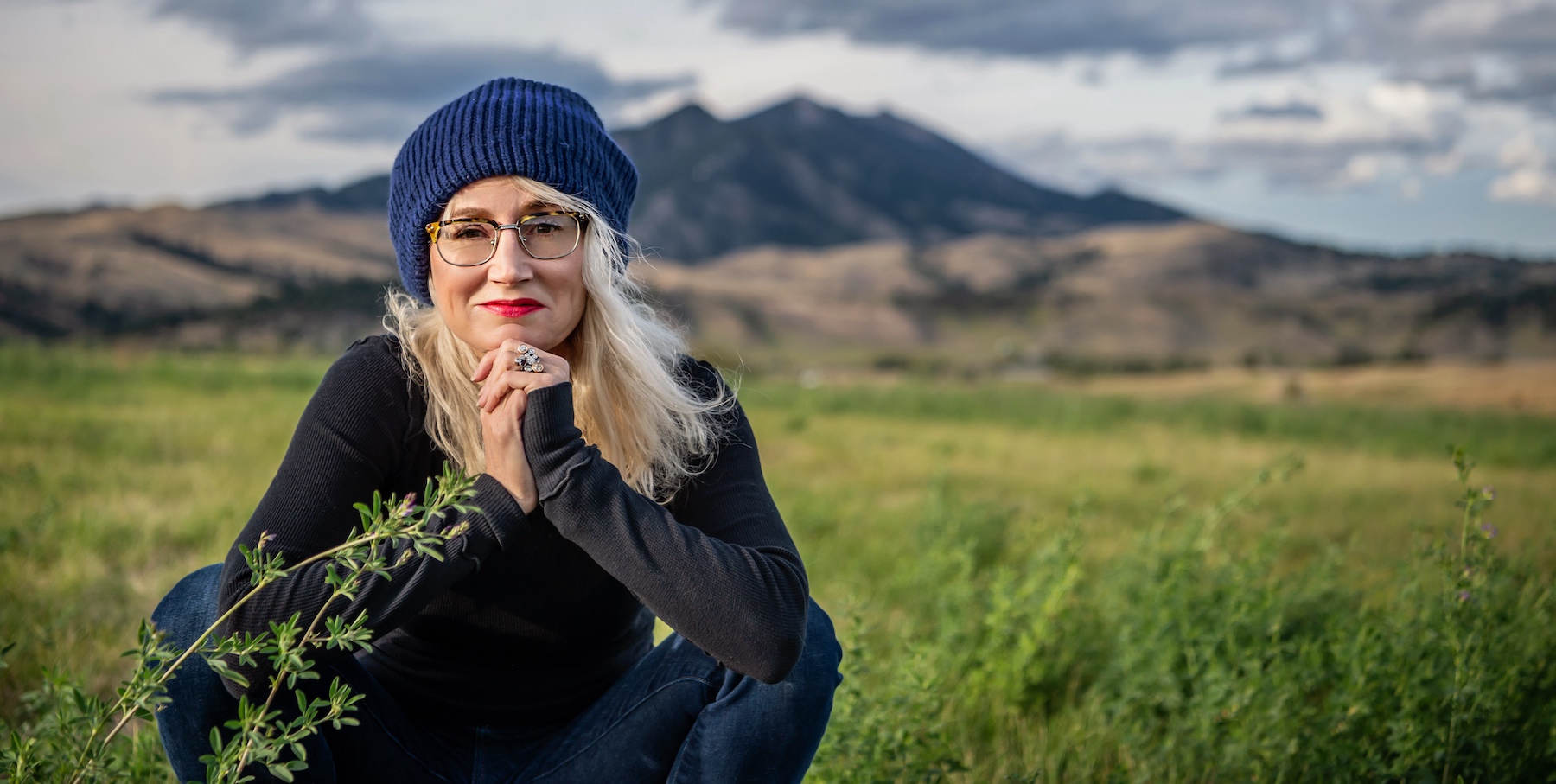
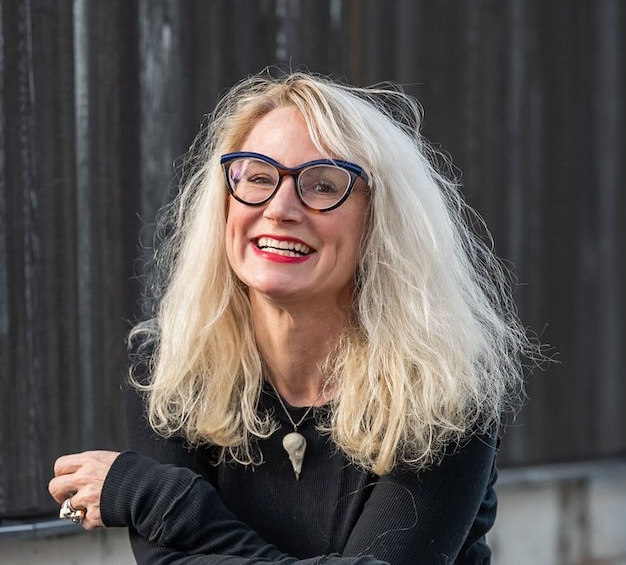
Betsy Gaines Quammen is a historian and conservationist, and she’s also the author of the excellent book American Zion: Cliven Bundy, God, & Public Lands in the West. Betsy has enjoyed a long career in the conservation world, working on issues ranging from grizzly bears in the West to fish in Mongolia to wildlife in East Africa. She also holds a doctorate in Environmental History from Montana State University, where her dissertation focused on the Mormon settlement of the West and public land conflicts. With such a depth of expertise on such a wide range of subjects, I was thrilled to have Betsy join me for a conversation about her book, public lands, and the West.
American Zion had been recommended to me numerous times since it was published in early 2020. Many of my most knowledgeable friends told me it was a must-read for anyone trying to make sense of the present-day threats to public lands here in the West. Well, I finally read it a few weeks ago, and I can confirm that my friends were correct– the book provided me with much-needed, nuanced context for understanding both specific public lands controversies and broader political threats. It also provided fascinating insights into the mindsets and goals of the Bundy family– the people behind the infamous occupation of Malheur Wildlife Refuge and the Battle of Bunkerville. I was also fascinated by the beliefs of the Bundys and their ancestors, and how their ideas about everything from religious texts to the US Constitution have influenced public discourse in the West and beyond.
Betsy and I connected last week and had a fun and educational conversation about everything from her career as a conservationist to her in-person interactions with the Bundy family. We started out discussing how she became interested in the West and why the Morman settlement of the West became the focus of her work. We discuss the Mormon prophets Joseph Smith and Brigham Young, and how and why Mormons settled in the West. We talked about how perceived persecution by the US government has served as a faith-building experience for the Bundys and their followers, and whether or not the Bundys truly believe the prophesies that they preach. We discuss the Sagebrush Rebellion, the Malheur takeover, the Battle of Bunkerville, and how Betsy thinks about her personal safety when writing about potentially violent people. She also talks about how American Zion was positively received by her Mormon friends, describes her current book project, and recommends tons of books that you’ll want to check out. Links to everything are in the episode notes.
It was great to finally have the opportunity to chat with Betsy, and I sincerely appreciate her taking the time. Hope you enjoy it as much as I did.
Top photos courtesy of Betsy Gaines Quammen, book photo by Ed
LISTEN:
—
Download on Apple Podcasts
—
Download on Spotify
—
Download on Google Podcasts
—
Download on Overcast
EPISODE NOTES:
Topics Discussed:
- 6:00 – Betsy reads her opening paragraph from her book American Zion
- 8:45 – Betsy explains how she became interested in the western US
- 10:00 – Betsy talks about why she began looking into Mormon history in the western states
- 14:45 – Betsy talks about her research and interactions regarding the Bundy family and their anti-federal government activities
- 22:00 – Betsy discusses the history of the Church of Jesus Christ of Latter Day Saints and how that impacted many rural attitudes towards land management and the federal government
- 27:00 – Betsy discusses her personal interactions with Cliven Bundy
- 31:00 – Betsy explains the depth of the Bundy’s faith and how that plays out in their political and anti-government action
- 31:30 – Betsy talks about the Bundys’ action after she published her book and explores the differences between the Malheur and Bunkerville incidents
- 34:00 – Betsy talks discusses the implications of her writing for her personal safety
- 35:45 – Betsy explains why any public land user should care about what the Bundys are doing.
- 40:45 – Betsy explains how anti-Semitism and the Sagebrush Rebellion laid the groundwork for the misinformation that is rampant today
- 46:00 – Betsy talks about how her book was received by her Mormon friends
- 50:30 – Betsy discusses her current work
- 52:45 – Betsy’s recommended books about the West
- 1:03:00 – Betsy’s parting words of wisdom
Information Referenced:
- Betsy Gaines Quammen
- American Zion by Betsy Gaines Quammen
- Evergreen, CO
- Colorado Springs, CO
- Colorado College
- Nairobi, Kenya
- Doug Peacock
- Church of Jesus Christ of Latter Day Saints – LDS, Mormons
- Terry Tempest Williams
- Under the Banner of Heaven by John Krakauer
- New TV series based on the book
- Bundyville
- Sarah Dant, Weber State
- Weber State University
- Malheur Wildlife Refuge
- Occupation
- https://en.wikipedia.org/wiki/Cliven_Bundy
- Ammon Bundy
- Joseph Smith
- Zion
- Zion National Park
- Sagebrush Rebellion
- Bunkerville, NV
- The Battle of Bunkerville
- The Wilderness Act
- The Endangered Species Act
- Monroe Mountain
- Piute County
- Q-Anonymous conspiracy theories
- Cleon Skousen
- Glenn Beck
- John Birch Society
- Stewart Rhodes, Oathkeepers
- January 6th insurrection
- Mitt Romney
- Mike Lee
- Gretchen Whitmer
- Burns, OR
- The Rothschilds
- 1992 UN Earth Summit to Address Sustainability in the 21st Century
- Agenda 21
- California dad killed his kids over QAnon and ‘serpent DNA’ conspiracy theories, feds claim
- LDS statement about the occupation of the Malheur Wildlife Refuge
- Logan, UT
- Fools Crow by James Welch
- Blackfeet Nation
- Close Range: Wyoming Stories by Annie Proulx
- Includes Brokeback Mountain by Annie Proulx
- Ceremony by Leslie Marmon Silko
- Pueblo of Laguna
- Deb Haaland
- House Made of Dawn by N. Scott Momaday
- Kiowa Tribe
- Chris La Tray
- Annie Helen Peterson
- Hal Herring
- Fifty-Six Counties by Russel Roland
- The Mountain Meadows Massacre by Juanita Brooks
- Rick Bass
- Torrey House Press
- Amy Irvine
- David Gessner
- Patagonia Books
- Fantasyland by Kurt Andersen
Enjoy this episode? Then you might like these too:
- Shane Doyle – Reverence for the Past, Hope for the Future
- Adam Gall – A Reverence for Wildlife & Wild Places
- Chris La Tray – Rediscovering His Past, Writing His Future
- Hal Herring – A Man of Words & Wild Places
- Mark Kenyon – A Passion for Public Lands
- Heather Hansman, Part 2 – The Fascinating Story of Skiing’s Past, Present & Future
- Sara Dant – A Deep Dive Into the History of the West
- David Gessner, Part 3 – A Confluence of Conservation Ideals
- Becky Edwards – Amplifying the Power of Women in the West
Visit the podcast page for a full list of episodes where you can filter episodes by topic and guests’ vocations.
Brian Yablonski – Action-Oriented Conservationist
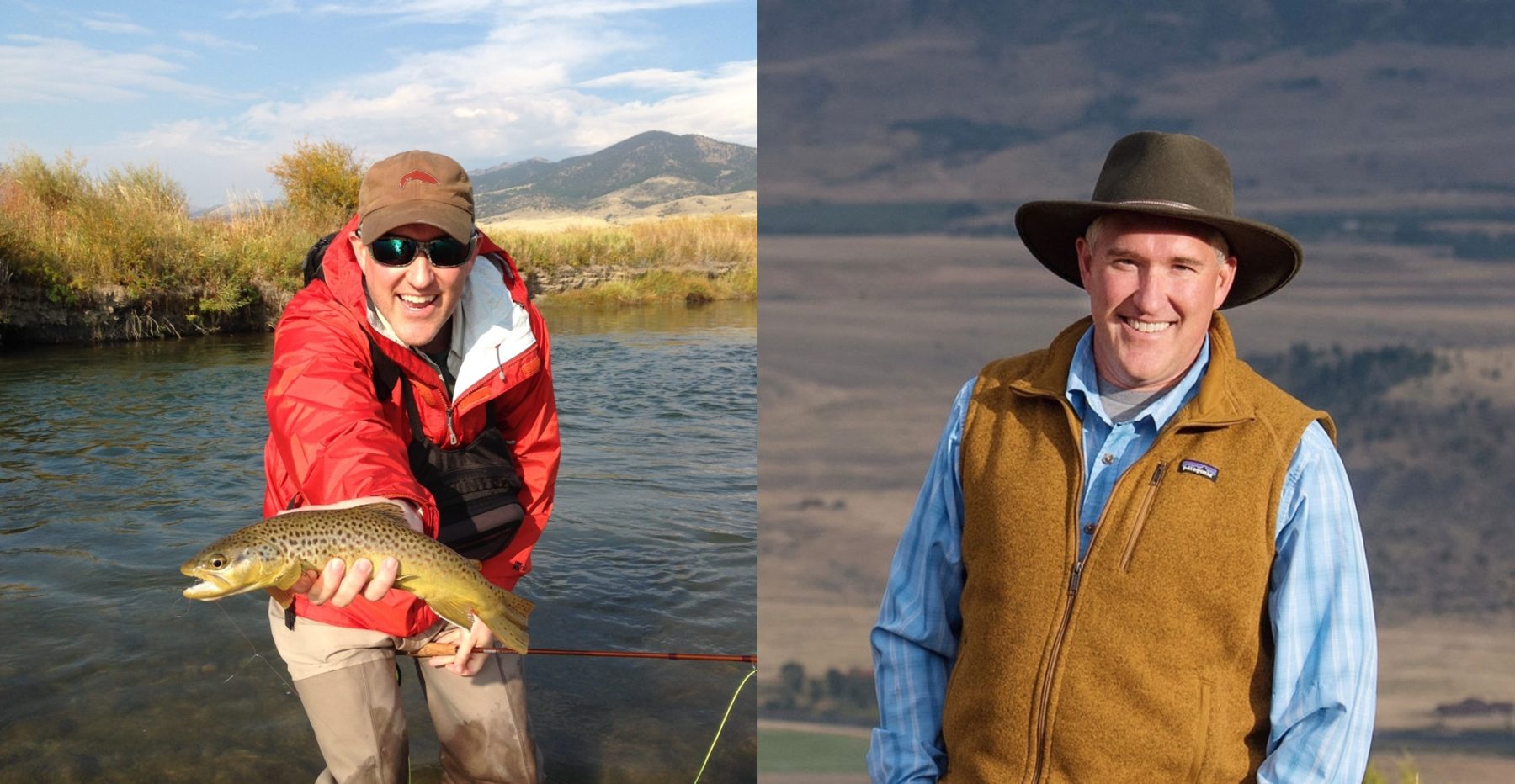
Brian Yablonski is the Chief Executive Officer of the Property and Environment Research Center (“PERC”), a Bozeman-based research institute dedicated to promoting conservation by exploring how voluntary trade can produce positive environmental outcomes. For more than 40 years, PERC has explored market-based solutions for major conservation challenges throughout the West, and its current initiatives focus on innovative approaches for wildlife conservation, public lands management, and more. For example, PERC recently collaborated with the Greater Yellowstone Coalition and a ranching family in Paradise Valley, MT, to enact a first-of-its-kind elk occupancy agreement, which offers a new, win-win method for managing the sometimes-competing needs of livestock and wildlife.
Brian was born and raised on the east coast, and, prior to taking the helm at PERC, he enjoyed a successful career in public policy, business, and conservation. In 2018, he moved to Bozeman to lead PERC into its next chapter of conservation innovation in the West. As you’ll hear in this conversation, Brian has a deep respect for research, economic theory, and big ideas created by scholars and conservation professionals. But he is equally if not more, committed to putting these ideas into action– to making a tangible difference on the ground, throughout the communities of the West. In my experience, it can be difficult to find organizations that balance scholarly rigor with a commitment to execution, so it was a pleasure to speak with Brian and learn more about PERC’s unique approach to conservation.
Brian and I actually attended the same college in North Carolina, so it was fun to connect with a fellow Wake Forest Demon Deacon to discuss conservation here in the West. We started out discussing the history of PERC, and how and why the organization was founded back in 1980. We talked in detail about the elk occupancy agreement and how this new approach to wildlife and habitat management could be scaled throughout the West. We discuss the all-important role that private landowners play in wildlife and land conservation, and how market-based solutions can create new tools for finding win-win solutions. We discuss PERC’s work exploring the financial sustainability of National Parks, as well as PERC’s history of collaboration with a wide range of nonprofit and governmental entities. Brian shares his thoughts on the ideal role that government can play in conservation, and he discusses a few success stories of his careering in conservation. And as usual, we talk about book recommendations, and Brian offers up some great ones.
I’ve been following PERC’s work in the West for quite some time, so I thoroughly enjoyed being able to learn more about the organization directly from Brian. There are a lot of excellent resources mentioned in the episode, including some films that PERC has produced, so be sure to check out the notes for links to everything. Hope you enjoy!
Photos courtesy of Brian Yablonski and PERC
LISTEN:
—
Download on Apple Podcasts
—
Download on Spotify
—
Download on Google Podcasts
—
Download on Overcast
EPISODE NOTES:
Topics Discussed:
- 4:30 – Brian talks us through the history and work of the Property and Environment Research Center (PERC)
- 7:45 – Brian discusses the Elk Occupancy Agreements PERC has entered with the Greater Yellowstone Coalition
- 24:15 – Brian talks about how the Elk Occupancy Agreements model could be scaled up to incentivize conservation on a broader scale
- 29:30 – Brian discusses the balance he and PERC have to strike between high-level strategic thinking and on-the-ground implementation
- 35:15 – Brian talks about PERC’s partnership with the Environmental Defense Fund
- 38:30 – Brian describes what he believes the ideal role of government is, especially in conservation
- 42:45 – Brian talks about the work PERC is doing with National Parks
- 54:15 – Brian discusses his conservation work in Florida
- 1:00:15 – Brian’s book recommendations
- 1:08:00 – Brian’s parting words of wisdom
Information Referenced:
- The Property and Environment Research Center (PERC)
- PERC on YouTube
- Elk in Paradise
- PERC and National Parks
- Wake Forest University
- Elk Occupancy Agreements
- Greater Yellowstone Coalition
- Arthur Middleton
- Cody, WY
- Brucellosis in cattle
- Western Landowners Alliance
- National Elk Refuge
- Paradise Valley, MT
- Absaroka-Beatooth Wilderness
- Fescue grass
- Timothy grass
- The Nature Conservancy
- Ducks Unlimited
- Environmental Defense Fund
- Paradise Valley Working Lands
- Chris Costello
- Great American Outdoors Act
- Kruger National Park
- Pelican Island
- Critical Wildlife Area
- Coastal Conservation Association
- American Sportfishing Association
- The Bonefish and Tarpon Trust
- Undaunted Courage by Steven E. Ambrose
- American Big Game Hunting: the Book of the Boone and Crockett Club by Theodore Roosevelt and George Bird Grinnell
- Boone and Crockett Club
- Ted Turner
- Rough Riders
- Todd Wilkinson
- Mountain Journal
- Aldo Leopold
Enjoy this episode? Then you might like these too:
- Kate Mannix – A Legacy of Land Stewardship
- Heather Hansman, Part 2 – The Fascinating Story of Skiing’s Past, Present & Future
- Matt Pierson – Finding New Solutions for Food Insecurity
- Shane Doyle – Reverence for the Past, Hope for the Future
- Antonia Malchik – Exploring Culture & Complexity
- NEW WEST DISPATCH – Marci McLean & Cora Neumann on COVID’s Impact on Native Communities
- Carlos Fernandez – The Power of Partnerships
- Rachel VandeVoort – Harnessing the Power of Outdoor Recreation
Visit the podcast page for a full list of episodes where you can filter episodes by topic and guests’ vocations.
Dylan Tomine – Protecting What He Loves
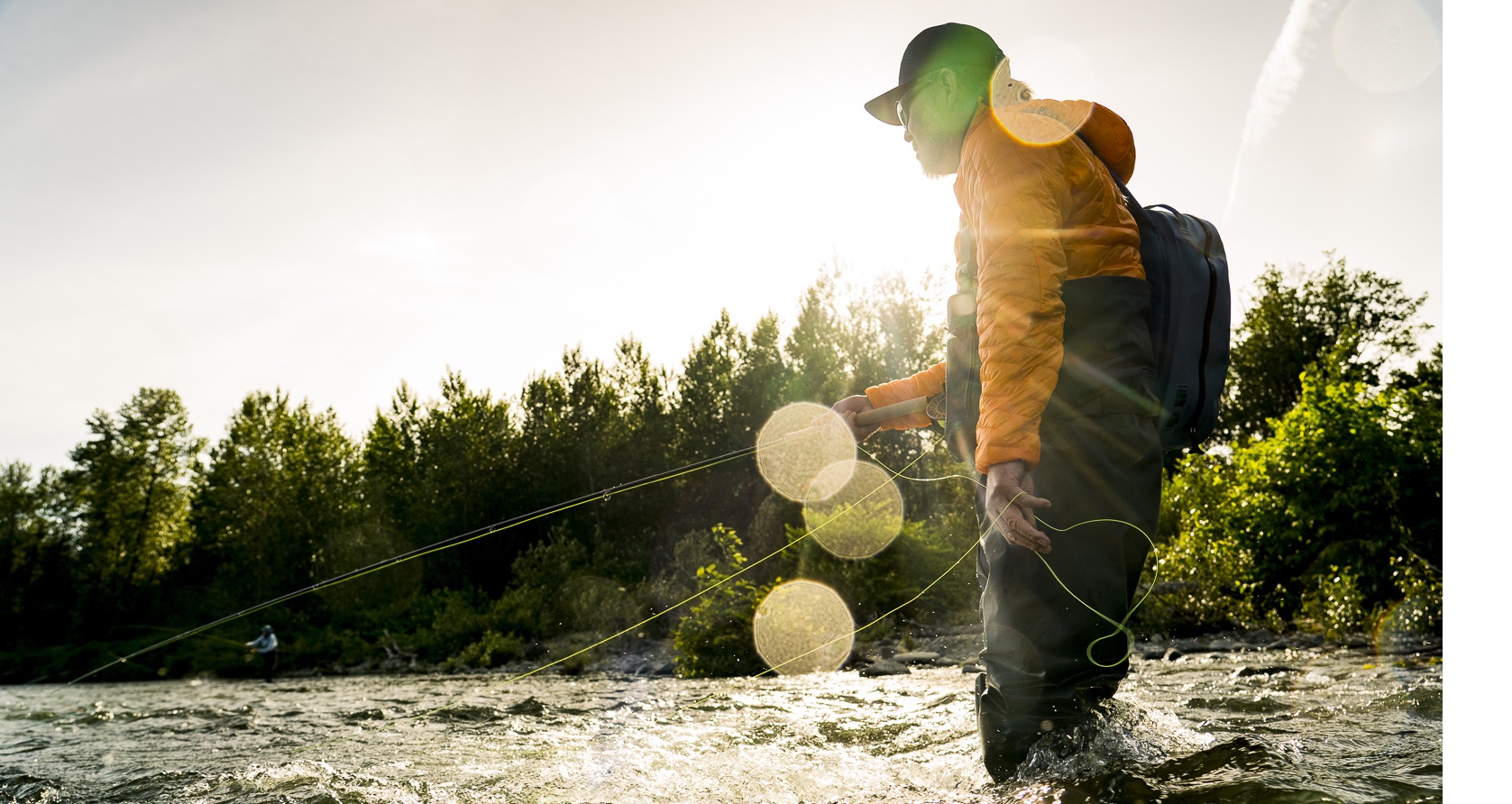
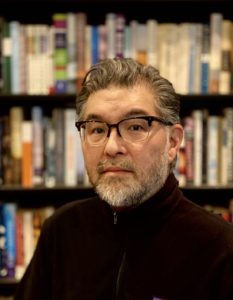
Dylan Tomine is a conservationist, angler, and author of the excellent new book Headwaters: The Adventures, Obsession and Evolution of a Fly Fisherman. Headwaters is a collection of essays and stories from Dylan’s life as a self-proclaimed fly fishing bum, a life that has taken him from his home in the northwest to the far reaches of the globe and back again. You don’t have to be a hardcore angler to connect with this book– it’s an important read for anyone who loves wild places and feels drawn to protect them. And I’m not alone in my praise– in just the few days between when we recorded this conversation and now, the book has received glowing reviews from the Wall Street Journal, Seattle Times, and more.
Dylan was born and raised in the Pacific Northwest, and he’s been obsessed with fish for as long as he can remember. At an early age, he caught his first steelhead, and from that point on he has been laser-focused on that specific species– and he’s devoted huge swaths of his life to both pursuing and protecting the fascinating fish. Given steelhead’s dwindling populations, threatened habitat, and often miserable weather that defines their home waters, steelhead fisherman like Dylan are a rare breed–some would argue they are gluttons for punishment. So when you combine Dylan’s skill as a writer, with his devotion to steelhead, with his love of suffering, the end product is a fascinating man with a gift for telling important stories. Just the kind of person I love getting to know!
I thoroughly enjoyed this conversation with Dylan and thought it was the perfect mix of sobering analysis of the state of the West’s fisheries combined with optimism and solutions for solving the challenges. He also offers up plentiful hilarious and insightful stories from his life on the water. We started out talking about Dylan’s upbringing in the northwest and how and why he became so obsessed with fish. We talk about the moment he realized that he needed to play an active role in protecting fish and fisheries, and why fish health is an indicator of larger environmental challenges. We talk about his longstanding role as a Patagonia fishing ambassador, and how Yvon Chouinard has played a critical role in Dylan’s evolution as a conservationist. We discuss how parenthood changes people’s outlook on environmental challenges and the role of the upcoming generation in the environmental movement. We obviously talk a lot about Headwaters, as well as his previous book called Closer to the Ground, which I also loved. We discussed his creative process, and, as you’d expect, he has tons and tons of excellent book and author recommendations. Be sure to check the episode notes for links to those books and everything else we discuss.
I can’t thank Dylan enough for all his work as a writer and conservationist, and for taking the time to chat with me for this episode. Hope you enjoy!

Header photo by Matthew DeLorme, headshot by Weston Tomine
This episode is brought to you thanks to the generous support of Ranchlands.
Visit www.ranchlands.com to learn more about their top-notch vacations, leather goods and apparel, or to explore their excellent blog, the “Ranchlands Review.”
THANK YOU, Ranchlands!
LISTEN:
—
Download on Apple Podcasts
—
Download on Spotify
—
Download on Google Podcasts
—
Download on Overcast
EPISODE NOTES:
Topics Discussed:
- 6:00 – Dylan discusses his childhood and how fishing became a part of his life
- 8:30 – Dylan talks about steelhead
- 11:00 – Dylan describes the general conditions in which one fishes for steelhead
- 16:15 – Dylan talks about the moment he realized there were real problems and challenges facing the native steelhead population
- 20:00 – Dylan describes how becoming a parent impacted his conservation ethic
- 28:00 – Dylan explains why people should care about declining steelhead populations
- 34:00 – Dylan talks about why he wrote his book Headwaters
- 36:00 – Dylan explains how he became involved with Patagonia
- 41:30 – Dylan talks about Yvon Chouinard, what makes him unique, and how that has made Patagonia into the powerhouse company it is today
- 45:00 – Dylan talks about Patagonia Books
- 49:15 – Dylan reads an excerpt from his book
- 54:30 – Dylan describes his writing process
- 58:15 – Dylan talks about the authors he admires
Information Referenced:
- Headwaters by Dylan Tomine
- Closer to the Ground by Dylan Tomine
- Frances Ashforth
- Steelhead
- Olympic Peninsula
- Swung fly
- National Outdoor Leadership School (NOLS)
- Olympic National Park
- Bogachiel River
- Puget Sound
- Skykomish River
- Polio
- Spanish Flu
- Indicator species
- Mark Kurlansky
- Cod by Mark Kurlansky
- Salt by Mark Kurlansky
- Chinook salmon
- Yvon and Malinda Chouinard
- Tom McGuane
- Gretel Ehrlich
- Dean Potter
- Steph Davis
- Don’t buy this jacket
- Key West, FL
- Jim Harrison
- Hunter S. Thompson
- Jimmy Buffett
- Doug Thomkins
- The North Face
- Royal Robbins
- Patagonia Books
- Rick Ridgeway
- Jane Seivert
- Chris Burkard
- Jennifer Ridgeway
- Jason Isbell
- Russell Chatham
- Dark Waters by Russel Chatham
- James Welch
- Winter in the Blood by James Welch
- David Guterson
- Snow Falling on Cedars by David Gutterson
- East of the Mountains by David Getterson
- John Larison
- Whiskey When We’re Dry by John Larison
- Callan Wink
- August by Callen Winks
- Chris Dombrowski
- Monte Burke
- Chris La Tray
- One Sentence Journal by Chris La Tray
- Brian Doyle
- Wet Engine by Brian Doyle
- Grace Notes by Brian Doyle
- Mink River by Brian Doyle
- The Plover by Brian Doyle
- Ken Kesey
- Sometimes a Great Notion by Ken Kesey
- Jonathan Raban
- Passage to Juneau by Jonathan Raban
- Bad Land by Jonathan Raban
- Karl Marlantes
- Matterhorn by Carl Marlantus
- Deep River by Carl Marlantus
Enjoy this episode? Then you might like these too:
- Chris La Tray – Rediscovering His Past, Writing His Future
- Alvin Dedeaux – Living His Dream
- Reflections On My First Elk Hunt, with Adam Gall
- Monte Burke – Exploring Obsession
- Malcolm Brooks – Epic Tales from the American West
- Rachel VandeVoort – Harnessing the Power of Outdoor Recreation
- Callan Wink – A New Voice for the New West
- Peter Heller – Chasing the Flow
- Hal Herring – A Man of Words & Wild Places
- Chris Dombrowski – Words, Water & the West
- Anna Brones – Committed to Creativity
Visit the podcast page for a full list of episodes where you can filter episodes by topic and guests’ vocations.
Liz Moore – For the Love of Montana
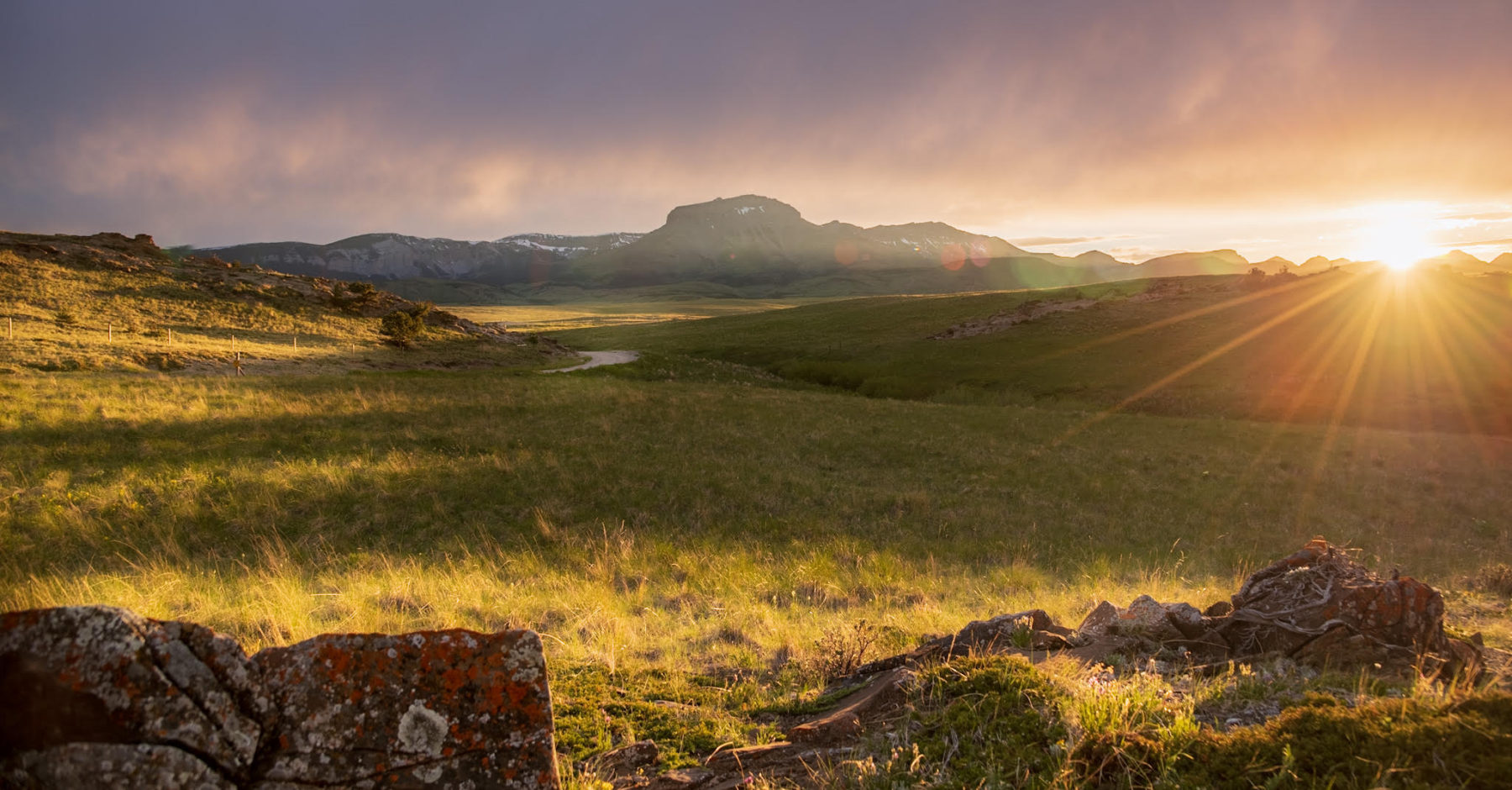
Liz Moore is the Executive Director of the Montana Nonprofit Association, an organization whose mission is to “provide leadership for Montana’s nonprofit sector and partner with charitable nonprofits to promote a sustainable, networked, and influential sector.” Founded in 2001, the MNA provides capacity, resources, and networking opportunities that allow Montana’s diverse and numerous nonprofit organizations to increase their effectiveness and better serve the communities and citizens of Montana. As you’ll hear in this conversation, Liz loves Montana and has devoted her career to the service of others, and her passion for making her home state an even better place is both inspiring and infectious.
As some of you may know, my full-time job is in the nonprofit sector– I’m the Conservation Director at a regional land trust in southeastern Colorado. Prior to moving into the nonprofit sector, I spent all of my career in the business world. But despite serving on several nonprofit boards and advisory committees, I still did not fully understand the critical role of nonprofits, especially in the West. It wasn’t until I was a year or so into my nonprofit conservation work that I realized just how critical nonprofits are to the functioning of society in the West. Nor did I understand how they complement the work of businesses and governmental entities. So I was thrilled to have Liz join me to discuss all of these issues, and I hope that you, the listener, will gain a deeper appreciation for why nonprofits are so important here in the West.
Liz and I connected virtually and had a wide-ranging conversation about the invaluable role of nonprofits in Montana and beyond. We started out discussing why Montana has such a large number of nonprofits per capita, and why Montana’s unique geography makes nonprofits such an essential part of the culture. We also discussed why Montanans are more involved in the community than what you see in many other regions of the United States. We talked a lot about COVID’s impact on the rural communities of Montana and how nonprofits were uniquely positioned to provide immediate and long-term relief to the unprecedented challenges created by the pandemic. We discussed Liz’s work on Montana’s Coronavirus Relief Task Force, and why she was asked to serve under two different governors, one Democrat and one Republican. We talk about how political polarization is affecting the nonprofit sector, and the importance of identifying and focusing on common ground rather than differences. We also discuss Liz’s upbringing in eastern Montana, her thoughts on what makes a successful nonprofit, her passion for photography, and much more.
I can’t thank Liz enough for taking the time to share all of her wisdom and insights about this important yet often not fully understood topic. You’ll learn a lot from this episode, so I hope you enjoy!
Header photograph by Liz Moore Photography, headshot courtesy of Liz
—
Download on Apple Podcasts
—
Download on Spotify
—
Download on Google Podcasts
—
Download on Overcast
—
This episode is brought to you by The Arthur M. Blank Family Foundation and its Montana-based AMB West Philanthropies, both of which embody the values-based approach to philanthropy and business of their Chairman Arthur M. Blank
EPISODE NOTES
Topics Discussed:
- 4:00 – Liz describes the Montana Nonprofit Association
- 6:00 – Liz talks about the nonprofit sector in Montana
- 8:30 – Liz explains what the high concentration of nonprofits in Montana means for the sector
- 10:45 – Liz talks about how COVID-19 impacted her work and the work of Montana nonprofits
- 13:30 – Liz explains why some nonprofits saw success during the pandemic and why others did not
- 17:30 – Liz discusses nonprofit lessons learned during the pandemic
- 20:00 – Liz explains some of the challenges facing the nonprofit workforce and why employee retention is so difficult in that sector
- 22:45 – Liz discusses some potential, if difficult avenues for addressing the challenges facing the nonprofit sector
- 26:00 – Liz gives some examples of nonprofit organizations and staff giving their best during the pandemic
- 30:00 – Liz explores the concept of generosity with respect to the nonprofit sector and explains where she saw Montana nonprofits exhibit generosity during the pandemic
- 33:00 – Liz describes how the current political/cultural climate impacts the nonprofit sector
- 40:30 – Liz talks about where she sees the nonprofit sector going in the coming years
- 43:45 – Liz identifies characteristics of successful nonprofits
- 46:00 – Liz discusses her background
- 50:00 – Liz gives advice for people facing forks in the road regarding their careers
- 53:00 – Liz explains how she became interested in photography
- 54:30 – Liz’s book recommendations
- 57:00 – Liz’s parting words of wisdom
Information Referenced:
- Montana Nonprofit Association (MNA)
- Liz Moore Photography
- Rocky Mountain Elk Foundation
- Helena Symphony
- The Myrna Loy
- Matt Pierson
- Montana Coronavirus Task Force
- Governor Steve Bullock
- Governor Greg Gianforte
- American Rescue Plan Act
- Miles City, MT
- Fromberg, MT
- Prickly Pear Land Trust
- Mary Hollow
- Governance as Leadership by Richard P Chait
- Gentlemen in Moscow by Amor Towles
- The Lincoln Highway by Amor Towles
- Leadership: In Turbulent Times by Dorris Kearns Goodwin
- Atomic Habits by James Clear
- Arthur M. Blank Family Foundation
- AMB West Philanthropies
Enjoy this episode? Then you might like these too:
- Shane Doyle – Reverence for the Past, Hope for the Future
- Matt Pierson – Finding New Solutions for Food Insecurity
- Lesli Allison & Tuda Libby Crews – Durable Conservation in the West… and Beyond
- Antonia Malchik – Exploring Culture & Complexity
- Dr. David Hewitt – The Science of Wildlife Conservation
- NEW WEST DISPATCH – Marci McLean & Cora Neumann on COVID’s Impact on Native Communities
- Jessica Wahl Turner – Outdoor Recreation & Rural Economies
- Carlos Fernandez – The Power of Partnerships
- Juanita Vero – A Deep Love of Place
- Gabe Vasquez – Advocate for Equity in the Outdoors
Kate Mannix – A Legacy of Land Stewardship
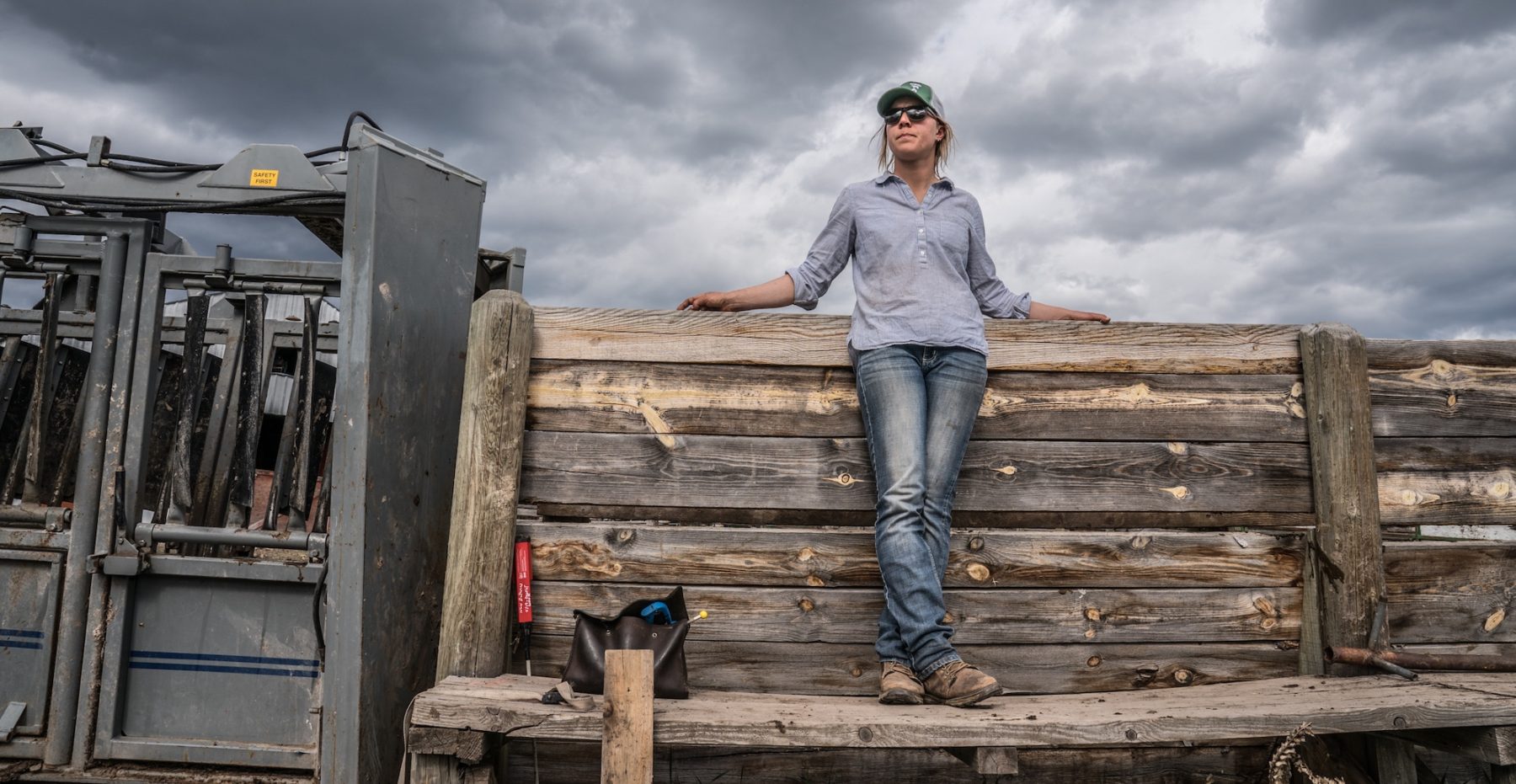
Kate Mannix is a rancher who works alongside her family on the Mannix Ranch in Montana’s Blackfoot Valley. The Mannix family has been ranching and stewarding their family ranch since 1882, back when Timothy Benjamin Mannix purchased the land from the Northern Pacific Railroad. For generations, the Mannix family has served as loyal caretakers of this spectacular landscape, and, over the years, they have evolved their business and land management approaches so as to continuously improve the ranch’s soil, water, flora, and fauna.
Kate was born and raised in California, but moved to Montana for graduate school, where she fell in love with both ranching and the Rocky Mountains. A few years later, she was accepted as an apprentice into the Quivira Coalition’s New Agrarian Program, a unique program that connects aspiring farmers and ranchers with experienced regenerative agriculture practitioners throughout the West. After a stint in New Mexico, she eventually found her way to the Mannix Ranch, where she fell in love with Bryan Mannix, who is now her husband. So today, Kate is officially a Mannix and is an invaluable part of this storied ranching family.
Kate and I connected virtually and chatted about everything from the business of ranching to her favorite books, with a lot of fascinating topics in between. We started out by discussing the history of the Mannix Ranch and how her family has managed to maintain such a successful family business for so many generations. We talk about challenges facing her ranch and the business of ranching, and the importance of land conservation and regenerative practices for the business’s sustainability. We talk about her time with Quivira, her stint as a vegan, her current love of hunting, and her family’s thoughts on her career path. She also shares some inspiring and instructive thoughts on her recent battle with cancer, and some of the lessons she learned from the scary, life-change experience. We discussed a lot, so please check out the episode notes for a full list of everything we covered.
I’ve wanted to have Kate on the podcast for quite some time now, so I greatly appreciate her making the time to chat. This was an educational and inspiring episode, so I hope you enjoy.
Photos courtesy of Kate Mannix
This episode is brought to you thanks to the generous support of Ranchlands.
Visit www.ranchlands.com to learn more about their top-notch vacations, leather goods and apparel, or to explore their excellent blog, the “Ranchlands Review.”
THANK YOU, Ranchlands!
—
Download on Apple Podcasts
—
Download on Spotify
—
Download on Google Podcasts
—
Download on Overcast
EPISODE NOTES
Topics Discussed:
- 5:10 – Kate walks us through the family genealogy related to the Mannix Ranch
- 7:40 – Kate describes the Mannix Ranch operations
- 9:40 – Kate explains why her family got involved in grass finishing their beef
- 14:10 – Kate talks about why she thinks the Mannix’s have been so successful in managing a multigenerational family business
- 18:00 – Kate describes some of the challenges she expects the ranch will face in the coming years
- 23:00 – Kate directs us to resources about the relationships between grazing, grasslands, and climate change
- 27:30 – Kate explains how she fell in love with ranching
- 35:30 – Kate talks about moving from her ranch work with Quivira in New Mexico to Mannix Ranch in Montana
- 39:00 – Kate discusses what her family thinks about her career path
- 40:00 – Kate explains why she stopped being a vegan
- 45:30 – Kate talks about when she started hunting
- 51:00 – Kate explains her connection with Red Ants Pants, a women’s workwear company
- 54:30 – Kate discusses cancer and chemotherapy
- 1:09:30 – Kate’s book recommendations
Information Referenced:
- Mannix Family and Ranch
- Rusty Sagebrush – Botanically Dyed Natural Textiles
- Blackfoot Valley
- Cow-calf operation
- Ranching For Profit School
- Bob Marshall Wilderness
- The Quivira Coalition
- Soil Carbon Cowboys
- Defending Beef, Nicolette Hahn Niman
- For the Love of Land, Jim Howell
- Jim Howell
- Daniela Ibarra-Howell
- Mescalero Apache
- Sacramento Mountains (New Mexico)
- Ranchlands
- Sieben Live Stock
- Cascade, MT
- Alexis Bonogofsky
- Quivira’s New Agrarian Program
- Regenerative agriculture
- Paleolithic diet
- Kate Kavanaugh
- Laird Hamilton
- Adam Gall
- Meat Eater, Steven Rinella
- Red Ants Pants
- Sarah Calhoun
- Girls Leadership Program, Red Ants Pants Foundation
- Phantom Ranch
- Between Two Kingdoms, Suleika Jaouad
- Pema Chödrön
- Black Lives Matter
- Lincoln’s Melancholy, Joshua Wolf Shenk
- Regarding Willingness, Tom Harpole
- Life on the Mississippi, Mark Twain
- Roughing It, Mark Twain
- Americanah, Chimamanda Ngozi Adichie
- Nnedi Okorafor
Enjoy this episode? Then you might like these too:
- Alexis Bonogofsky – Taking a Stand for the West
- Sarah Wentzel-Fisher – Conservation in the Radical Center
- Sarah King – Collaborative Conservation in the American Southwest
- Juanita Vero – A Deep Love of Place
- Heather Hansman – Demystifying Water in the West
- Kate Kavanaugh – Regeneration & Restoration
- Daniela Ibarra-Howell – Healing the Land Holistically
- Matt Pierson – Finding New Solutions for Food Insecurity
Visit the podcast page for a full list of episodes where you can filter episodes by topic and guests’ vocations.
10 Books Every Aspiring Conservationist Should Read, with Mark Kenyon
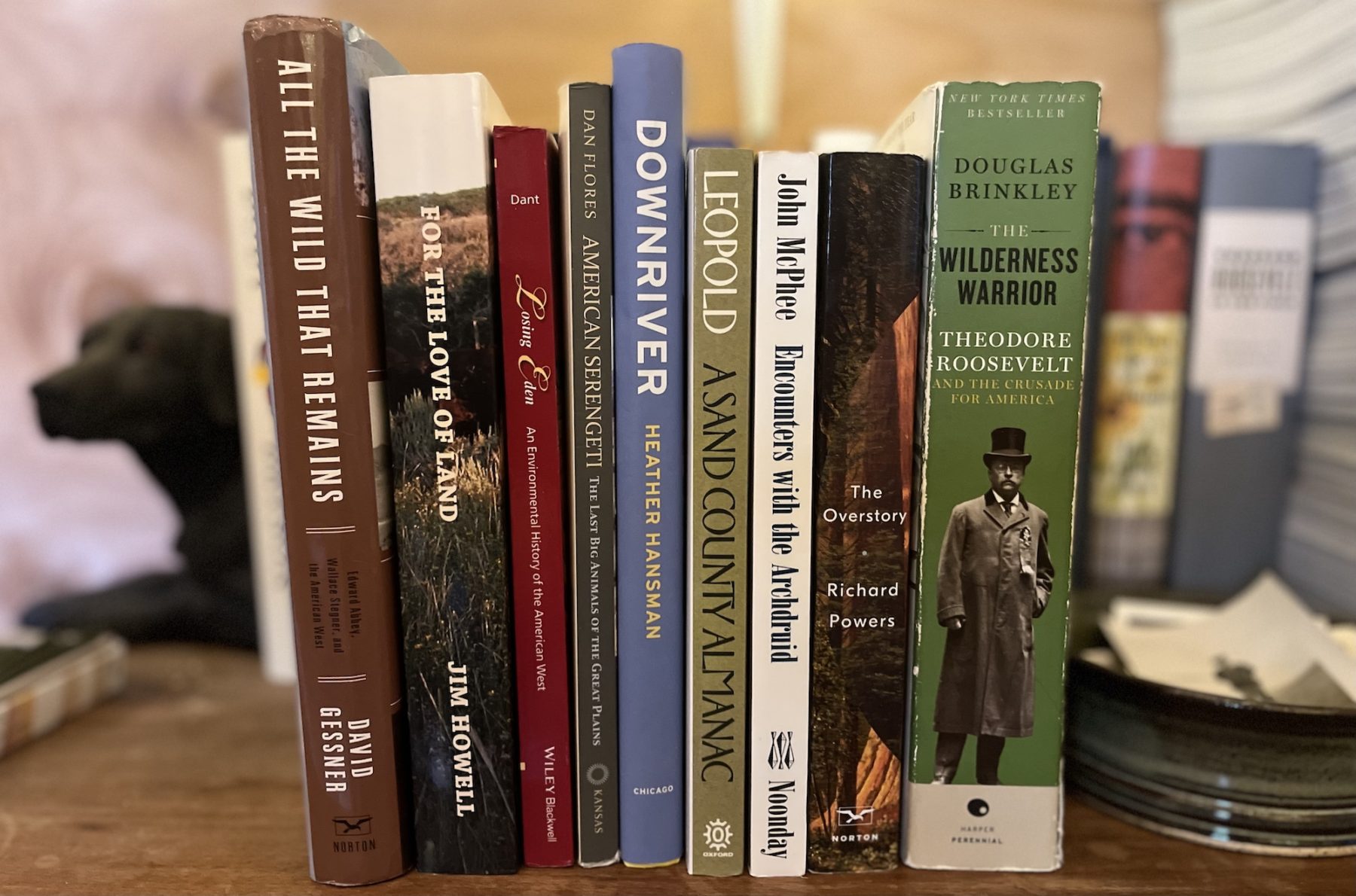
If someone asked me to name my favorite thing about producing the Mountain & Prairie podcast, my answer would be simple: The network of curious, hard-working, accomplished, and humble friends that I’ve made as a result of our shared interests and substantive conversations.
Mark Kenyon is a perfect example.
He and I initially connected thanks to our shared love of reading. A few years later, he joined me on the podcast for a wonderful conversation about his amazing book That Wild Country: An Epic Journey through the Past, Present, and Future of America’s Public Lands. Even though we’re both busy with young families and demanding (yet fun) careers, we’ve managed to stay in touch via the occasional text about book recommendations and interesting ideas.
So, last week, when Mark floated the idea of a discussion about books and conservation on his wildly popular and thoughtful podcast Wired to Hunt, I jumped at the opportunity. We decided to each pick five books about conservation and bring them to the podcast recording for a sort of two-man book club.
The result is the podcast episode and books embedded below: 10 Books Every Aspiring Conservationist Should Read
Mark is one of the most voracious readers I know– his taste in books is similar enough to mine that I trust his opinions but different enough that I always learn something new from his recommendations and insights. While Mark is best known for his extensive knowledge of whitetail deer hunting, he has read, studied, and written extensively on a wide range of topics, including public lands, history, natural resources, wildlife managment, and much more. And most importantly, he’s just a damn interesting and nice dude that I enjoy chatting with.
Mark and I chatted for more than two hours and probably could’ve gone for even longer had our bladders not forced us to wrap up the conversation. As you’d imagine, it was difficult to pick just ten books about such a wide-ranging topic, so consider our list to be just a starting point.
I thoroughly enjoyed this discussion, and I greatly appreciate Mark’s invitation. I hope that you enjoy the conversation and perhaps find a few new titles that will give you a greater appreciation for the important and endlessly fascinating topic of conservation in the West and beyond.
Listen to the Podcast:
Spotify:
Apple Podcasts:
Read the Books:
The Wilderness Warrior: Theodore Roosevelt and the Crusade for America by Douglas Brinkley
American Serengeti: The Last Big Animals of the Great Plains by Dan Flores
Losing Eden: An Environmental History of the American West by Sara Dant
A Sand County Almanac by Aldo Leopold
Downriver: Into the Future of Water in the West by Heather Hansman
Encounters with the Archdruid by John McPhee
For the Love of Land: Global Case Studies of Grazing in Nature’s Image by Jim Howell
The Sixth Extinction: An Unnatural History by Elizabeth Kolbert
All the Wild That Remains: Edward Abbey, Wallace Stegner, and the American West by David Gessner
The Overstory by Richard Powers
Head over to Ed’s Book Recommendation page for hundreds of titles, or sign up for his bimonthly book email:
Alvin Dedeaux – Living His Dream
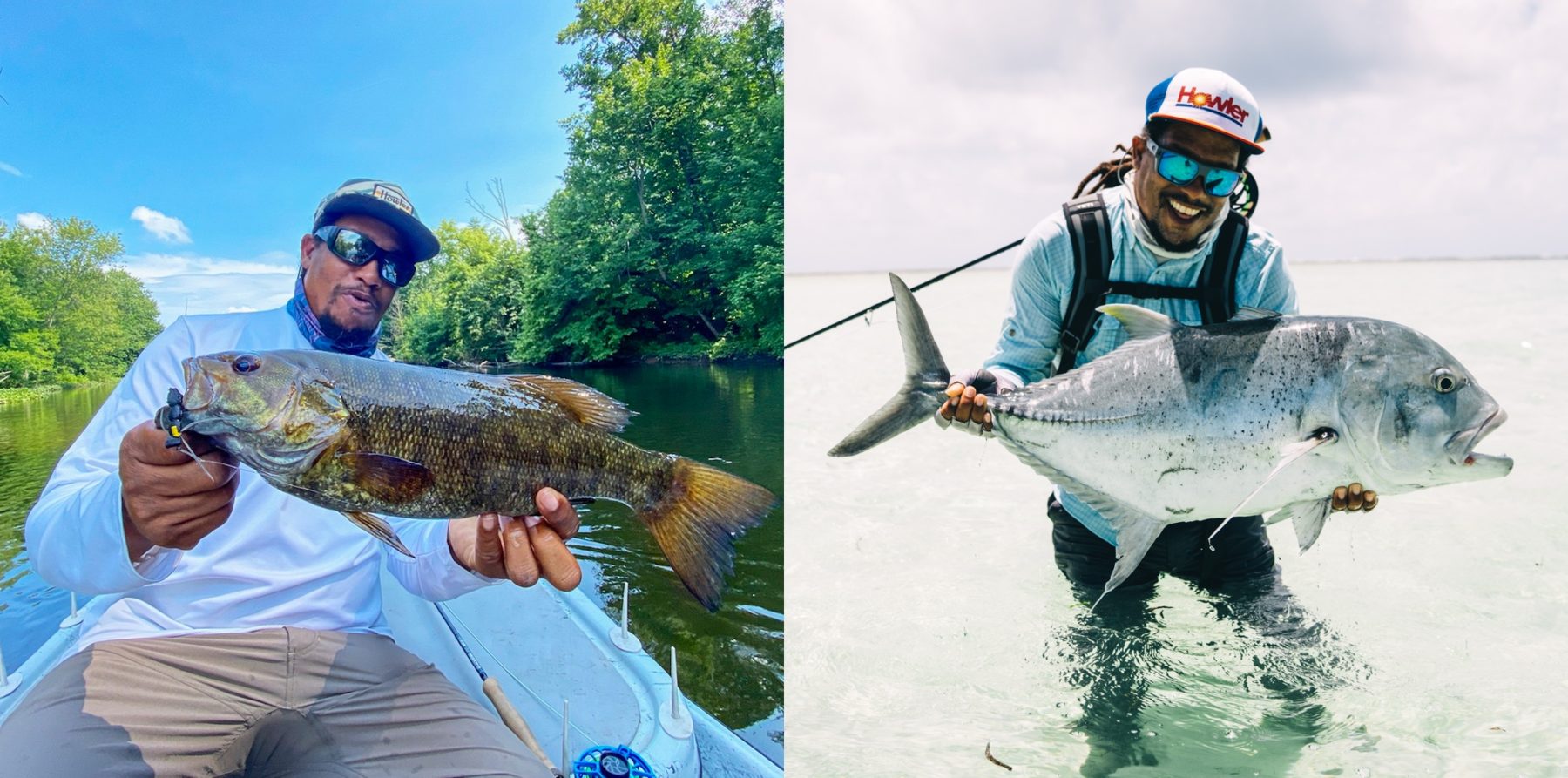
Alvin Dedeaux is a renowned Austin-based fly fishing guide who is one of the Lone Star State’s most sought-after experts in the pursuit of everything from Guadelupe Bass in Central Texas to Redfish on the Texas coast. Alvin is an ambassador for well-known brands such as Howler Brothers and Yeti, and he’s twice been a finalist for Orvis’s Guide of the Year award. And on top of all of that, Alvin produces informative and entertaining videos on his popular Youtube channel, where anglers of all experience levels can learn from Alvin’s decades of experience.
Alvin was born and raised in Houston, and he has been a committed fisherman, hunter, and all-around outdoorsman for as long as he can remember. At age 12, he began teaching himself to fly fish, and what started as a hobby quickly became one of the most important aspects of his life– a passion that remains the centerpiece of his personal and professional lives to this day. Alvin’s story has many fascinating chapters, and each one could be its own three-hour podcast episode– he’s owned a construction company, been a singer in a very successful touring band, worked at the world-famous Austin Angler, and is now the head guide and owner All Water Guides. With a background like that, it’s no surprise that Alvin has become one of the most well-known fly guides in the country.
Alvin and I connected virtually and had a fun hour-long conversation about all aspects of his life and career. We started out chatting about his upbringing in Texas, and how fly fishing has been a mainstay in his life throughout all its various stages. We talk about his decision to leave college to pursue life as an entrepreneur, and his path to becoming professionally involved in fishing. We discuss his formative years working at the Austin Angler, and how that particular shop started the careers of some of the country’s most well-respected guides. He offers excellent insights into finding one’s dream job, the importance of conservation in Texas, and how COVID has affected Texas’s valuable fishing resources. We also discuss his popular Youtube channel and why he devotes so much time and energy toward sharing his wisdom. And, as you’d expect, Alvin offers some excellent book and music recommendations.
I loved talking to Alvin, and felt like we only scratched the surface of his wildly unique life. Be sure to check on the episode notes for tons of links to everything we discussed. Hopefully we can do a part 2 at some point in the future, but, until then, enjoy this fun conversation with Alvin Dedeaux!
Photos courtesy of Alvin Dedeaux
—
Download on Apple Podcasts
—
Download on Spotify
—
Download on Google Podcasts
—
Download on Overcast
EPISODE NOTES
Topics Discussed:
- 4:00 – Alvin’s background and childhood
- 6:00 – Alvin discusses how fly fishing entered his life
- 8:00 – Alvin talks about his decision to leave college
- 16:00 – Alvin talks about his job at the Austin Angler, his first job in the fly fishing industry
- 23:15 – Alvin discusses how he began guiding in Colorado
- 27:45 – Alvin talks about how long it took for him to feel like he had a sustainable business going in the fly fishing industry
- 32:00 – Alvin explains why he became interested in the use of social media for his business
- 37:00 – Alvin talks about finding the one thing you’d “eat shit all day” for (aka dream jobs)
- 45:00 – Alvin explains how COVID-19 impacted his business and limited fishery resources
- 51:00 – Alvin gives advice for anybody to become more conservation minded
- 53:45 – Alvin talks about how he got connected with Howler Brothers
- 57:45 – Alvin’s book and music recommendations
Information Referenced:
- Alvin Dedeaux
- Sunfish
- Eagle Claw
- Fly rod weighting system
- Martin
- University of Texas
- Texas A&M
- Austin Angler
- JT Van Zandt
- Dave Mangum
- Jim Adams
- Mina Hemingway
- Ernest Hemingway
- Adams & Sons fly shop
- Bozeman Angler
- Simms
- Joe Robinson
- Dave and Emily Whitlock
- Zap-a-gap
- Texas Hill Country
- Mike Thompson
- Yvon Chouindard
- Vermillion Brothers
- Taimen fish (Mongolia)
- Kamchatka, Russia
- Vail, CO
- Bill Perry
- Fly Fishing Outfitters
- Orvis
- Beaver Creek, CO
- Texas Parks and Wildlife Foundation
- Jay Kleberg
- Rick Wittenbraker
- Howler Brothers
- Yeti
- Banning Collins
- Empire of the Summer Moon by S. C. Gwynne
- John Adams by David McCullough
- Benjamin Franklin by Walter Isaacson
- Blood and Thunder by Hampton Sides
- Slayer
- Metallica
- Soundgarden
- Snoop Dogg
- Bob Marley
Enjoy this episode? Then you might like these too:
- Reflections On My First Elk Hunt, with Adam Gall
- Matt Barber & Joel Doub, Part 2 – Tales from an Entrepreneurial Adventure
- Monte Burke – Exploring Obsession
- Callan Wink – A New Voice for the New West
- Hal Herring – A Man of Words & Wild Places
- Mark Kenyon – A Passion for Public Lands
- Chris Dombrowski – Words, Water & the West
- Hampton Sides – Live at the Aspen Institute
Visit the podcast page for a full list of episodes where you can filter episodes by topic and guests’ vocations.
Riddy Arman – Artistic Authenticity
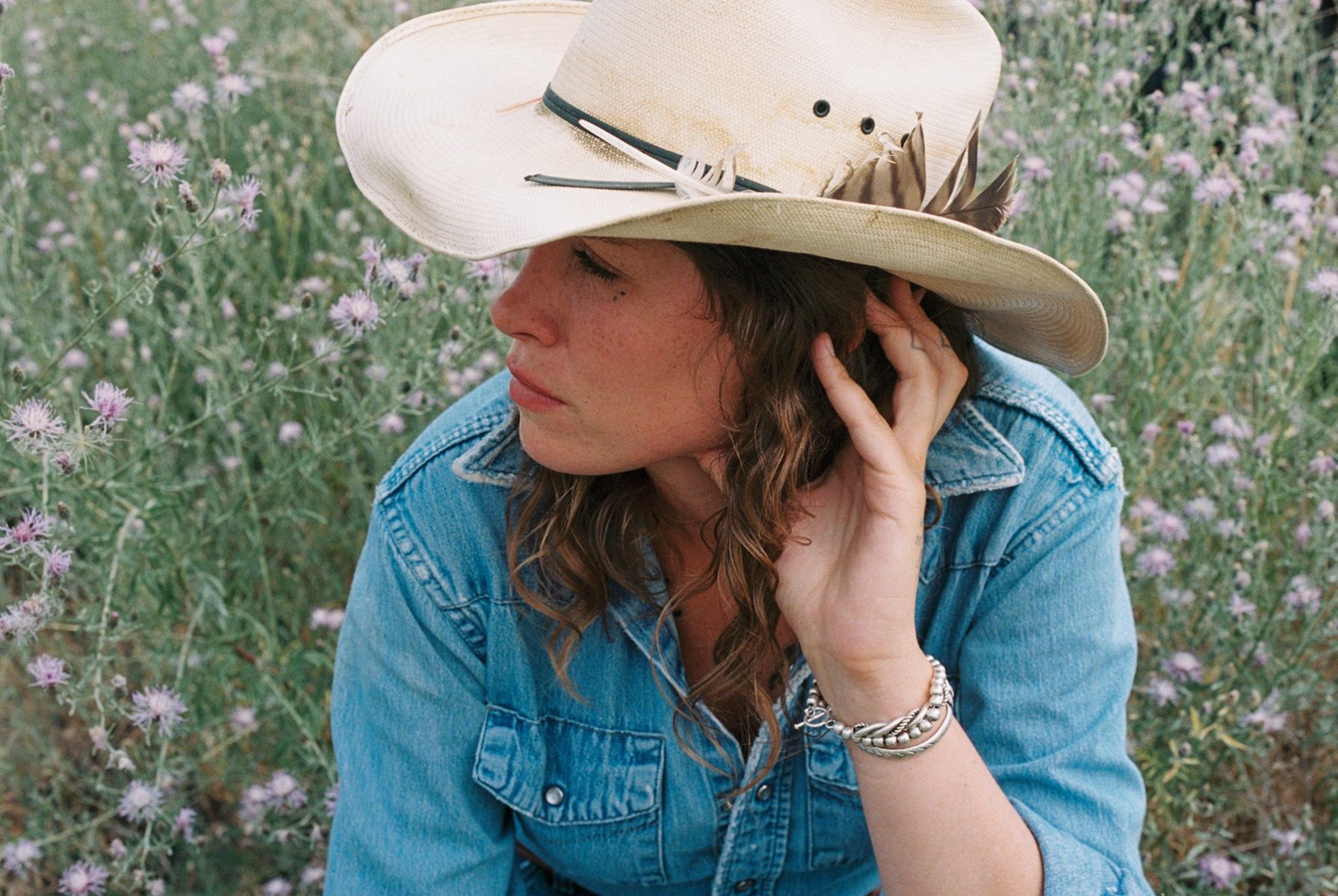
Riddy Arman is a singer-songwriter who lives in Montana’s Mission Valley, a rural agricultural community in the state’s northwestern corner. Riddy’s self-titled debut album was released in 2021 and has received praise from renowned institutions such as Rolling Stone, as well as from many highly respected fellow musicians, including Colter Wall. Riddy and her music are highly influenced by the wide-open spaces of Montana, and she brings a deep level of authenticity and emotion to all aspects of her craft– from the lyrics, to the melodies, to her live performances.
Born and raised in Ohio, Riddy left home after high school and began a long, winding, and interesting journey that took her to North Carolina for a year of college, to New York City where she worked as a model, and on an extended hitchhiking and train-hopping journey around the United States, just to name a few. She began writing and playing music in earnest while living on a farm in rural Virginia and eventually moved to Montana, a place she had long felt drawn toward. After a lot of hard work, creative experimentation, and determination, Riddy has figured out how to cultivate a successful music career far from the hustle and bustle of Nashville and deeply connected to the Montana landscapes that she loves.
Riddy and I connected earlier this week and had a fascinating conversion about everything from her winding career path to her current success in the music business. We started out talking about her childhood in Ohio and how she unexpectedly ended up in New York City working as a model. We discussed some of her craziest experiences from traveling around the United States and when and why she decided to get serious about music. She talks about her commitment to be authentic, how she manages to stay calm, even when she’s extremely nervous, and how she has managed to build a music career so far away from Nashville. We discuss the value of quiet time, mindfulness, the importance of mentors, favorite books, and much more.
Be sure to check out the episode notes for links to everything we discuss. Hope you enjoy.
Photos by Elisabeth Kokesh
This episode is brought to you thanks to the generous support of Ranchlands.
Visit www.ranchlands.com to learn more about their top-notch vacations, leather goods and apparel, or to explore their excellent blog, the “Ranchlands Review.”
THANK YOU, Ranchlands!
—
Download on Apple Podcasts
—
Download on Spotify
—
Download on Google Podcasts
—
Download on Overcast
EPISODE NOTES
Topics Discussed:
- 5:30 – Where Riddy grew up
- 7:50 – Riddy’s connection to agriculture
- 10:15 – Dropping out of college
- 12:30 – Moving to New York City and modeling
- 16:00 – Music and writing while in NYC
- 17:15 – Decision to leave NYC
- 19:00 – Traveling, riding trains, hitchhiking
- 20:30 – Raised to be independent
- 23:00 – Lessons learned from the adventures of traveling
- 27:00 – Moving to Virginia, focusing on agriculture
- 29:00 – Settling down, connecting with the land
- 32:45 – Finding value in quiet time
- 34:15 – Sticking with music for good
- 35:30 – Riddy’s writing process
- 37:45 – Transition to performing
- 40:45 – Dealing with nervousness
- 44:00 – Breathing and other ways to calm down
- 47:15 – Riddy’s deep connection with Montana
- 51:30 – Building a music career from rural Montana
- 56:30 – Process of being authentic and putting herself out there
- 58:30 – Artists that Riddy admires
- 1:01:45 – Advice for creatives
- 1:03:50 – Favorite books
Information Referenced:
- Riddy Arman
- Maumee, Ohio
- Warren Wilson College
- Swannanoa, NC
- Chris Douglas episode
- Freedom by Sebastian Junger
- Ranchlands Review article by Anna LoPinto
- Wim Hof
- What Doesn’t Kill Us by Scott Carney
- Mission Valley, Montana
- Chris Acker
- La Honda Records
- Gillian Welch
- Avett Brothers
- Toa of Equus by Linda Kohanov
- Ranier Maria Rocka
Enjoy this episode? Then you might like these too:
- Shane Doyle – Reverence for the Past, Hope for the Future
- Antonia Malchik – Exploring Culture & Complexity
- Nickolas Butler – The Craft of Creativity
- Kelsey Johnson – Chasing Her Artistic Ambitions
- Iris Gardner – Living with Intention
- Live in Bozeman!
- Jessica Ilalaole – Creating Home in the High Desert
- Morgan Irons – Finding Her Muse
Visit the podcast page for a full list of episodes where you can filter episodes by topic and guests’ vocations.
Yemi Mobolade – Community Builder
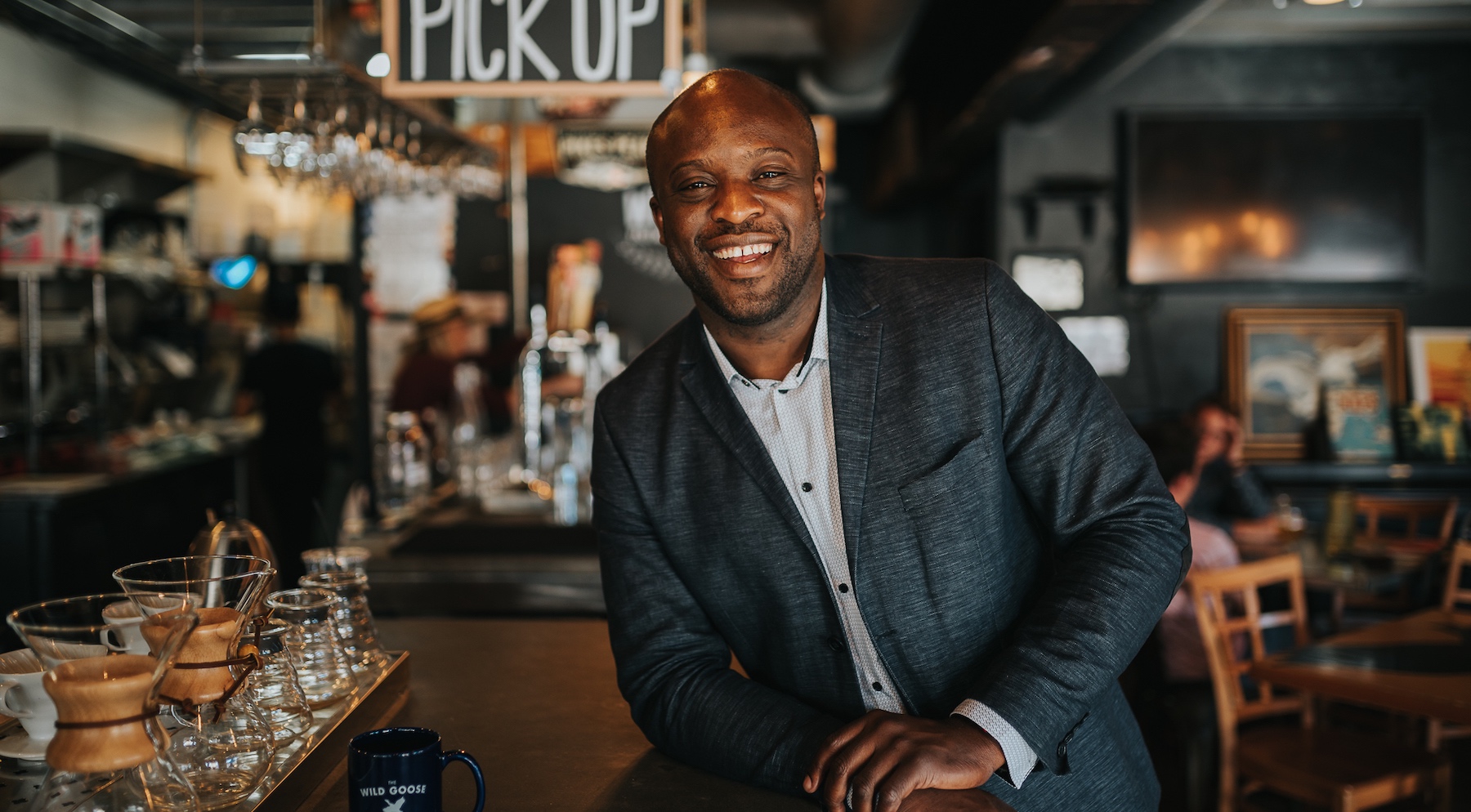
Yemi Mobolade is an entrepreneur, public servant, and community leader who devotes his seemingly limitless energy toward the betterment of Colorado Springs, Colorado. Born and raised in Nigeria, Yemi immigrated to the United States for college and eventually landed in Colorado Springs, where he has fully devoted himself to serving the community. He’s a co-founder and partner in two wildly successful restaurants, he’s served in various capacities within the city’s government and economic development arms, and he’s deeply involved in numerous non-profit organizations. On top of all of that, he’s a devoted husband and father of three beautiful children.
Yemi and I are neighbors, and our kids have been classmates and buddies for several years– so I’ve had the opportunity to personally interact with him in a variety of settings over a long period of time. Ever since first meeting Yemi, I have been extremely impressed with his positivity, leadership skills, and deep commitment to our community. Whether he’s touting the economic upside of doing business in Colorado Springs or figuring out creative solutions for his restaurants to thrive in the pandemic, I’ve always been intrigued by Yemi– everything from his personal backstory to why he is so obsessed with community building. So I was happy to finally sit down with him to discuss all of this.
We met up at his office on a Sunday afternoon for an inspiring conversation about everything from his early days in Nigeria to his upcoming plans to run for mayor of Colorado Springs. We start out discussing his move to the United States from Nigeria, and he talks about his perceptions of America from the outside looking in. We talk about his education, his commitment to his faith, and how he spent parts of his early career starting churches in various parts of the United States. We discuss his deep love for the city of Colorado Springs, and why he has decided to throw his hat in the ring for mayor. We discuss his heroes, his favorite books on leadership, and how his wife and children positively influence his desire to serve.
I really appreciate Yemi taking the time to chat, and I greatly appreciate his commitment to serving our community. There are lots of important lessons to be learned from Yemi, so I hope you enjoy.
Photos courtesy of Yemi Mobolade
—
Download on Apple Podcasts
—
Download on Spotify
—
Download on Google Podcasts
—
Download on Overcast
EPISODE NOTES
Topics Discussed:
- 4:45 – Yemi’s childhood in Nigeria
- 11:45 – What it was like when Yemi came to the US.
- 13:15 – Yemi’s journey of self-discovery
- 18:15 – How Yemi ended up in Colorado Springs
- 13:30 – Why Yemi appreciates and builds community
- 25:30 – Yemi’s political plans
- 31:45 – How Yemi plans to maintain his ideals within politics
- 35:00 – Yemi’s goals for the growth of Colorado Springs
- 39:00 – The impact of Yemi’s children on his life
- 44:15 – Leaders that Yemi admires
- 56:30 – Yemi’s book recommendations
Information Referenced:
- Lagos, Nigeria
- South Bend, Indiana
- Christian Missionary Alliance
- Good Neighbors Meeting House
- The Wild Goose Meeting House
- COS I Love You
- El Pomar Foundation Fellowship
- Abraham Lincoln
- Doris Kearns Goodwin
- Joshua Wolf Shenk
- Theodore Roosevelt
- Sebastian Junger
- Adam Grant
- Delia Owens
- J.K. Rolling
Enjoy this episode? Then you might like these too:
- Shane Doyle – Reverence for the Past, Hope for the Future
- Matt Pierson – Finding New Solutions for Food Insecurity
- Juanita Vero, Part 2 – A Deep Desire to Serve
- James Decker – Inspired Leadership for the New West
- Gabe Vasquez – Advocate for Equity in the Outdoors
- Becky Edwards – Amplifying the Power of Women in the West
- Jason Gardner – A Life of Purpose & Service
Visit the podcast page for a full list of episodes where you can filter episodes by topic and guests’ vocations.
Chris Burkard, Part 2 – Seeking Beauty Through Adventure
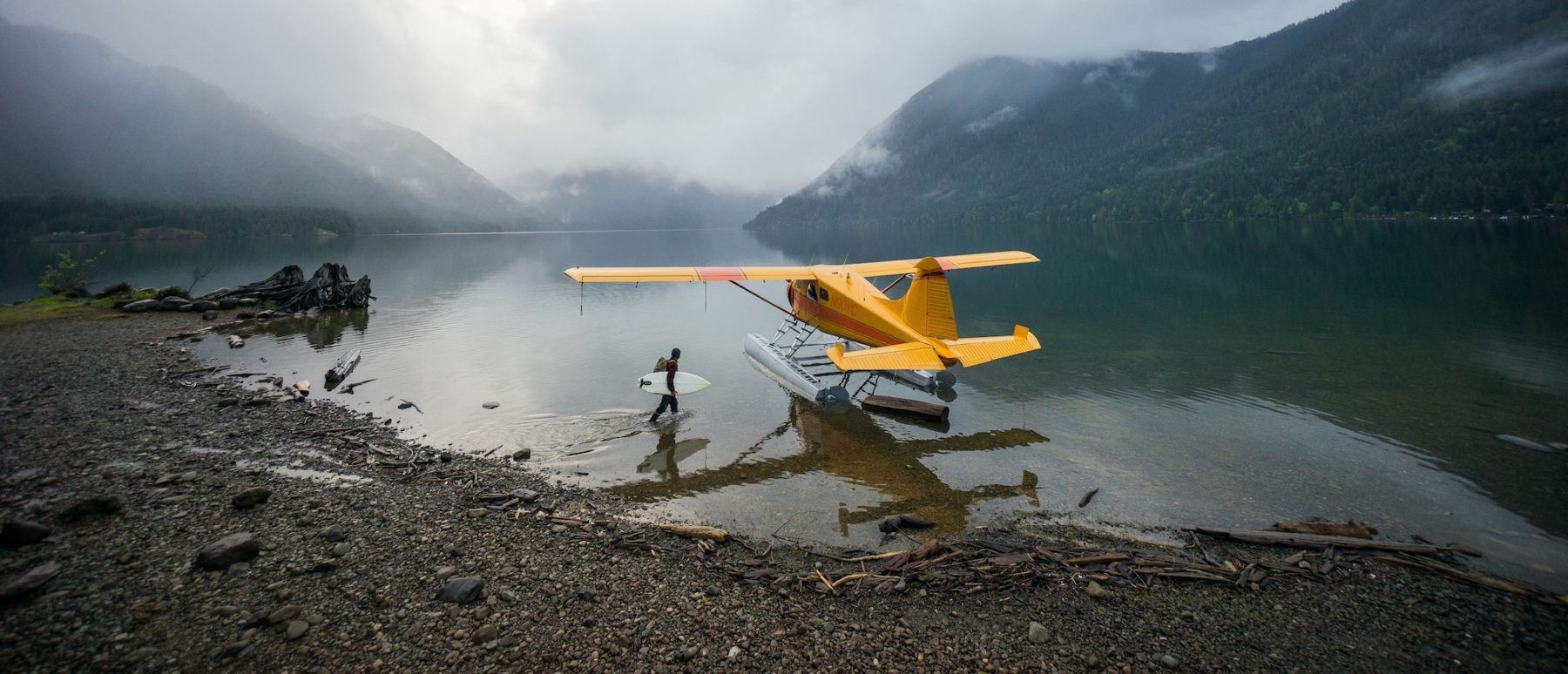
Chris Burkard is a prolific photographer, filmmaker, and author who is known for diving headfirst into epic adventures, documenting them with his camera, and producing one-of-kind stories that resonate deeply with millions of people around the world. He’s bikepacked across Iceland in winter, scouted cold-water surf breaks in British Columbia, and explored some of the lesser-known corners of the American West—just to name a few. In all his work, Chris combines his abundant positive energy with curiosity and authenticity, which has earned him the admiration of fellow accomplished artists, well-known brands, and nearly four million Instagram followers.
Earlier this week, Chris released his newest book titled Wayward– a collection of some of his best and never-before-seen photographs from some of the wildest places on earth. Wayward also features extensive written stories that detail his fascinating career path and the challenges, mistakes, and adventures that made him the artist he is today. I was lucky enough to receive an advanced copy of the book, and I read it in one sitting and thoroughly enjoyed it. The photographs are obviously stunning, but what I really appreciated was Chris’s willingness to share the many lessons he’s learned along his professional journey– lessons that I (and maybe you) can apply to your own creative endeavors.
If you’ve been listening to Mountain & Prairie for the past few years, then you surely remember my first conversation with Chris during the first few weeks of the pandemic. I was thrilled to have Chris join me again, this time for an inspiring conversation about Wayward, creativity, adventure, fatherhood, and more. We talked about what he’s learned during the pandemic, the process of writing Wayward, and why, in this high-tech world, he remains committed to publishing physical books. We discuss the importance of being yourself, how he overcomes self-doubt, and who he trusts to give him honest feedback. Chris also talks about how he evaluates risk, discusses how working with Patagonia helped him to find his voice as a photographer, explains his passion for sharing his experiences with others, and much more. Be sure to check the episode notes for a full list of everything we discuss and links to all the information.
A huge thanks to Chris for making the time to chat with me again, especially during such a busy travel schedule. And whether you’re interested in beautiful photos or learning lessons from an accomplished creative, I encourage you to check out Wayward.
Thanks for listening. Hope you enjoy.
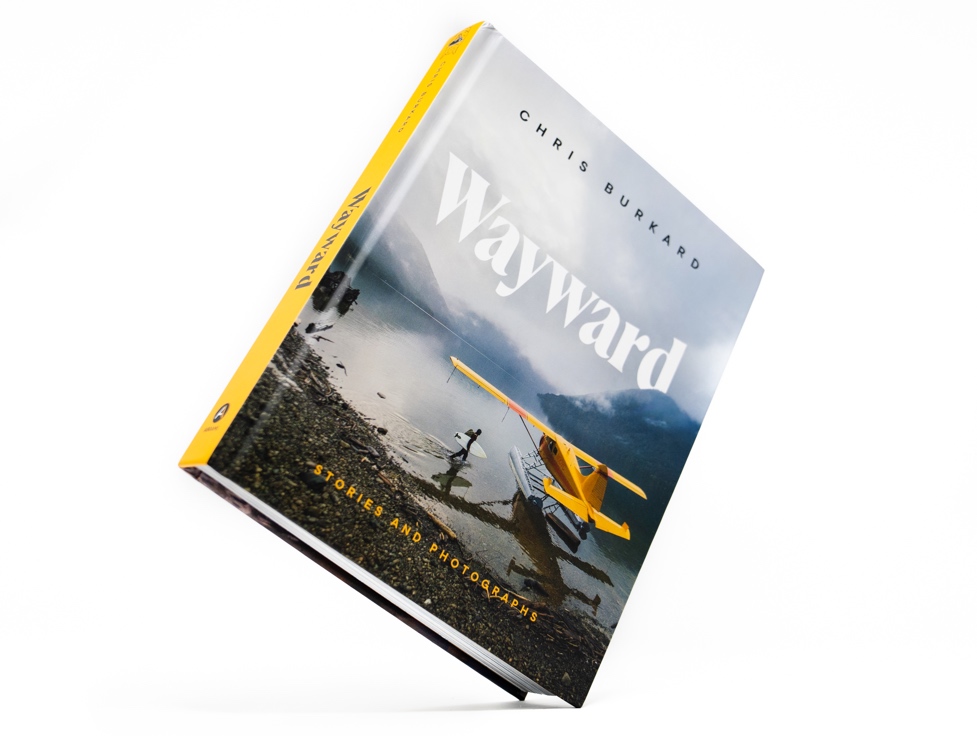
Photos courtesy of Chris Burkard
—
Download on Apple Podcasts
—
Download on Spotify
—
Download on Google Podcasts
—
Download on Overcast
—
EPISODE NOTES
Topics Discussed:
- 5:00 – How the pandemic has been for Chris and his family
- 9:25 – Process of writing the book
- 14:00 – Thoughts when looking back at his early work
- 17:30 – Early challenges and localism
- 23:45 – Patagonia’s role in Chris’s artistic evolution
- 27:40 – Importance of having the confidence to be yourself
- 31:30 – Overcoming self-doubt
- 33:45 – People Chris trusts to give honest opinions
- 36:45 – How Chris transitions from hardcore adventures back into “real life”
- 40:30 – Reevaluation of risk as he gets older
- 42:40 – Lessons from suffering
- 44:00 – Why Chris continues to focus his creative energy on books
- 54:00 – Importance of sharing the experiences with others
- 58:30 – Projects in the works
Information Referenced:
- Chris Burkard
- Wayward by Chris Burkard [Amazon / Bookshop]
- The Constant Gardener by John Le Carre [Amazon / Bookshop]
- California Surf Project by Chris Burkard [Amazon / Bookshop]
- Patagonia
- Surfer Magazine
- Keith Ladzinski
- Distant Shores by Chris Burkard [Amazon / Bookshop]
- John Muir
- Ansel Adams
- Edward Weston
- Edward Abbey
- Jimmy Chin
- There and Back by Jimmy Chin [Amazon / Bookshop]
- Corey Rich
- Paul Nicklen
- Hampton Sides
Enjoy this episode? Then you might like these too:
- Pete McBride – A Passion for Water & Wild Places
- Hampton Sides, Part 3 – Tales from a Most Excellent Adventure
- Peter Heller – Chasing the Flow
- Iris Gardner – Living with Intention
- Heather Hansman, Part 2 – The Fascinating Story of Skiing’s Past, Present, & Future
- Kelsey Johnson – Chasing Her Artistic Ambitions
- Duke Phillips IV – Living with the Land
2021 Reads

A comprehensive list of every book I recommended in 2021, taken directly from my bimonthly book recommendations email.
Thirteen Moons by Charles Fraiser – I don’t read as much fiction as I should, but when I do, I’m drawn to epic, sweeping novels set in landscapes that I know and love. Thirteen Moons is one of those books– it’s set in the Appalachian Mountains of North Carolina and follows the life of a teenage orphan who is adopted by a Cherokee Chief. The book spans several notable historical periods, including the Trail of Tears and the Civil War, and it highlights the respective heartbreaks and horrors in that unique way that only novels can. But what I loved most about this book were his depictions of the lush, temperate landscape where I experienced my first serious-to-me outdoor adventures. Frazier (who also wrote Cold Mountain) is a master of describing the sights, smells, and sounds of the rhododendron-covered coves of the North Carolina mountains– if someone can do it better, I need to read their work immediately. [Another epic novel that you need to read is Painted Horses by Malcolm Brooks.]
Team Of Teams: New Rules of Engagement for a Complex World by Gen. Stanley McChrystal – I’m slightly obsessed with elite military leaders, so McChrystal’s writings and media appearances always command my full attention. I mean, the guy only eats one meal a day and runs seven miles every day… how could I not be obsessed? This book explains the foundational shift in the U.S. military’s leadership structure during the Iraq war of the 2000s. Technological advances rendered the U.S.’s tried-and-true top-down leadership model ineffective against an outgunned but tough and nimble insurgent force. As the war raged on, McChrystal had no choice but to upend traditional models and establish a more fluid, more open, more trusting system for distributing, analyzing, and responding to quickly changing information. The book is exceptionally well written, complex yet understandable, and offered me a new approach to leading and being led in today’s fast-paced, information-overloaded world. [The best leadership book I’ve ever read is Endurance: Shackleton’s Incredible Voyage by Alfred Lansing.]
I Hate Running And You Can Too: How To Get Started, Keep Going, And Make Sense Of An Irrational Passion by Brendan Leonard – The uber-prolific Brendan Leonard is at it again, this time with optimistic and hilarious encouragement for runners of all stripes– from even-keeled 5K enthusiasts to out-of-their-gourds 100-miler masochists, and everyone in between. Combining his trademark hand-drawn charts with insightful lessons from his own running adventures, Brendan explains why a commitment to the sometimes-silly practice of running is a worthy pursuit. While I love (and need) the encouragement for running, I believe the book’s lessons can be applied to any “irrational passion”– just substitute “writing” or “acting” or “creating” wherever the word “running” appears. Voilá, you’ve got yourself a customized book chock-full of level-headed, positive-minded encouragement to pursue whatever crazy, challenging passion is consuming you. I was lucky enough to receive an advanced copy– the book will be officially released on March 16th. [And speaking of encouragement for creative projects, Brendan’s Make It Till You Make It is a book I revisit often.]
Caste: The Origins of Our Discontents by Isabel Wilkerson – While I always prefer books to marinate in my brain for a few months before making bold claims about them, I can confidently say that Caste redefined my framework for thinking about race and class here in the U.S. I grew up in the rural south, where there were very clear delineations between subsets of the population– divisions often based on skin color. But after reading Wilkerson’s analysis, I have a more substantive, holistic understanding of those divisions– divisions created by what she defines as a caste system. Wilkerson combines a broad range of world and U.S. history with masterful analogies to make a strong case that racial divides here in the U.S. are a symptom of a larger, deeply rooted hierarchal social structure. I’m admittedly poorly read in subjects related to race and socioeconomic disparity, but I’m looking forward to continuing my exploration with books that will expand on Wilkerson’s point of view– and most importantly, challenge my own. [I’m currently being challenged by Roxanne Dunbar-Ortiz’s An Indigenous Peoples’ History of the United States. Full recommendation coming in my April email.]
Wild Like Flowers: The Restoration Of Relationship Through Regeneration by Daniel Firth Griffith – Regenerative Agriculture is all the rage these days, finally getting its due in mainstream publications such as the New York Times and Wall Street Journal. While there are plenty of resources for understanding the technical details of regenerative farming and ranching, Wild Like Flowers provides thoughtful, poetic insights into the philosophies behind the practices. I was honored to blurb the book, so I’ll let that serve as my official recommendation: “Daniel Griffith masterfully weaves together history, philosophy, ecology, and literature into one poetic narrative that speaks directly to those of us who deeply love the land. Wild Like Flowers is one of those rare books that simultaneously inspires, educates, and awakens the reader to the promise of regenerative agriculture and its ability to heal our land, our planet, and, ultimately, ourselves.” [For a deeper dive into regenerative ag, check out Jim Howell’s For the Love of Land: Global Case Studies of Grazing in Nature’s Image.]
On Having No Head: Zen and the Rediscovery of the Obvious by Douglas Edison Harding – Here’s a niche subject: If you’ve ever wanted to delve into the philosophy of “non-dual awareness,” you’ll gain a lot from this book. But if you are currently wondering, “What the hell is non-dual awareness” and/or “did Ed get another concussion?,” I’d encourage you to skip this one. For those still with me: the book is quick, dense, and mind-stretching, and it offers an unconventional approach to understanding the illusion of “self.” So if you enjoy running your brain through the wringer with these types of thought exercises, or if you have experience with non-dual mindfulness practices, I think you’ll find this book fascinating. Or, if your interest is ever-so-slightly piqued, read Sam Harris’s Waking Up for an intro to the subject. OR… if you think this is all foolishness, but could still use some down-to-earth spiritual encouragement from a certified legend of a human being, check out McConaughey’s Greenlights.
Spirit Run: A 6,000-Mile Marathon Through North America’s Stolen Land by Noé Álvarez – A good buddy sent me this book, insisting that I’d love it. I did. It’s the true story of Noé Álvarez, a first-generation American of Mexican descent who walks away from a full scholarship at a well-regarded liberal arts college to run the length of North America. And the run was not some kind of high-dollar adventure travel “glamping” trip– it was a hardcore, barebones grind alongside Native American runners who approached the endurance challenge with the reverence of a religious quest. While I enjoyed the adventure narrative that chronicled the run, what has stuck with me is Álvarez’s descriptions of his parents’ lives– their harrowing journey to the U.S., the backbreaking work of processing fruit for minimum wage, and their perpetual struggle to avoid falling apart, both financially and physically. An eye-opening, perspective-shifting book for sure. [For a memorable adventure tale based in the Mexican wildlands, check out God’s Middle Finger: Into the Lawless Heart of the Sierra Madre by Richard Grant]
The Home Place: Memoirs of a Colored Man’s Love Affair with Nature by J. Drew Lanham – I was honored to be asked to interview Dr. Lanham for a virtual conference here in Colorado, so I quickly got to work absorbing all of his books and articles. He’s a birder, naturalist, hunter-conservationist, professor, poet, writer, and Ph.D.– a fascinating guy, to say the least. The Home Place is his personal story of growing up in rural South Carolina, a story that delves into his family’s deep connections to the land and natural world. He also explores the sometimes opposing family forces that shaped him into “A mystical type-A… an oil and water amalgam whose soul is pulled to opposite poles.” One of my favorite aspects of Dr. Lanham’s story is how he walked away from a sure-fire career in engineering to pursue his passion for wildlife, despite the uncertainty and societal/racial pressures to follow the “normal path.” An inspiring, enlightening, and memorable book. [If birds are your thing, I also recommend David Gessner’s Soaring with Fidel: An Osprey Odyssey from Cape Cod to Cuba and Beyond.
Sparrow Envy: Field Guide to Birds and Lesser Beasts by J. Drew Lanham – This is Dr. Lanham’s most recent book, a collection of poems, short stories, and meditations that run the gamut from eastern meadowlarks to whitetail deer, racial injustice to practical advice for birders. I’m generally intimidated and/or confused by poetry, but I connected with Sparrow Envy in an unexpected way. The book refined some of my own incomplete and evolving ideas regarding race and inclusion, while also rekindling my commitment to teaching my daughters about our backyard birds. Just as a powerful novel can sometimes communicate truths in a deeper, more visceral way, Dr. Lanham’s poems provided much-needed insights across a range of topics that are important to me. [Two other books of poetry I’ve loved are Ragged Anthem by Chris Dombrowski and One Sentence Journal by Chris La Tray]
Hell’s Angels: A Strange and Terrible Saga by Hunter S. Thompson – Despite never having read anything by him, I’ve disappeared down many a Thompson-inspired internet rabbit hole, gawking at his raucous lifestyle and prolific writing with an odd mix of admiration, aversion, and awe. I finally decided to turn off Youtube and open this book, and I was taken aback by his completely unique writing style. I’ve never experienced anything like his blend of pacing, sense of humor, journalistic bent, and personal boldness. In Hell’s Angels, Thompson embeds himself into the notorious motorcycle gang and travels around California with the outlaws for many months during the 1960s. If you know anything about Hunter S. Thompson and the Hell’s Angels, then you can probably guess what types of chaos ensue, and Thompson’s ability to tell such a crazy story is second to none. The book offers fascinating history into post-WWII America, a fun entry point into Thompson’s body of work, and a strange behind-the-scenes look into Thompson’s insane lifestyle. [After reading Hell’s Angels, you may need to cleanse the mental and spiritual pallette. I recommend Radical Acceptance: Embracing Your Life with the Heart of a Buddha by Tara Brach.]
The Dichotomy of Leadership: Balancing the Challenges of Extreme Ownership to Lead and Win by Jocko Willink and Leif Babin – And here it is, the obligatory military book. Dichotomy is the follow-up to their first book, Extreme Ownership: How U.S. Navy Seals Lead and Win, which is one of the most influential books I’ve read in the past decade. While Extreme Ownership focuses on the easy-to-misinterpret idea that leaders must take full responsibility for EVERYTHING, Dichotomy focuses on that confounding, very large gray area of leadership– situations that require flexibility and finesse. They examine the fluid situations where a simple yes-or-no, black-or-white prescriptive solution will simply not work. As with Extreme Ownership, the authors offer real-life lessons from the battlefield countered with real-life case studies from the business world. These guys’ experiences as highly decorated SEALs and renowned leadership consultants give them a unique perspective into leadership across the spectrum, and their theories are equally humble, effective, and wise. [Another influential military-focused book was Boyd: The Fighter Pilot Who Changed the Art of War by Robert Coram.]
Two of my buddies recently released beautifully crafted coffee table books that I’ll be proud to display for decades to come. For those of you connected to the tidal marshes and salt air of the Carolina coast, I recommend Undertones: Gifts of a Southern Tide by Douglas Cutting and Nan Young Carey. For those who love to venture into the wide-open spaces for days or weeks on end– or just want to read about it and look at stunning photos– I check out The Camping Life: Inspiration and Ideas for Endless Adventures by Brendan Leonard and Forest Woodward.
Quiet Desperation, Savage Delight: Sheltering with Thoreau in the Age of Crisis by David Gessner – The uber-prolific David Gessner is at it again, this time diving deep into the life of one of his most significant literary and personal influences: Henry David Thoreau. But rather than write a book on some obscure, yet-to-be-analyzed aspect of Thoreau, Gessner extracts the most valuable ideas from Thoreau’s life and offers them to us, the readers, as tools for dealing with this nutty world we’re living in. The book begins in March 2020, just as society was realizing the threat of COVID, and follows Gessner through the rest of the year, as he attempts to find his way through the ensuing madness using Henry’s wisdom as a guide. He obviously digs into important Thoreau-ish themes such as self-reliance and civil disobedience, but also meanders into many other prescient topics– our overly connected electronic world, climate change, the creative process, his famed waterfront writing shack, and more. A timely, wise, important, hilarious, irreverent, and useful book that could not have entered my life at a better time. [For another take on global pandemics, check out Peter Heller’s The Dog Stars.]
A World Without Email: Reimagining Work in an Age of Communication Overload by Cal Newport – Through his books, blog, and podcast, Cal Newport has been the Obi-Wan to my Luke in providing me the tools to fight off the ever-increasing onslaught of information overload. A PhD-level computer scientist by trade, Newport understands the value of technology but fairly and clearly analyzes its downsides, especially when it comes to social media and email. The first half of this book is Newport’s thorough and convincing argument detailing why email is inefficient, as well as some history on how it became the ubiquitous tool that dominates so much of our days. The second half offers some reasonable alternatives to email, mostly through case studies of businesses that have managed to bypass the “hyperactive hive mind” work culture that email encourages. [Newport’s book Deep Work: Rules for Focused Success in a Distracted World is one of the most important books I’ve read.]
Effortless: Make It Easier to Do What Matters Most by Greg McKeown – As you can probably tell from this title and the one above, I’m becoming obsessed with decreasing distraction. My goal is to focus much less on nonsense and significantly more on the important-to-me, truly enjoyable projects that fill my to-do list. In this quick and easy-to-read follow-up to his best-selling book Essentialism, McKeown offers specific techniques for accomplishing the most important tasks in your life, but without the whole “nose to the grindstone” tough-guy mentality. While I didn’t think that it offered any new-to-me, perspective-shifting ideas, it did offer many fresh, actionable tactics and thought exercises that have proven to be beneficial. I particularly connected with the ideas in the chapters “Invert: What If This Could Be Easy” and “Start: The First Obvious Action,” but I underlined sections in every chapter. [One of the best productivity books I’ve read in years was Atomic Habits by James Clear.]
Sidecountry: Tales of Death and Life from the Back Roads of Sports by John Branch: If you’re not a sports fan but have found yourself engrossed by a New York Times sports story, odds are, that story was written by John Branch. Branch says he likes to write about “ordinary people tangled in something extraordinary,” and sports just happens to be the common theme that binds all of his work together. Whether writing about the first ascent of the Dawn Wall on Yosemite’s El Capítan, the super-intense world of competitive dog grooming, or even the death of Kobe Bryant, Branch always gives the reader an unexpected perspective on a story that they may not have even known they wanted to read. Sidecountry is a collection of Branch’s twenty favorite stories from his career at the Times, including his Pulitzer Prize-winning story Snowfall. A perfect book to pick up for a quick chapter or to read all the way through. [You can listen to my conversation with John, or, for another excellent book of past stories, read Hampton Sides’ Americana: Dispatches from the New Frontier.]
Blood Is Not The Water by Mara Panich – As many of you longtime subscribers may have noticed, books of poetry are ever-so-slowly appearing more frequently on this list. I’m still in the learning phase and don’t have many of my own opinions about poetry. But, if someone I respect recommends a specific book of poetry, I read it. This book was recommended by friend, poet, and author Chris La Tray, who– whether he knows it or not– has exposed me to many new and challenging ideas. While I’m no expert, Blood Is Not The Water gave me the feeling of spending some time inside the mind of a strong, tough, creative, unapologetic, deep-thinking woman who has thought intensely about we humans can find our place in this weird world. I’ll look forward to revisiting these poems in the years to come. [Chris also recommended Braided Creek: A Conversation in Poetry by Jim Harrison and Ted Kooser, which has a permanent spot on my desk.]
Freedom by Sebastian Junger – I will read anything that Sebastian Junger writes. This short-n-sweet book is really more of a long essay, and it digs into the question of what the ridiculously overused word “freedom” actually means. In a style that is completely unique to Junger, he efficiently melds ideas from history, sociology, war journalism, sports, and more to offer up a well-crafted examination of what it means to be truly free. The book is built around the story of Junger’s 400-mile hike of an East Coast railroad line, which he completed with a few friends and his dog. Are they free to do whatever they want and go wherever they please? Or are they bound by reliance on each other for food and safety, and therefore not free at all? In the end, it doesn’t seem that Junger has a hard-and-fast definition of freedom– just like all things related to humans, it’s complicated. But I did love this quote: “…the inside joke about freedom… is that you’re always trading obedience to one thing for obedience to another.” [Junger’s book Tribe: On Homecoming and Belonging is one of my all-time favorites.]
Pushed Out: Contested Development and Rural Gentrification in the US West by Ryanne Pilgeram – Full disclosure, I have not yet finished this book, but it is incredibly impactful– it’s a book I’ve been hoping someone would write for many, many years. Ever since Europeans set foot in the American West, there has been a cartoonish level of feast and famine– frantic extraction of resources followed by a bust that leaves the boomers running for the coasts and a huge mess in their wakes. Pilgeram is a college professor who brings her academic expertise to help us readers understand how these wild cycles impact rural communities, specifically examining how economically depressed towns respond when they become havens for tourism and second homes. Pilgeram has a talent for presenting dense, academic research in an engaging and fun-to-read style, and I think this book should be required reading for anyone who works in land conservation in the West. [For more on the idea of “Boomers” and “Stickers,” read Wendell Berry’s It All Turns on Affection: The Jefferson Lecture and Other Essays.]
Godspeed by Nickolas Butler – This novel came highly recommended by a trusted friend who said, “Ed, I know you don’t read much fiction, but you’ll love this. Trust me.” And trustworthy he was– I cranked through the entire book in just a few days. Set in my old stomping grounds of Jackson Hole, Godspeed has all of the components that make for a great story– action, suspense, wild landscapes, complex characters striving toward a goal against all odds. It also touches on many challenges facing the modern-day West, including income inequality, rural gentrification, and substance abuse. But at its core, it’s a book about ambition, greed, and that classic yet mostly unattainable American fantasy of striking it rich and ending up on Easy Street. If you’re looking to be entertained and educated, I highly recommend this book. [Another western-based novel that I really enjoyed was Callan Wink’s August.]
Sugar in the Blood: A Family’s Story of Slavery and Empire by Andrea Stuart – I’ve recently become obsessed with sugar, mostly because the sight of a distant pack of Sour Patch Kids instantly transforms my well-behaved young daughters into wild beasts. I had a hunch that the history of sugar would be somewhere between disturbing and horrifying, and this book confirms that, yes, it’s horrifying. Stuart traces her family’s lineage back to the 17th Century when her ancestor immigrated to Barbados to build a new life in the new world. From there, the business of sugar shaped her family tree for centuries to come. While I loved this book and all of its storylines, its descriptions of the horrors of slavery and the slave trade are permanently burned into my psyche. I was surprised to learn how the Caribbean sugar business perfected the model of plantation-based agriculture– a model that would go on to be the basis for the slave-based economy of the American South. A powerful, memorable book that filled some big gaps in my understanding of history. [For another fascinating read about a rough business, check out The Fish That Ate the Whale: The Life and Times of America’s Banana King by Rich Cohen]
Think Again: The Power of Knowing What You Don’t Know by Adam Grant (audiobook) – I’m not sure when Adam Grant started working on this book, but its publication could not have come at a better time. It’s about the importance of changing our mind– of being perpetually curious, always seeking out new ideas, and being willing, even excited, to adjust our mental models when new information is presented. One of my favorite parts of the book is his discussion of imposter syndrome and how doubting oneself can create a level of humility and curiosity that keeps individuals sharp and intellectually humble. Overall, I’m in complete agreement with Grant’s ideas on this topic– the whole reason I read all these dang books is to eliminate blind spots and change my mind on topics as needed. As Sam Harris says, “I don’t want to be wrong for a moment longer than I have to be.” I hope that many people will read (or listen to) this book. We’d all be better off if everyone were slightly more curious and flexible in their thinking. [Michael Pollan’s How to Change Your Mind offers a drastically different approach to flexible thinking.]
Discipline Equals Freedom: Field Manual by Jocko Willink (audiobook) – I read the paper version of this book several years ago and enjoyed it– hard-nosed advice from a former Navy SEAL about how to live a more disciplined life. But a few months ago, I revisited it in audio format, and I have become obsessed. No exaggeration, I have listened to the book’s “Part One” at least ten times over the past few months. If you’re not familiar with Jocko, you’d be justified if your first impression was something along the lines of “Wow, this guy is intense” or “This is a little over the top.” I even had similar first thoughts. But as I’ve piped Jocko’s voice into my head for many hours over many weeks, his wisdom regarding leadership, discipline, and living a meaningful life are proving to be straightforward and effective. He offers no “hacks” or shortcuts, just firm, time-and-battle-tested wisdom– wisdom that is directly benefiting me today. [Another powerful audio recording that I’ve listened to many, many times is Don’t Bite the Hook by Pema Chodron.]
Close Range: Wyoming Stories and Bad Dirt: Wyoming Stories 2 by Annie Proulx – When time is tight or I’m just too damn tired to read for extended periods of time, I turn to short story compilations to keep my reading momentum moving forward. Someone gave me these books back in early July, I’ve thoroughly enjoyed reading a story or two either before bed or as I’m lying on the sofa nursing sore legs. The most popular story from these two volumes is Brokeback Mountain, which is obviously an exceptional piece of writing. But the story that I continue to think and wonder about is The Hellhole, the first story in Volume 2. I even dreamed about it. In all of these stories, Proulx merges her poetic writing style with her deep connection to the Wyoming landscape to create stories that are fun to read… but continue to rattle around in my brain for many weeks later. I’m looking forward to exploring more of her novels. [A few other short story compilations for your consideration: Sidecountry by John Branch, Americana by Hampton Sides, A Man’s Life by Mark Jenkins, The Best of Outside by Outside Magazine, Pecked to Death by Ducks by Tim Cahill, and Kick Ass: Selected Columns of Carl Hiaasen.]
A Walking Life: Reclaiming Our Health and Our Freedom One Step at a Time by Antonia Malchik – It’s no secret that here in America, we are deeply mired in an impressive mess of societal crises. While there is obviously no one-size-fits-all panacea, a recommitment to the simple act of walking could be an excellent place to start. In this informative and wide-ranging book, Malchik explores the importance of walking from physical, mental, and societal perspectives. She also investigates how we humans’ transition from bipedal mobility to car-centric transportation has eroded our health and communities. Malchik’s writing style reminds me a bit of Bill Bryson’s— she seamlessly transitions from one fascinating topic to another, bringing the reader along for an engaging journey across a wide range of topics that go far beyond the book’s primary subject matter. [For more on community and mental health, check out Lost Connections: Why You’re Depressed and How to Find Hope by Johann Hari.]
The Guide by Peter Heller – If you’ve ever driven the off-the-beaten-path road from Colorado’s Taylor Reservoir to Crested Butte, then you know the spectacular setting for this novel. Even in real life, it’s a prime location for an action-packed thriller– the landscape is remote, rugged, at times suffocating, and mostly owned by the 1%-of-the-1%. I love everything Peter Heller writes– both fiction and nonfiction– but The Guide may be my favorite to date. It combines Heller’s uncanny ability to describe western terrain and the art of fly fishing with his gift of writing a suspenseful, page-turner of a tale. The story is also structured around several present-day, front-of-mind storylines, including a global pandemic and the weird obsessions of odd-ball billionaires. I cranked through this book in a single day, an accomplishment that speaks less to my reading speed than to the super-addictive quality of this book. [For insights into Heller’s writing process, check out my 2019 conversation with him.]
The Exotic: Intrigue and Cultural Ruin in the Age of Imperialism by Hampton Sides – Just when I’d begrudgingly accepted the grim reality that I would have to wait at least two more years for Sides’ next book, he goes and releases The Exotic. It’s much shorter than his typical 400+ page tomes but much longer than a magazine article, giving the reader a chance to soak in Sides’ one-of-a-kind historical storytelling in just a few hours of reading. The Exotic details the life and unbelievable adventures of Mai, who was the first Polynesian to set foot on British soil. In 1774, Mai hitched a ride to England with Captain James Cook, where he spent several years hobnobbing with the highest of high society, including King George. Despite being a commoner in his Polynesian culture, Mai was a genuine celebrity in Europe, which made his eventual return to the South Pacific quite jarring, at times comical, and eventually tragic. A wonderfully entertaining tale about a little-known historical figure whose story deserved to be told. The Exotic is available exclusively on Scribd. [Another of my favorite Sides books is Hellhound on His Trail: The Electrifying Account of the Largest Manhunt in American History.]
Arbitrary Stupid Goal by Tamara Shopsin – A big thanks to my pal Brendan for recommending this fantastic book– there is a 0% chance I would’ve read it without his enthusiastic endorsement. I’ve never encountered a book quite like it. Everything from its meandering, time-jumping storyline to the seemingly random number of words on each page created a completely unique-to-me reading experience. It’s the hilarious and surprisingly touching story of the author’s upbringing in New York City’s frenetic Greenwich Village, a community defined by one-of-a-kind characters and some of the more bizarre tales I can remember reading. But buried within the craziness are some impactful lessons about community, family, creativity, and purpose– lessons that are still rattling around in my head two months later. I’m not sure how Shopsin convinced a publisher to take a chance on such an unorthodox book, but she did and I’m glad and my life is better for having read it. [Another weird and hilarious book is David Sedaris’s When You Are Engulfed in Flames.]
Gunfight: My Battle Against the Industry That Radicalized America by Ryan Busse – For many years, Ryan Busse was one of the country’s top gun salesmen. Over the course of his career, he transformed a small, fledgling gun company into an internationally recognized brand and was repeatedly recognized by the NRA as a top-performing firearms executive. But Busse’s love of public lands and conservation, combined with his dogged refusal to be bullied or told what to think, led to an awakening of sorts– a realization that the firearms industry had transformed from a sportsman-centered business into a politically driven machine that uses decisiveness and fear to grow profits. To be clear: This is not an anti-gun book. Rather, it’s a nuanced examination of how and why the gun industry moved toward such extreme rhetoric, written by a uniquely qualified insider. If you’re sick of binary thinking and looking for a thoughtful explanation of guns and gun culture, I highly recommend you give Gunfight a read. [And if my simple mention of the word “gun” infuriates you from either a left or right-wing perspective, please don’t email me. Instead, read All the Rage: Buddhist Wisdom on Anger and Acceptance.]
Shotgun Lovesongs by Nickolas Butler – Okay, I’m now officially a Nickolas Butler superfan. Back in August, I read, loved, and recommended Godspeed, his most recent novel. I’m now plowing through all of his work, starting with Shotgun Lovesongs, his debut novel. It’s the story of four friends who grew up together in small-town Wisconsin– men who are now in their mid-thirties and are working their way through the familiar challenges that accompany the ebb and flow of life as a grown-up. I’ve never been to Wisconsin, nor am I a member of an inseparable cohort of brother-like childhood friends. Still, Butler’s masterful storytelling made me feel a deep connection to all of the characters, as well as Wisconsin. I was fully consumed by the story from page five onward, and, as all great novels do, it explored specific themes (friendship, community, love, work) more thoroughly and intensely than any nonfiction work could ever do. I’m excited to dig into more Butler novels in the coming months. [A novel I think about daily is Steinbeck’s The Grapes of Wrath.]
Powder Days: Ski Bums, Ski Towns and the Future of Chasing Snow by Heather Hansman – For many years, I’ve wished that someone would write a book about the social, economic, and environmental complexities of ski communities– so I’m thankful that Heather Hansman apparently read my mind and did it. Hansman is the perfect person to write this book. She’s an accomplished outdoor journalist who also logged many years as a bonafide ski bum in resort communities around the West. Drawing on her past personal experiences scraping by in ski towns coupled with present-day journalistic research in areas ranging from Jackson Hole to Silverton, Hansman investigates all aspects of American ski culture, from its post-WWII historical roots to today’s issues of climate change and income inequality. Whether you’re a hardcore skier (I am not) or a curious observer of the evolving culture of the outdoor recreation (I am), I wholeheartedly recommend this educational, entertaining, insightful, witty, and timely book. [For deep insights into another obsessive sport, read Monte Burke’s Lords of the Fly: Madness, Obsession, and the Hunt for the World Record Tarpon.)
The Hearts of Men by Nickolas Butler – This is the third Nickolas Butler novel I’ve read in the past five months, and once again, he knocks it out of the park. The Hearts of Men traces the lives of two young boys into adulthood– from their early, formative experiences at a Wisconsin summer camp, all the way through the Vietnam War and deep into middle age. In all of his work, Butler has a remarkable ability to dig deep into emotional, sometimes-hard-to-talk-about concerns that can consume the psyches of men– ideas around duty, work ethic, bravery, loyalty, community, and the depths of friendship. (At least these are some of the things that rattle around in my man-brain, but I could be projecting.) At times intense, at other times heartbreaking, Butler uses his characters and the Wisconsin landscape to explore relatable, important ideas about people, relationships, and our complex lives– ideas that are best understood through masterfully crafted fiction just like this. [I’ll go ahead and re-recommend the other Butler novels I’ve read: Godspeed and Shotgun Lovesongs.]
The Molecule of More: How a Single Chemical in Your Brain Drives Love, Sex, and Creativity–And Will Determine the Fate of the Human Race by Michael E Long and Daniel Z Lieberman – Could this be the world’s longest subtitle? Seems excessive. But don’t let the cover’s wordiness scare you off. I found this book to be a quick read and highly educational, and it gave me some new insights into why we humans act as crazy as we do. On a very primitive, biological level, we’re programmed to crave specific things and activities, and dopamine is the culprit inside our noggins that powers all of our incessant impulses. The book is organized around areas of life that often reveal humans’ nuttiest behavior–love, drugs, politics, etc.–and then the authors break down dopamine’s role in encouraging said nuttiness. I learned a lot from this book, but would’ve loved a deeper dive into dopamine’s involvement with our addiction phones/internet/social media, although that topic would likely need to be a book unto itself. [For a detailed audio introduction to dopamine and its effects, check out this Stanford professor Andrew Huberman’s podcast on the topic.]
A Decade of Howler Brothers – I’ve had the great fortune of getting to know some of the all-stars behind the Austin, TX-based brand Howler Brothers– a one-of-a-kind, outrageously creative outdoor apparel company that blends “surf culture mixed with vintage western wear mixed with streetwear mixed with tiki gods mixed with fly fishing all set to the soudtrack of a dub reggae mariachi country band.” This five-pound behemoth of a coffee table book is a celebration of Howler’s first ten years in business. It features 300 pages of photography, art, design, and words from renowned fly fishing guide JT Van Zandt and Howler’s founders Chase Heard and Andy Stepanian. The team at Howler have served as great inspiration to me that it is indeed possible to meld together seemingly outlandish and unrelated passions into one single vision– a vision that can resonate with a surprisingly large tribe of like-minded weirdos, if presented with humor, humility, and authenticity. I consider this less of a “book” and more of an instruction manual for creative thinking and sharing your own original ideas with the world. [If running and creativity are your things, check out I Hate Running and You Can Too by Brendan Leonard.]
Four Thousand Weeks: Time Management for Mortals by Oliver Burkeman – For the last few years, I’ve become more and more skeptical of the omnipresent productivity gurus and their promises of “inbox zero” and other increasingly ridiculous “life hacks.” In this book, Burkeman respectfully yet thoroughly destroys the foundational ideals of uber-productivity cults. He makes a strong case that the very act of endlessly seeking to squeeze more and more out of every minute is the main source of many people’s anxiety and discontent. My two main takeaways are: 1) Tight constraints– on time, attention, and options– will lead to more contentment over the long haul than having the freedom to do whatever the hell you want whenever you choose, and 2) The pursuit of “getting it all done” is a game that you cannot win, so focus on prioritization, quit frantically rushing, and don’t take yourself so seriously. It’s more of a philosophical treatise than a “tools & tactics” manual, and I’m sure I will reread it in the coming months. Highly recommend!
Taking the Leap: Freeing Ourselves from Old Habits and Fears by Pema Chodron – I’ve said it many times, but I firmly believe that Pema is one of the wisest humans ever to walk the earth. She has an uncanny ability to present complex, sometimes woo-woo, ideas around mindfulness and spirituality in a relatable and easily understandable manner, even for a lunk like me. Taking the Leap follows the format of many of her other books– relatively short but powerful chapters that can be read individually or as a whole. Using Buddhist principles (without being preachy or indoctrinating), she offers up ideas that have helped me become more aware of just how wild and out of control my mind is. Most importantly, she offers actionable insights that have allowed me to (sometimes) not get caught up in the chaos of my consciousness. I owe Pema a lot… as does my wife, because my wife is the one who has to deal with me on a daily basis! [If you are new to Pema and looking for a good entry point, I recommend When Things Fall Apart: Heartfelt Advice for Difficult Times.]
7 Treasures of Awakening: The Benefits of Mindfulness by Joseph Goldstein – This book was sitting mostly unread on my Kindle, originally downloaded in 2014. It’s a lengthy excerpt from Goldstein’s well-known book Mindfulness: A Practical Guide to Awakening. I’m not sure what prompted me to start reading it again, but I’m glad I did. Goldstein is one of the United States’ most admired mindfulness teachers, receiving top praise from everyone from the most committed Buddhists to the most vocal atheists. If you are new to mindfulness or Buddhist theory, I would suggest you steer clear of this book for the time being–I’m guessing that when I started it back in 2014, I promptly spaced out in the midst of all the Dharma jargon. But now, nearly eight years later and more deeply entrenched in mindfulness lingo, I found the book very meaningful and useful, even for a non-Buddhist like me. [You can listen to some lectures from Goldstein on Sam Harris’s meditation app, which you can try out for free for seven days.]
Relentless Solution Focus: Train Your Mind to Conquer Stress, Pressure, and Underperformance and Organize Tomorrow Today: 8 Ways to Retrain Your Mind to Optimize Performance at Work and in Life both by Jason Selk and various co-authors – As mentioned above, for the past few years, I’ve made a concerted effort to avoid self-help-type books–certain people (i.e., I) can get quickly sucked down a rabbit hole of seeking out the latest and greatest system that promises to solve all of their (i.e., my) problems. Selk is a well-regarded Major League Baseball sports psychologist, and both of these books are mostly focused on training yourself to be “relentlessly” committed to action and finding solutions, rather than getting hung up in the cycle of over-thinking and complaining. Like any ideas, Selk’s are worthless without execution, but I’ve had surprising success implementing a few of his techniques into my professional and personal lives over the past eight weeks. His ideas are simple, nothing groundbreaking here, but something about his presentation struck a chord with me, and perhaps they will with you too. [And completely unrelated to this book or any on this list, but it popped in my head so I want to recommended it: The Last American Man by Elizabeth Gilbert. One of my all-time favs.]
Reflections On My First Elk Hunt, with Adam Gall
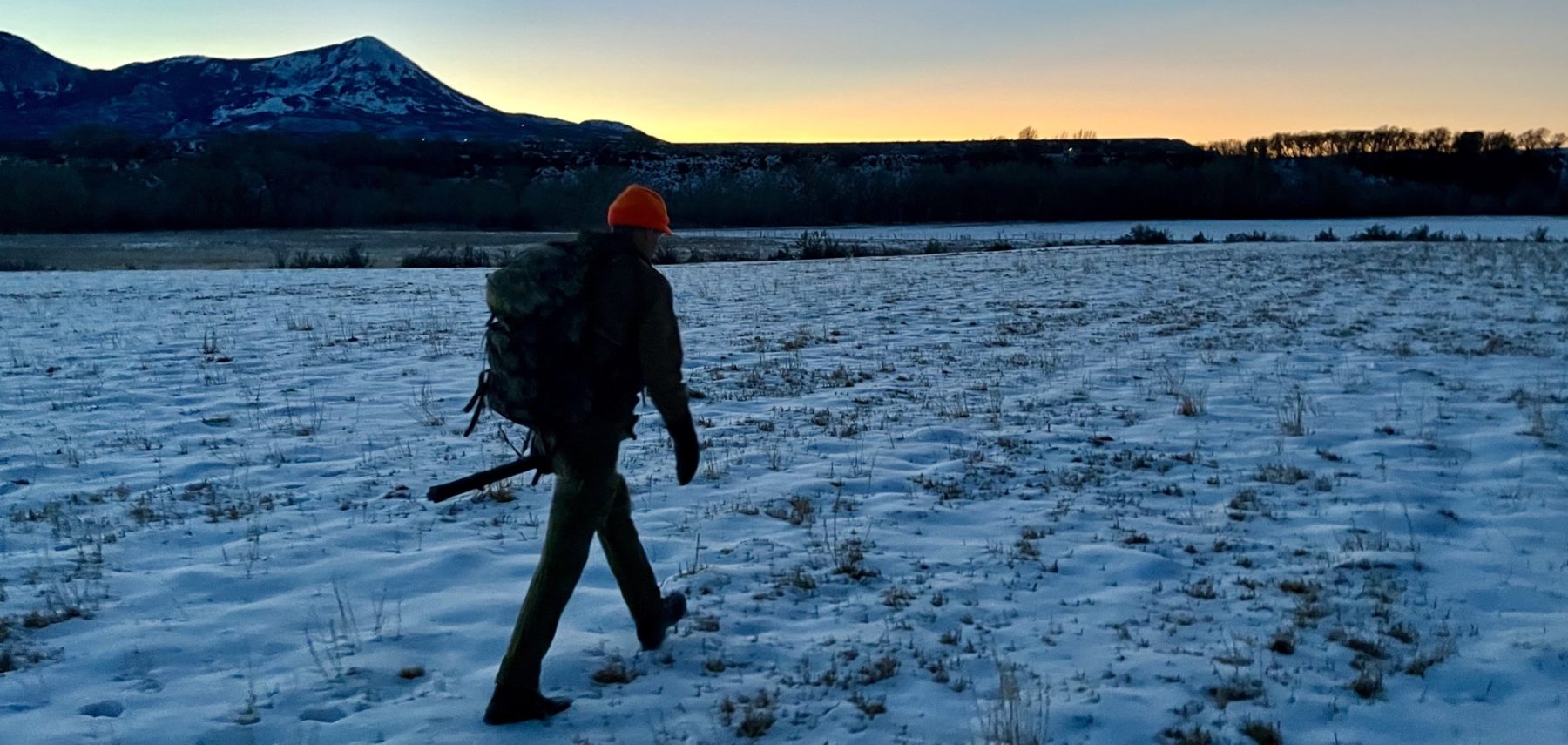
Longtime Mountain & Prairie listeners will remember Adam Gall– he’s a Colorado-based hunting guide who, along with his wife Ana, owns Timber to Table Guide Service. Adam is a highly regarded expert in the pursuit of elk and mule deer, and he offers a variety of outfitting services ranging from public land hunts for experienced hunters to private land hunts for beginners. In my first episode with Adam, we discussed his career path to guiding, which included stints as a wolf biologist and science teacher, as well as his advocacy for public lands and wildlife conservation.
In early January, I had the pleasure of joining Adam for my first-ever elk hunt, and this episode is a discussion about that extremely powerful experience. I had wanted to hunt elk ever since moving to the Rocky Mountains back in 2005, but I never took the necessary steps to learn how to do it. While I do have limited experience with bird hunting, I had zero experience hunting with a rifle. The idea of starting big game hunting from scratch was intimidating and overwhelming– plus, I have way-too-many other hobbies that fill my time– so elk hunting has been on the back burner for more than 16 years. But after getting to know Adam, learning about his skills as a teacher, and admiring his calm demeanor and reverence for wildlife, I decided that he was just the person to introduce me to the sport of elk hunting.
To be completely transparent, I was very nervous about all aspects of the hunt– my shooting proficiency, my ability to kill the elk quickly, quartering the animal, and processing the meat. I have the utmost respect for the skills required to be a responsible and effective big game hunter, so I was intent on approaching the entire endeavor with a high level of seriousness and focus. From the moment I arrived in Hotchkiss until we had processed the last pound of meat, Adam and Ana were exceptional teachers–we had a successful hunt and I left Hotchkiss with a new-found, life-changing appreciation for everything that is required to procure meat for my family.
The purpose of this episode is to provide instruction and insight for people like me– individuals who are interested in big game hunting and procuring meat but have no idea where or how to start. Even if you’ve never shot a gun, there will be useful information in this episode. Adam and I discuss all aspects of the hunt–from shooting practice at the gun range on the first day all the way to processing the meat into burger, steaks, and roasts four days later. I discuss the overwhelming emotions I felt after killing such a majestic animal, and the eye-opening experience of learning about specific cuts of meat with Ana. We discuss how Adam’s experience as a teacher makes him such an effective guide, and the importance of approaching hunting with respect, reverence, and curiosity. We talk about game management, food systems, private lands’ role in wildlife health, and much more.
I hope you enjoy this conversation as much as I did. Hopefully, it will give you the encouragement to pursue hunting if it is of interest to you. Hunting is obviously not for everyone, but as a person who eats and enjoys meat, I am very grateful to have had the opportunity to participate in all the tasks that are required to put clean, healthy meat on my family’s table.
Thanks again to Adam and Ana for the once-in-a-lifetime experience, and thanks to you for listening. Enjoy!
Photos by Ed and Adam
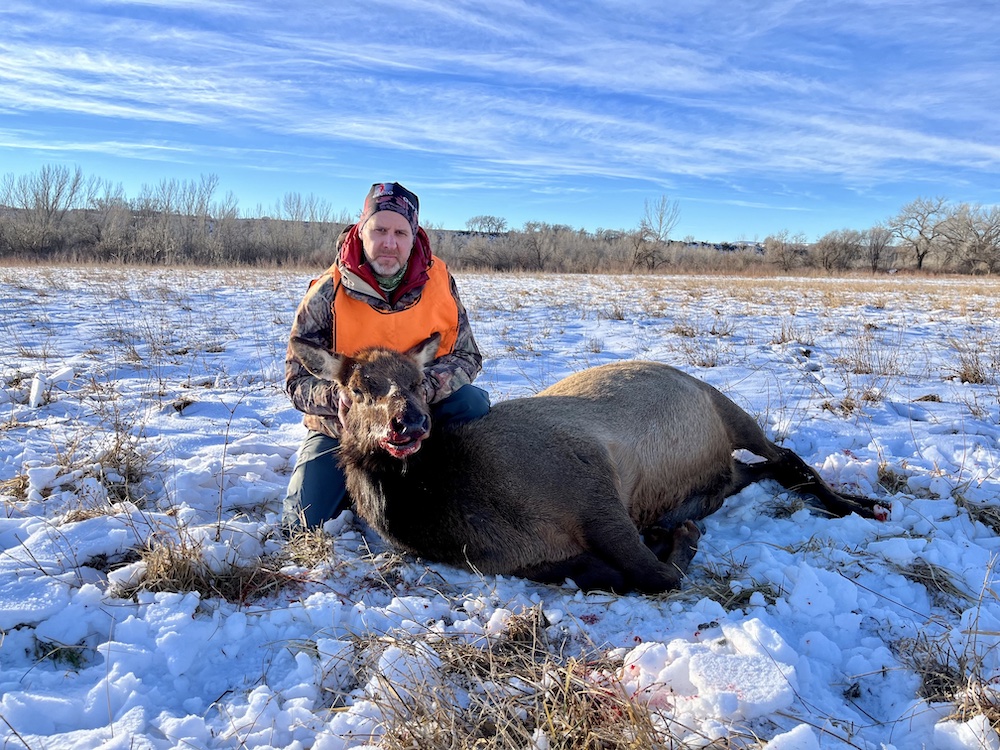
—
—
Download on Apple Podcasts
—
Download on Spotify
—
Download on Google Podcasts
—
Download on Overcast
—
EPISODE NOTES
Topics Discussed:
- 4:45 – Thanks to Adam and Ana
- 6:15 – Why Adam enjoys teaching first-time hunters
- 8:15 – Adam’s background as a teacher
- 10:30 – Balancing fun and seriousness
- 16:15 – Details of the beginner’s private land meat hunt
- 21:45 – Importance of game management on private lands
- 23:45 – Hunt preparation
- 32:15 – Morning of the hunt
- 34:45 – The kill
- 37:45 – Respect for the taking a life
- 44:45 – Quartering the animal and processing the meat
- 54:45 – A foundational shift in perspective
- 58:00 – Cooking resources and ideas
- 59:45 – Closing thoughts
Information Referenced:
- Adam’s first M&P episode
- Timber to Table Guide Service
- Dark Timber Lodge
- Hotchkiss, Colorado
- Paonia, Colorado
- Colorado Parks and Wildlfe
- Colorado Parks and Wildlife – Big Game Hunting
- Backcountry Hunters and Anglers
- Ryan Busse episode
- Kate Kavanaugh episode
- Buck, Buck, Moose: Recipes and Techniques for Cooking Deer, Elk, Moose, Antelope and Other Antlered Things by Hank Shaw – Amazon / Bookshop
Enjoy this episode? Then you might like these too:
- Ryan Busse – Standing His Ground
- Iris Gardner – Living with Intention
- Rachel VandeVoort – Harnessing the Power of Outdoor Recreation
- Dan Prenzlow – Generous Service, Humble Leadership
- Kate Kavanaugh – Regeneration & Restoration
- Mark Kenyon – A Passion for Public Lands
- Matt Skoglund – Adventures in Bison Ranching
- Chris Dombrowski – Words, Water & the West
- Jessica Wahl Turner – Outdoor Recreation & Rural Economies
18 Book Recs For My 18-Year-Old Self
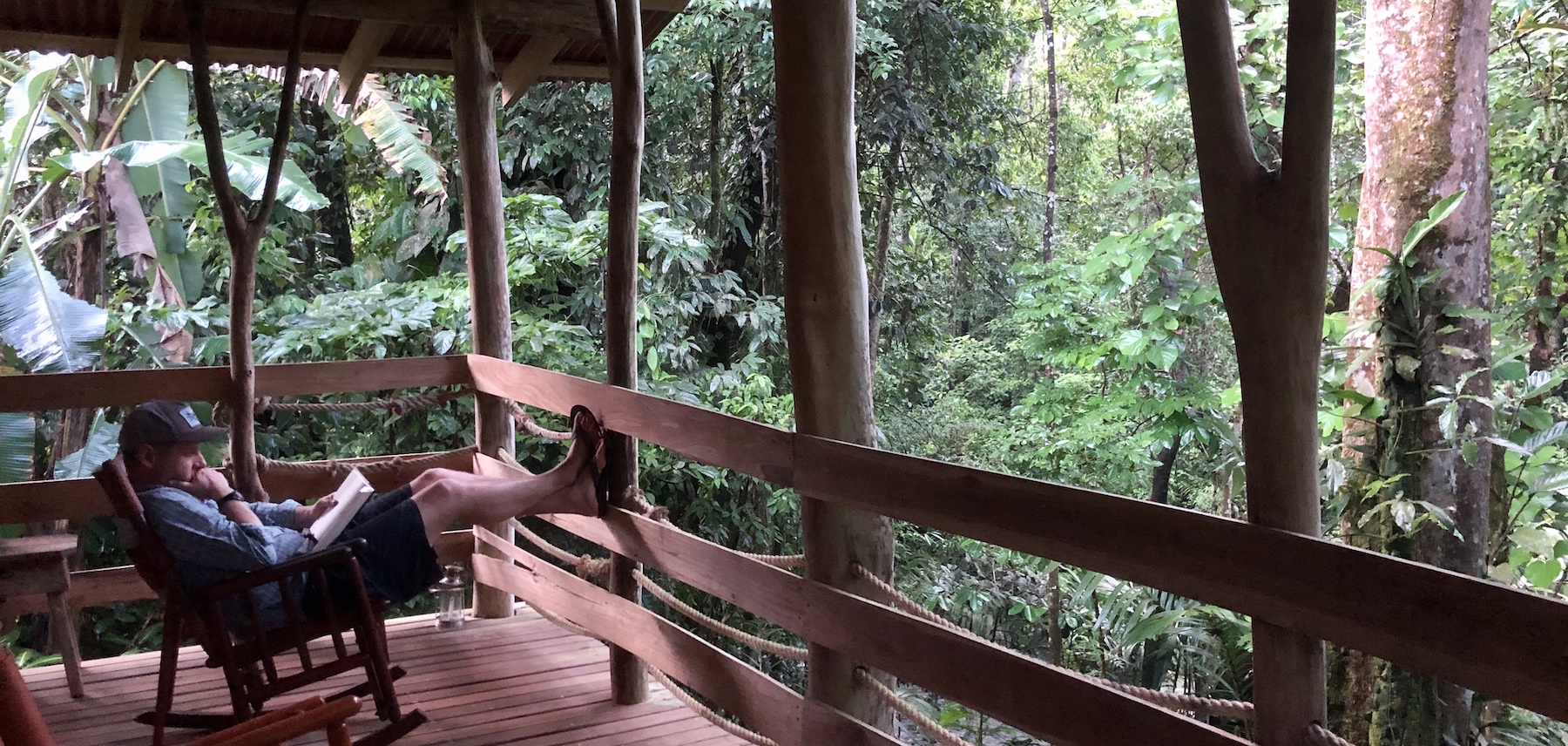
A brief history of how and why reading became so important to me, followed by 18 specific book recommendations and the lessons learned from each. If you want to skip my rambling and go straight to the books, jump on down to Part 2.
Part 1: The Backstory
I’ve always enjoyed reading but didn’t take it seriously until the ripe old age of 31. Back then, my wife and I had recently moved to Costa Rica, where I didn’t have a cell phone, internet access was sporadic at best, and our half-broken television only beamed in three channels. My hyperactive brain has always needed near-constant stimulation, so reading books was my only real option for intellectual input.
So I began reading, and reading a lot.1
I first went down a rabbit hole of Theodore Roosevelt biographies, which only reinforced my obsession with reading—TR read at least a book a day, even while President. Then I dug deep into subjects I would’ve never previously read for leisure—the history of Central America, critiques of US financial markets, new-to-me ideas on spirituality, obscure travelogues, and the occasional novel. This was before e-books were a thing, so I’d borrow books from my wife’s coworkers and beg our friends visiting from the US to load up their suitcases. Whatever I could get my hands on, I would read.
And an unexpected thing began to happen: The more I read, the less I knew. With each book completed, I realized that many of my closely held ideas and beliefs were built on an intellectual foundation that was shaky at best, uninformed and ignorant at worst. Most of what I “knew” was based on nothing more than the influence of communities I had found myself in by happenstance and/or my place of birth—not on a wide array of diverse and well-informed nuanced perspectives. It became clear that, despite being “well-educated,” I had only been operating with a small fraction of the available information. I had so much more to learn.
When I reflect back to those 12 months in Costa Rica, I think of it as the year I “woke up.” Before moving down there, I’d never really traveled internationally, so immersing myself in a foreign culture shook me up in a good way. That was also our first year of marriage, and my wife’s level-headedness, astonishing brainpower, and compassionate questioning rubbed off on me. And after layering on the hundreds of new ideas from dozens of mind-expanding books, I can confidently say that I returned to the US at the end of that year a much different, much better person—more curious, more humble, and more sure of just how little I actually knew.
In the years since, I’ve continued to approach reading with a level of seriousness that could rightly be described as weird and/or obsessive. I have no dreams of being a Jeopardy champ, so I’m not interested in gathering information for information’s sake. But I unabashedly seek out wisdom, and I’ve found books to be the most efficient wisdom-delivery system on earth.2 While I have long since forgotten much of the specific information in the books I’ve read, many of their overarching lessons remain firmly embedded in my brain, serving as a trusted guide through this increasingly nutty world.
Here and now, at age 44, I’m very happy (and relieved) with how things are working out both professionally and personally. But I often wonder “What if I’d started reading seriously at age 18?” Could I have saved myself many of the headaches and idiotic mistakes that I made from age 18-30? Would I have moved out West sooner? Quit that bullshit job at Merrill Lynch sooner? Skipped the college-years sloppiness and more quickly committed myself to the doctrine of the Strenuous Life? Would I have voted differently? Traveled more? Ditched the boring acquaintances? Worked harder to find what TR called “work worth doing”?
Who knows.
But if I could talk to my 18-year-old self, my advice would be simple: Commit to serious reading, and commit to it NOW. Not reading for good grades, but reading for life, for yourself. Read books that make you uncomfortable, books whose ideas fly in the face of everything you’ve been taught. Gather as much information and as many perspectives as possible, then make up your own mind. Don’t be a contrarian or a know-it-all asshole, but respectfully question everything. Read to understand just how much you don’t know. Fully commit to curiosity, which will produce genuine humility, which is an invaluable personality trait, especially these days.
“Okay, you know-it-all, white-haired old man, what the hell should I read?” my 18-year-old self may ask. And I’d respond aggressively: Start with the titles below, smart ass! Not for the facts and figures on their pages—you’ll eventually forget most of that stuff. But for the larger life lessons that each book imbues. And when you finish these 18, follow your newfound curiosity and pick 18 more. Read those, then repeat. Do not stop.
—
So, I’ll be right here, waiting around for time travel to become a reality so I can take this list back to 1996.3 But until then, I hope you, kind human who has read this far, will enjoy reading a few of these titles and perhaps learn a lesson or two in the process.
Part 2: The Books & Lessons
(in no particular order)
The River of Doubt: Theodore Roosevelt’s Darkest Journey by Candice Millard [Amazon | Bookshop]
Lesson: You will be surprised at how much you can fit into a day/week/month/year with adequate focus and enthusiasm.
Don’t Bite the Hook: Finding Freedom from Anger, Resentment, and Other Destructive Emotions by Pema Chodron [Amazon | Bookshop] This is an audiobook only.
Lesson: You are not at the mercy of your crazy-ass mind.
The Grapes of Wrath by John Steinbeck [Amazon | Bookshop]
Lesson: The “American Dream” is not as simple as you have been led to believe.
The Practice: Shipping Creative Work by Seth Godin [Amazon | Bookshop]
Lesson: Produce creative work, put it out into the world, repeat. And start right now.
Blood and Thunder: The Epic Story of Kit Carson and the Conquest of the American West by Hampton Sides [Amazon | Bookshop]
Lesson: A master storyteller can make even the densest topics accessible and endlessly fascinating.
Boyd: The Fighter Pilot Who Changed the Art of War by Robert Coram [Amazon | Bookshop]
Lesson: True innovators rarely adhere to social norms and/or the professional status quo.
Sugar in the Blood: A Family’s Story of Slavery and Empire by Andrea Stuart [Amazon | Bookshop]
Lesson: The “history” you were taught in school left out most of the story. Ask yourself why, then proactively seek out the missing pieces.
Deep Work: Rules for Focused Success in a Distracted World by Cal Newport [Amazon | Bookshop]
Lesson: The ability to focus is a superpower.
Caste: The Origins of Our Discontents by Isabel Wilkerson [Amazon | Bookshop]
Lesson: Your life experience would be vastly different, likely unrecognizable, had you been born with different colored skin.
Barbarian Days: A Surfing Life by William Finnegan [Amazon | Bookshop]
Lesson: Adventure and travel will make your life infinitely richer. Also, start surfing immediately.
Atomic Habits: An Easy & Proven Way to Build Good Habits & Break Bad Ones by James Clear [Amazon | Bookshop]
Lesson: There are few things more powerful than consistent, small actions over an extended period of time.
Losing Eden: An Environmental History of the American West by Sara Dant [Amazon | Bookshop]
Lesson: There’s a lot more to the American West than cowboys and Indians, mountain climbing and fly fishing.
Getting Stoned with Savages: A Trip Through the Islands of Fiji and Vanuatu by J. Maarten Troost [Amazon | Bookshop]
Lesson: Despite what the university’s career services people tell you, it is perfectly acceptable, perhaps even advisable, to pick up and move to a developing country immediately after grad school.
Think Again: The Power of Knowing What You Don’t Know by Adam Grant [Amazon | Bookshop]
Lesson: Do not become “stuck in your ways”—that’s a miserable approach to life. Cultivate curiosity, develop a perpetually open mind, and remain intellectually humble.
Discipline Equals Freedom: Field Manual by Jocko Willink [Amazon | Bookshop]
Lesson: Discipline is the foundation upon which all success is built. Self-discipline is difficult and there are no shortcuts.
Life Work by Donald Hall [Amazon | Bookshop]
Lesson: There are plenty of people out there who are truly obsessed with their work and love it. Make every effort to surround yourself with those kinds of people.
Che: A Revolutionary Life by John Lee Anderson [Amazon | Bookshop]
Lesson: The difference between hero and villain is all a matter of perspective.
The Art of Taking Action: Lessons from Japanese Psychology by Gregg Krech [Amazon | Publisher’s Site]
Lesson: If you are feeling anxious/unsure/depressed/angry/worried, quit ruminating and take action NOW.
Notes
1 Looking back, it was actually kind of weird how much I read. It could possibly be classified as “obsessive.” For better and/or worse, my default personality setting is all-or-nothing.
2 Experience delivers wisdom most effectively, but it’s not necessarily efficient. Substantive conservations with wise people is another way to gain wisdom, which is exactly why I started my podcast.
3 Since many of these books were published post-1996, I’d technically have to take the physical books with me as well, assuming there’s room in the Delorean.
If you enjoy these kinds of posts, please consider supporting Mountain & Prairie via Patreon. Support options start at as little as $2 per month!
Elliott Woods – Stories from Dangerous Places
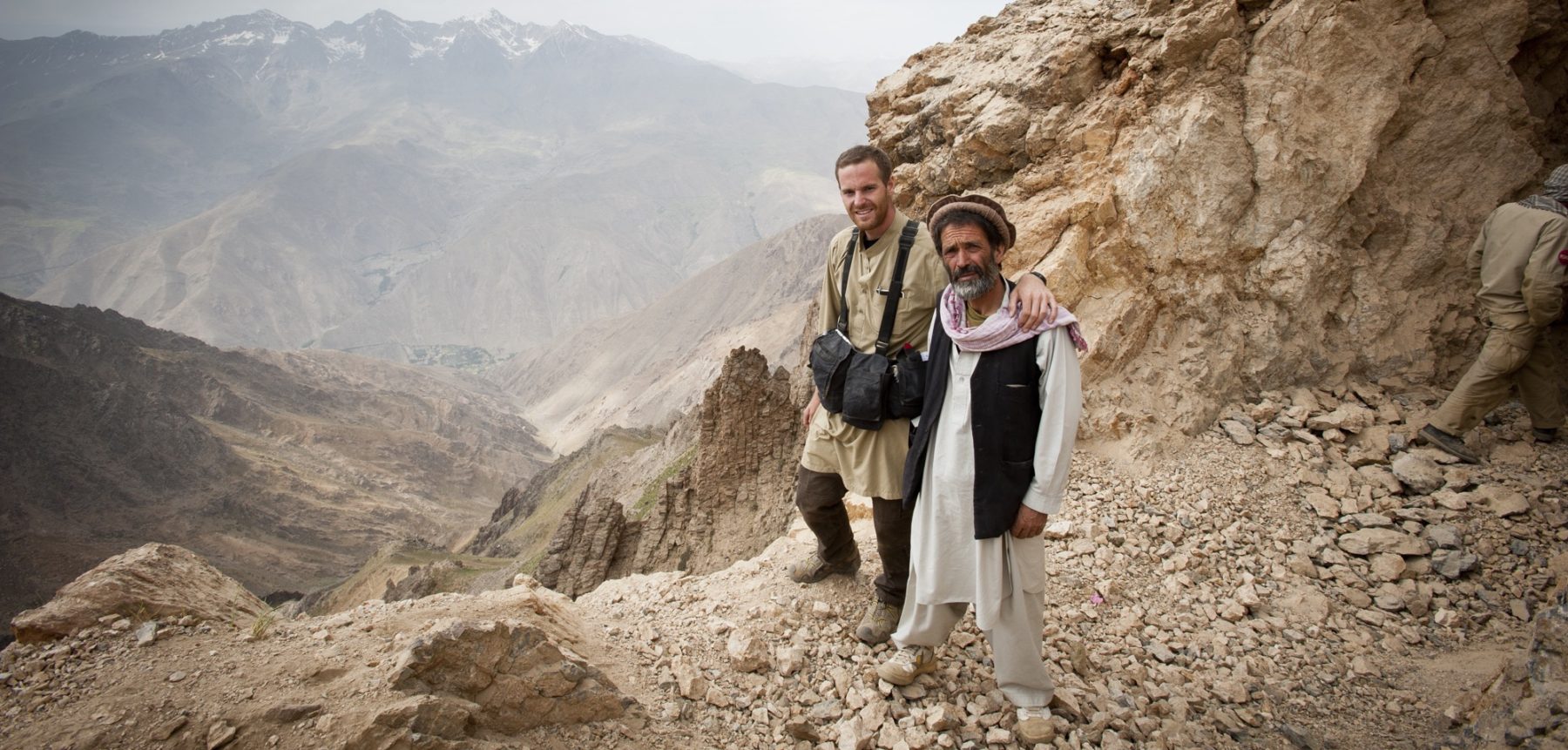
Elliott Woods is a Montana-based veteran and multimedia journalist who has reported for publications including Outside, The Wall Street Journal, The New York Times, and many more. His most recent project is a podcast called Third Squad, which tells the powerful story of “one journalist, 12 Marines and two decades of war.” Back in 2011, Elliott was an embedded journalist with a group of Marines who were positioned deep in one of Afghanistan’s most dangerous regions. Nearly a decade later, Elliott embarked on a cross-country road trip to reunite with the surviving members of the team and discuss how that violent deployment impacted their lives. Third Squad tells the stories of these Marines, offering raw insights into the impact of war on individual soldiers, both on the battlefield and back at home.
Elliott was born and raised on the east coast, and as a kid, he never had strong ambitions to join the military. However, after an unsuccessful stint in college left him lacking purpose and low on options, he decided to join the National Guard. Elliott was eventually deployed to Iraq, where he served for a year as an Army combat engineer. When Elliott had finished serving and returned to college at the University of Virginia, he approached his education with a new focus and purpose, and it was there that he discovered writing and journalism. As a journalist, Elliott has traveled everywhere from war-torn regions of the globe to well-known conflicts in the American West– from the Gaza Strip to the front lines of the Keystone XL Pipeline protests. Whether reporting on public lands, outdoor adventure, or war, Elliott brings focus and intensity to all of his projects.
Elliott and I met years ago, so it was great to reconnect and have an in-depth conversation about his life and career. We started out by discussing his upbringing in Maryland and Pennsylvania, and how he developed a love of the outdoors at an early age. We discuss his education, his failed first attempt at college, and his path to the military. We discuss his time in Iraq, his career as a journalist, and the origins of the Third Squad podcast. We talk about the current state of journalism, and Elliott discusses why he feels the need to cover stories that involve dangerous people and places. We talk about hero culture, the importance of having a purpose, how the natural world has been a healing force in his life, and Elliott offers up some excellent book recommendations.
I encourage all of you to check out Third Squad, as well as Elliott’s 2016 TED Talk that I reference in the conversation. There are links to everything in the episode notes. Thanks to Elliott for all of his hard work and for joining me for such an important conversation. Enjoy.
Photos courtesy of Elliott Woods.
—
Download on Apple Podcasts
—
Download on Spotify
—
Download on Google Podcasts
—
Download on Overcast
—
EPISODE NOTES
Topics Discussed:
- 4:00 – Elliott’s childhood and how he got into the military
- 12:00 – Elliott discusses what it was like having joined the military weeks before 9/11/2001
- 15:00 – Elliott talks about reintegrating to normal life as a student after his deployment in Iraq
- 22:30 – Elliott discusses the importance of having a mission in his life
- 29:00 – Elliott talks about why he disagrees with “hero culture” in the US
- 34:30 – Elliott talks about his mentality when writing about powerful or dangerous people
- 43:00 – Elliott talks about “solution journalism” and the need to highlight problems in journalism
- 53:45 – Elliott discusses the impact Montana and nature has had on him
- 58:15 – Elliott’s book recommendations
- 1:04:00 – Elliott’s parting words of wisdom
Information Referenced:
- Elliott’s podcast: Third Squad
- Elliott’s TED talk: Finding Fulfilment in the Aftermath of War
- Gaithersburg, MD
- Bethesda Naval Hospital
- Lewisburg, PA
- Susquehanna River
- Georgetown Prep
- Valley Forge Military Academy
- Fordham University
- Fort Leonard Wood
- Virginia Commonwealth University
- Saddam Hussein
- Mosul, Iraq
- University of Virginia
- Virginia Quarterly Review
- Mad Libs
- Greg Gianforte
- Sebastian Junger
- Existentialism
- Miguel de Cervantes Saavedra
- Absaroka-Beartooth Wilderness
- Livingston, MT
- Wilson Rawls
- Gary Paulsen
- Kurt Vonnegut
- Svetlana Alexievich
- Tim O’Brien
- Abe Streep
Enjoy this episode? Then you might like these too:
- Jason Gardner – A Life of Purpose & Service
- John Branch – Seeking the Extraordinary in the Ordinary
- Antonia Malchik – Exploring Culture & Complexity
- Ryan Busse – Standing His Ground
- George Hodgin – Mission-Driven Entrepreneur
- Hal Herring – A Man of Words & Wild Places
- Heather Hansman, Part 2 – The Fascinating Story of Skiing’s Past, Present, & Future
